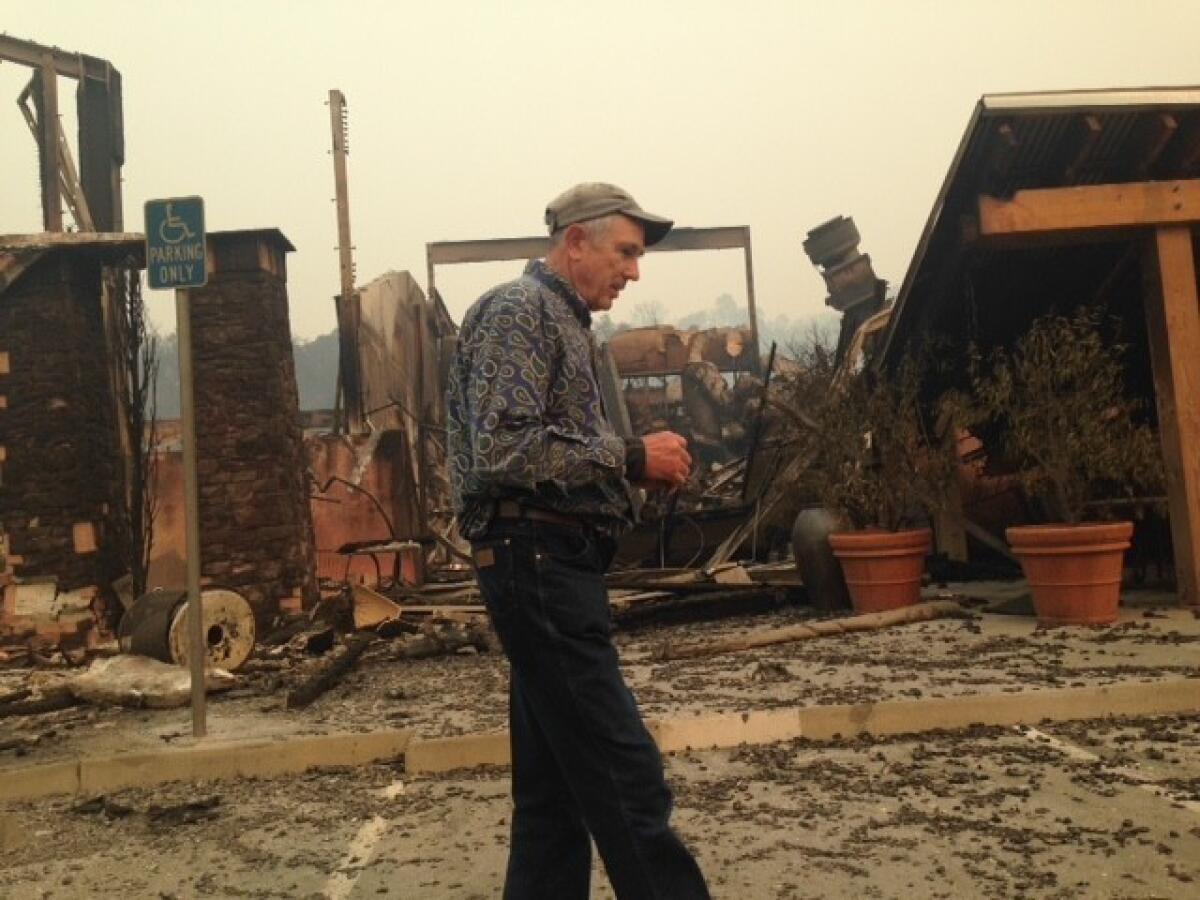CHP investigates fatal water truck accident
Cal Fire incident commander Bret Gouvea said the California Highway Patrol is investigating the death of a worker who was killed in a single-vehicle crash in Napa County early Monday.
The victim worked for a private company under contract to supply water to the firefighters, Gouvea said.
An earlier Cal Fire statement said the driver of a water tender truck died in a rollover crash on Oakville Grade.
“He was helping to fight the fires and do the right thing,” said CHP Capt. Mike Palacio. “Unfortunately, at this point, we don’t know what happened.”
Palacio said it would likely take a while before investigators determined the cause of the accident.
“It will probably take weeks, sometimes longer, to figure out how that happened,” he said.
Firefighters make significant progress Monday, but face challenges in Oakmont
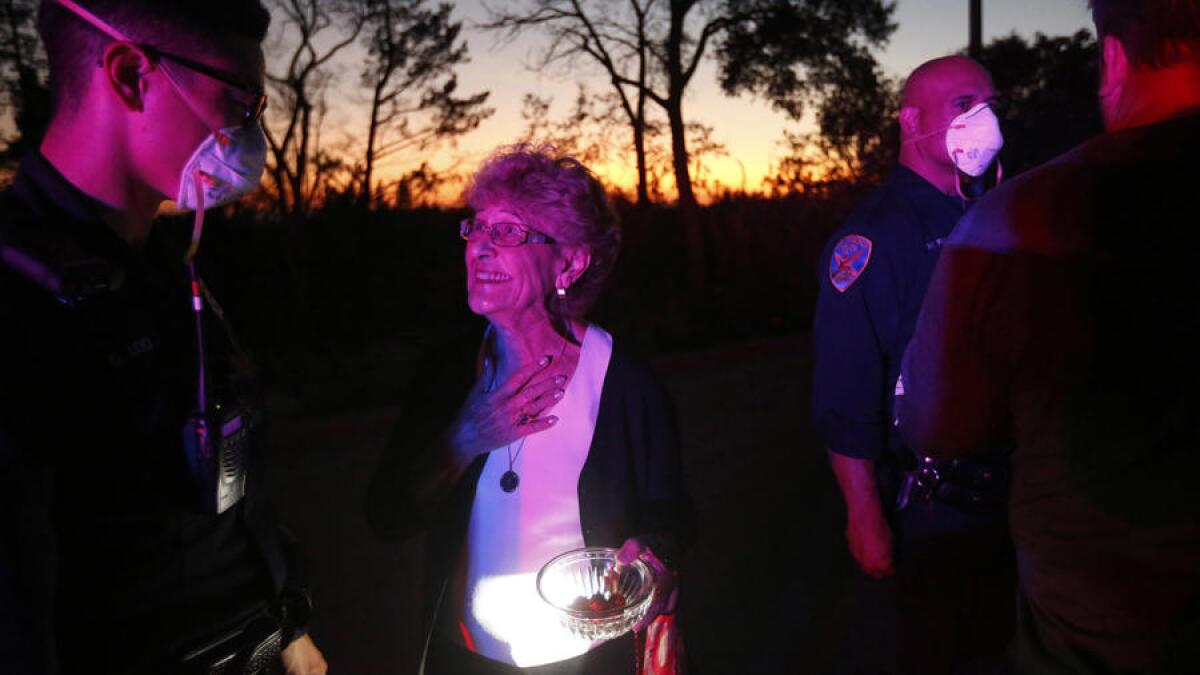
Firefighters made another night of steady progress against the wildfires burning in California’s wine country, gaining containment on four fires as temperatures dropped and winds died down.
More than 4,000 firefighters from across California worked to contain the fires. As of Monday morning, the 36,390-acre Tubbs fire was 70% contained; the 51,064-acre Atlas fire was 68% contained; and the 11,889-acre Pocket fire was 40% contained.
In the last week, the fires have scorched more than 200,000 acres, destroyed or damaged more than 5,500 homes, displaced 100,000 people and killed at least 41.
The Nuns fire claimed its first identified victim Monday morning, Cal Fire said. A private contract driver was delivering a tank full of water to help fight the Nuns fire when the large vehicle rolled over on Oakville Grade in Napa County around 7 a.m. Monday, killing the driver, according to Cal Fire and California Highway Patrol officials.
“This has been the deadliest week that we’ve experienced here in California… from wildfires,” Cal Fire spokesman Daniel Berlant said Monday.
Taken separately, the Tubbs fire ranks third on the state’s list of deadliest fires, claiming at least 22 lives, and the Redwood fire, responsible for eight deaths, ranks 10th on the list.
Firefighters were looking forward to light winds Monday, but high morning temperatures combined with low humidity could be a challenge for those battling the flames, Berlant said.
Crews gained more of a toehold against the 48,627-acre Nuns fire, which was 50% contained. But a smaller blaze next to the Nuns fire that ignited Saturday near the Oakmont neighborhood of Santa Rosa continued to cause trouble.
Overnight, the 875-acre blaze jumped over bulldozed fire breaks, and merged with a corner of the Nuns fire burning near Sugarloaf Ridge State Park, Cal Fire officials told firefighters at a morning briefing at the Sonoma County Fairgrounds. The fire, called the Oakmont branch, was 15% contained.
“We’ve got ahold of this horse, but it’s bucking us still in some areas,” incident commander Bret Gouvea said.
Some residents in the Oakmont area had not left their homes, Santa Rosa fire chief Tony Gossner said. Local law enforcement will be knocking on doors in an effort to change that.
“We’re going to do our best to get people out who don’t want to come out,” Gossner said.
The area where the Oakmont branch is burning is relatively sparsely populated, but if the fire moves west, it could threaten more than 2,000 homes west of Los Alamos Road, Gossner said.
At Napa vineyards untouched by wildfires, the grapes must still be picked
Mario Maldonado didn’t wear a mask. The 22-year-old field laborer thought it would slow him down. Besides, he doesn’t like to cover his face when he tends to the vineyards on most nights.
But this Napa Valley harvest was different than most. A muddied pinkish glow emanated from the horizon. A haze hovered in the air and through the vines. A motor hummed from a generator that powered brilliant lights mounted on tractors idling behind the pickers. It illuminated the harvesters’ path and accentuated the fine ash and the dust swirling along with some moths.
After losing their home in Coffey Park, this family helped with fire relief efforts
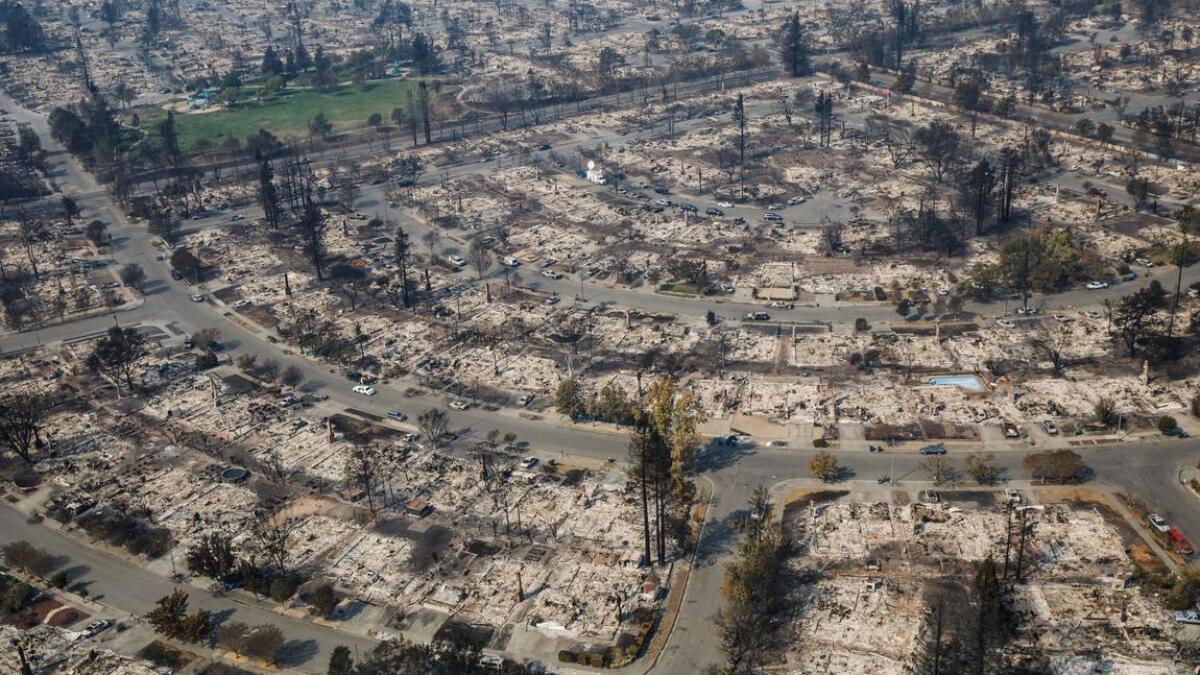
Daniel Crowell and his 9-year-old daughter Iris loaded vehicles headed to Sonoma County at a collection center in San Francisco on Saturday.
Then they got a rental van and filled it to the ceiling with donated boxes of toiletries, gallons of water and other supplies to take to people in Santa Rosa.
“I felt helpless, and it felt like the best thing to do when you feel helpless is to help others,” said Crowell, 43.
The Crowells’ home in Coffey Park burned down last week. They spent a few days in shock, grieving its loss, but eventually sought a distraction.
“We have friends and family who have been supporting us and helping us, but I know there are people who don’t have that, and I felt like I needed to do something just to kind of help make sure people get through this,” said Crowell, who works at a school in Santa Rosa.
Crowell said his daughter was excited to help. He woke up to the smell of smoke on Sunday night and rushed out of the house with his daughter and 6-year-old son as their front lawn began to catch fire. “I knew right then, this is it -- it’s gone,” he said.
He said the family visited a Santa Rosa home owned by a friend on Sunday. They’ll be moving in next weekend, he said.
“It’s smaller than what we’re used to, but at the same time we don’t have any possessions, so I think it’ll probably work out pretty good,” said Crowell, laughing.
He visited their Coffey Park home on Tuesday. All that was left were his car and ashes, along with two metallic folding chairs that peeked out of the rubble.
Their new home is two miles away, and only three blocks from Iris’ school.
“That’ll be good for her, she’s always wanted to ride her bike to school,” he said.
Clear Lake neighborhood lost 158 homes to Sulphur fire
At least 158 homes have been destroyed in the area around Clear Lake in Lake County, according to the Lake County Sheriff’s Office.
Clearlake Park, a residential neighborhood on the lake’s eastern shore, was one of the hardest hit areas, said Chris Chwialkowski, a captain with the Sheriff’s Office.
As the fires raged Monday morning, some residents had to be picked up off their docks by boat patrols, he said.
The neighborhood was in the path of the Sulphur fire, which is now 70% contained. The fire has burned at least 2,207 acres, according to Cal Fire.
After the devastation, Santa Rosa churchgoers pray together
425 homes destroyed by Mendocino County fires
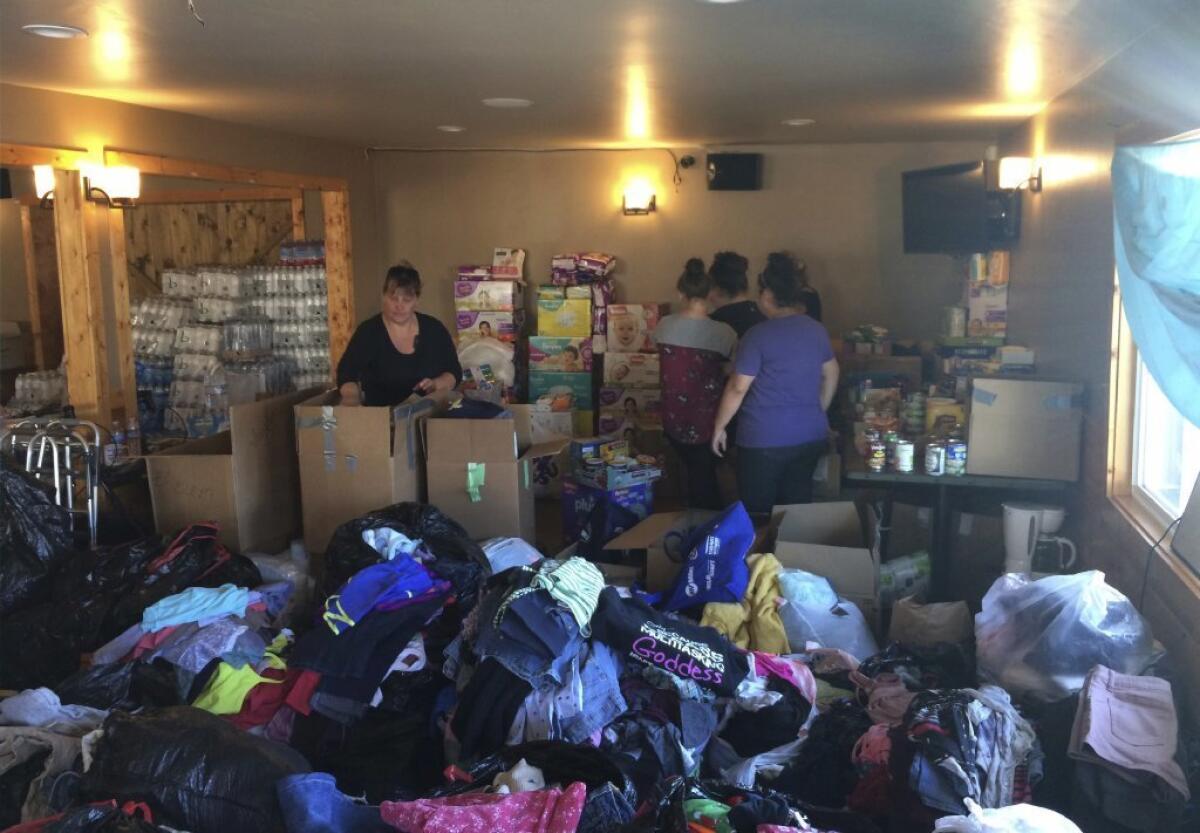
The Redwood Valley and Sulphur fires burning in Mendocino County have destroyed at least 425 homes, according to the Mendocino County Sheriff’s Department. At least four commercial structures have been destroyed.
As of Sunday morning, the combined fires have burned more than 37,207 acres. The fires are 37% contained.
Some neighborhoods in Redwood Valley, Willits and Potter Valley are being repopulated at noon, according to the department. A list of the areas is available on the department’s Facebook page.
38 people confirmed dead in Northern California fires
Officials confirmed Saturday that 38 people in four counties had died as a result of the fires in Northern California in the last week.
Twenty people died in Sonoma County
Eight people died in Mendocino County
Six people died in Napa County
Four people died in Yuba County
Sonoma County Sheriff Rob Giordano announced his county’s latest figures at a news conference Saturday afternoon, and the California Department of Forestry and Fire Protection confirmed the other three counties’ death tolls.
Officials in Sonoma, Mendocino and Napa counties have released the names of more than 15 of the victims, including Charles and Sara Rippey of Napa. The elderly couple -- he was 100, she was 98 -- died when fire overwhelmed their home in Napa.
For many immigrants fleeing wildfires and smoke-filled air, shelter is the beach
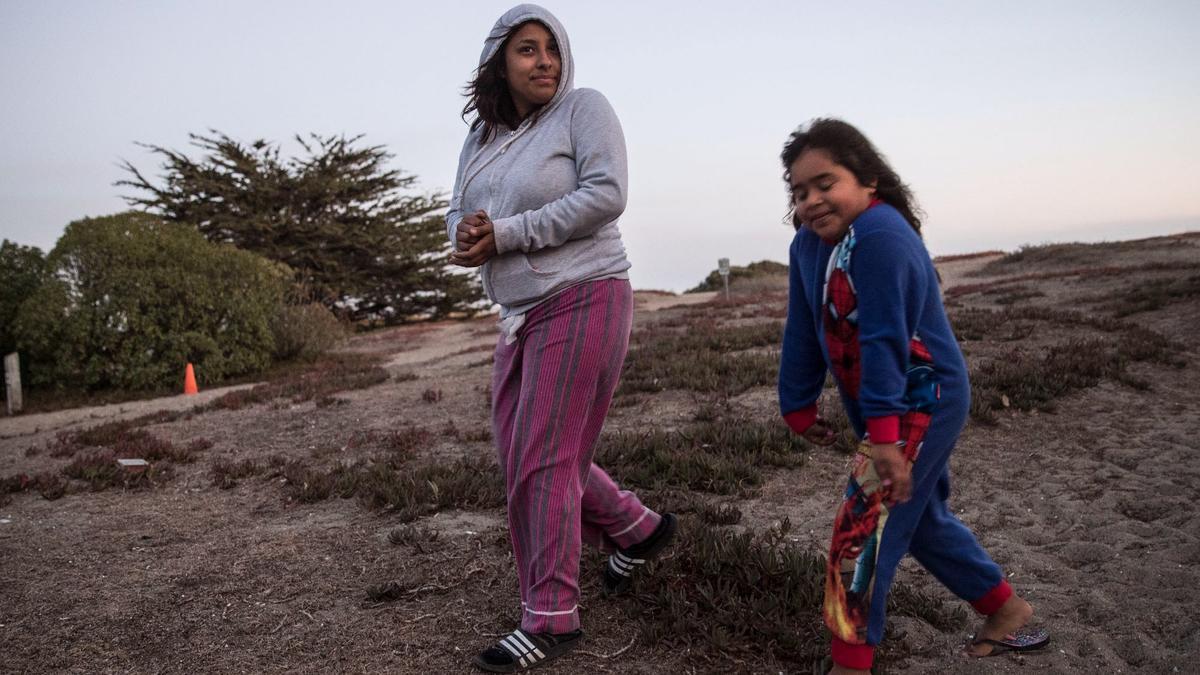
Patty Ginochio saw the long line of headlights arriving in the early-morning gloom.
When day broke, four hours later, the beaches of the coastal town of Bodega Bay, straddling Highway 1, teemed with refugees fleeing the wildfires that had destroyed thousands of homes and killed dozens of people.
Many of the arrivals were immigrants, who huddled together and spoke their worries in Spanish.
Some parked into turnouts and slept in their vehicles. Others hunkered down on the cold asphalt, bundled up in blankets. Ginochio opened up her restaurant, Ginochio’s Kitchen, and served free meals to an estimated 300 people.
An assemblyman and a dentist, he’s helping identify Northern California bodies
There’s often little politicians can do when wildfires strike, besides comfort the residents who lost their homes and monitor emergency efforts to make sure they’re getting the help they need.
California Assemblyman Jim Wood has another job.
“Most of my work is in the morgue at this point,” he said.
A Democrat from Healdsburg, Wood is also a dentist who is helping law enforcement identify victims of the deadly fires in Northern California.
“These are my constituents,” he said.
Wood represents an enormous, mostly rural district stretching from Santa Rosa to the Oregon border in the north. There aren’t many people in the country with his skills and experience. So when the latest fires started, he said, “I knew at some point I would be called.”
It’s the kind of work he has done with sheriff’s offices for years. Right now, he’s working to identify bodies in Sonoma County, where there have been at least 19 deaths related to the Tubbs fire. He’ll likely help Mendocino, too, where at least eight people have died.
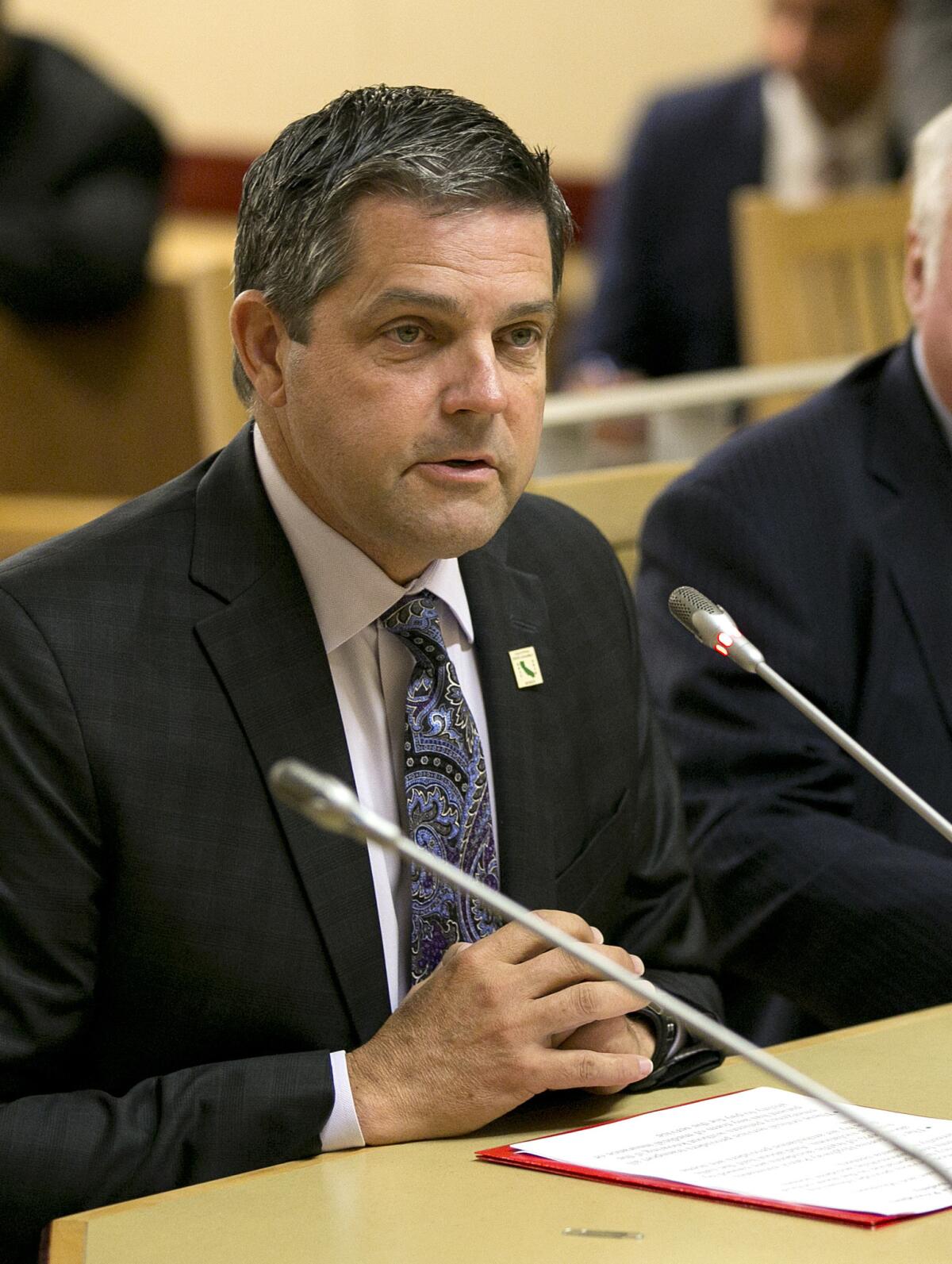
Sometimes bodies are recovered mostly intact. Other times, there are only bone fragments.
It’s slow work, and getting the right dental records to identify the remains can be difficult.
“It’s a process that will take awhile,” Wood said.
At a time when distraught families are desperate for information about missing loved ones, Wood said he is grateful there’s something he can do to help bring a sense of conclusion.
“There’s times we’re all standing around wondering what to do,” he said. The dental work, Wood said, “gives me a sense of purpose.”
Despite red flag conditions, Napa officials are optimistic about the Atlas fire
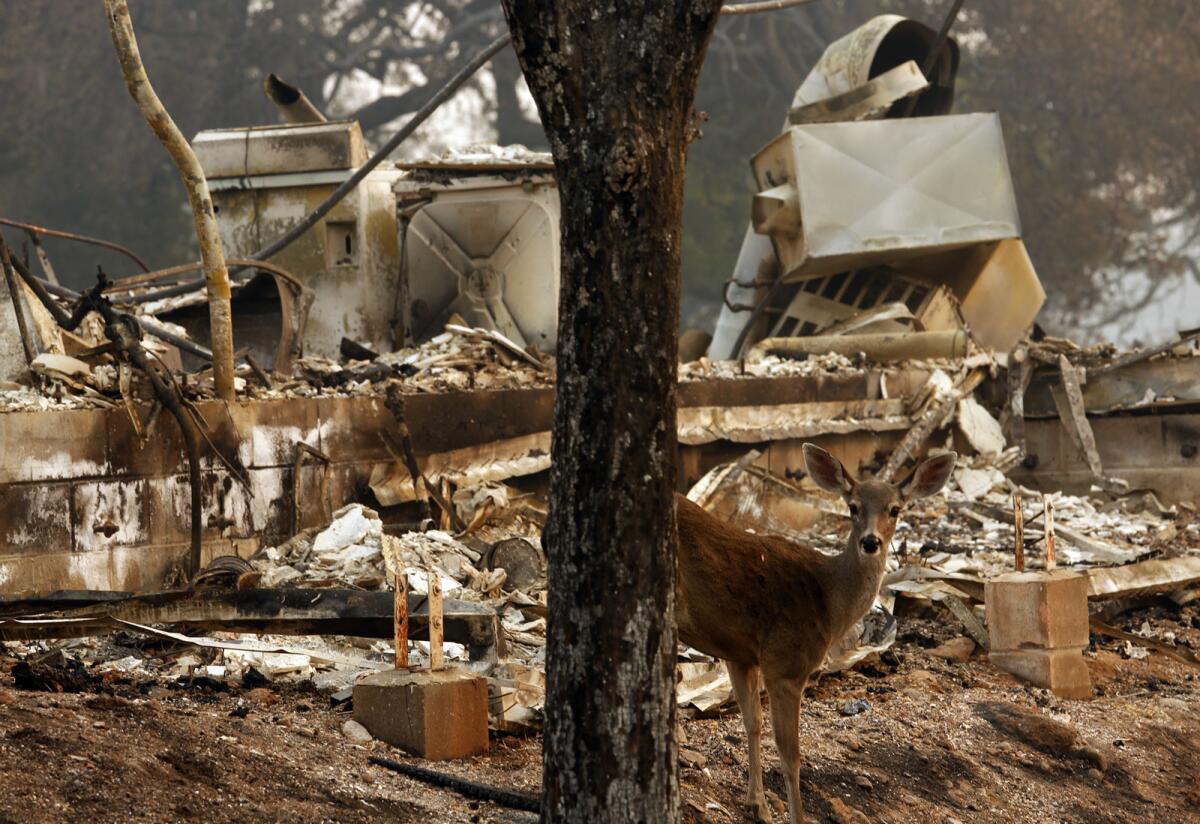
One of the wettest winters on record, followed by the hottest summer on record, has created possibly the worst potential for fire in Napa County that the state has seen, authorities said Saturday.
Already entrenched in a weeklong battle against a series of fires scorching wine country that have killed dozens, the potential for more running flames remains, said California Department of Forestry and Fire Protection spokesman Mike Smith.
Experts use a scientific formula to determine the potential of a fire, called its energy release component, Smith said.
On Saturday, that potential is the worst “in recorded history,” Smith said.
Crews have not seen this amount of fuel this dry in the path of a fire in at least 26 years, he said.
“Today is going to be a much different day than you’ve experienced unless you were here” for the beginning, Tom Wright of the National Weather Service told fire crews at a Saturday morning briefing in Napa. “It’s a really critical day.”
But Napa County officials expressed some optimism at a Saturday morning news conference just an hour and a half later, saying they were confident that the Atlas fires would remain under control. Around 9 a.m., as supervisor Belia Ramos spoke, winds were light and no new evacuations were expected.
Outside of a troublesome 22- to 30-acre spot fire on the northern face of the Atlas fire, the blaze has stayed mostly within its current footprint, Napa County Fire Chief Barry Biermann said.
Recognizing the eagerness of residents to return to their homes, authorities on Saturday pleaded for patience.
No one was going to be allowed into the evacuation areas Saturday, officials said, because Caltrans was spending the day trying to restore the roads.
The National Guard has been called in to help the California Highway Patrol block the roads, as Caltrans crews in the hills clear rocks, mud, burned trees, fallen branches and downed power lines, CHP Capt. Chris Childs said.
Locals have been urged to avoid trying to help the cleanup. The county public health director declared a local emergency to order to bring in more resources to remove toxic ash and burnt remnants of homes and cars.
Of 224 people unaccounted for in Napa County, 146 have been found safe, four have been identified as dead and 74 remain missing, county spokeswoman Molly Rattigan said.
Downed power ignites flames In Sonoma County: ‘It’s still very volatile.’
During a night of strong winds, the 46,000-acre Nuns fire in Sonoma County grew by at least 300 acres, threatening the outskirts of the city of Sonoma and the Oakmont neighborhood in Santa Rosa.
Early Saturday morning, a small fire that began when a downed power line ignited a tree branch rapidly grew into a 300-acre blaze on the southwest corner of the Nuns fire, east of Highway 12, Cal Fire officials told firefighters at a morning briefing.
“That’s what a little wind can do,” Cal Fire spokesman Scott McLean said in an interview. “It’s still very volatile.”
Officials issued new evacuation orders before 5 a.m. Saturday for a handful of homes on the northeastern edge of the city of Sonoma at risk from the Nuns fire.
The fire also grew to the north, reaching toward Oakmont and into Annadel State Park, McLean said Saturday morning. Evacuation orders are now in place for homes north and south of Highway 12 in that area.
A new 100-acre fire also erupted in Lake County, now called the Long fire.
Crews continued to gain ground against the 35,270-acre Tubbs fire, which is now 44% contained. The nearly 11,000-acre Pocket fire, just east of Geyserville, is 5% contained.
Firefighters will continue to face gusts of up to 40 mph until 11 a.m. Saturday along ridge lines where the Nuns fire and the Pocket fire are active, Cal Fire meteorologist Jimmy Tager said. Then winds will begin to die down to about 5 mph, continuing into the evening.
Officials lifted mandatory evacuation orders for more than 26,000 people in Santa Rosa on Saturday night, though advisories are still in place.
‘They haven’t played politics’: Lt. Gov. Gavin Newsom pleased with federal aid
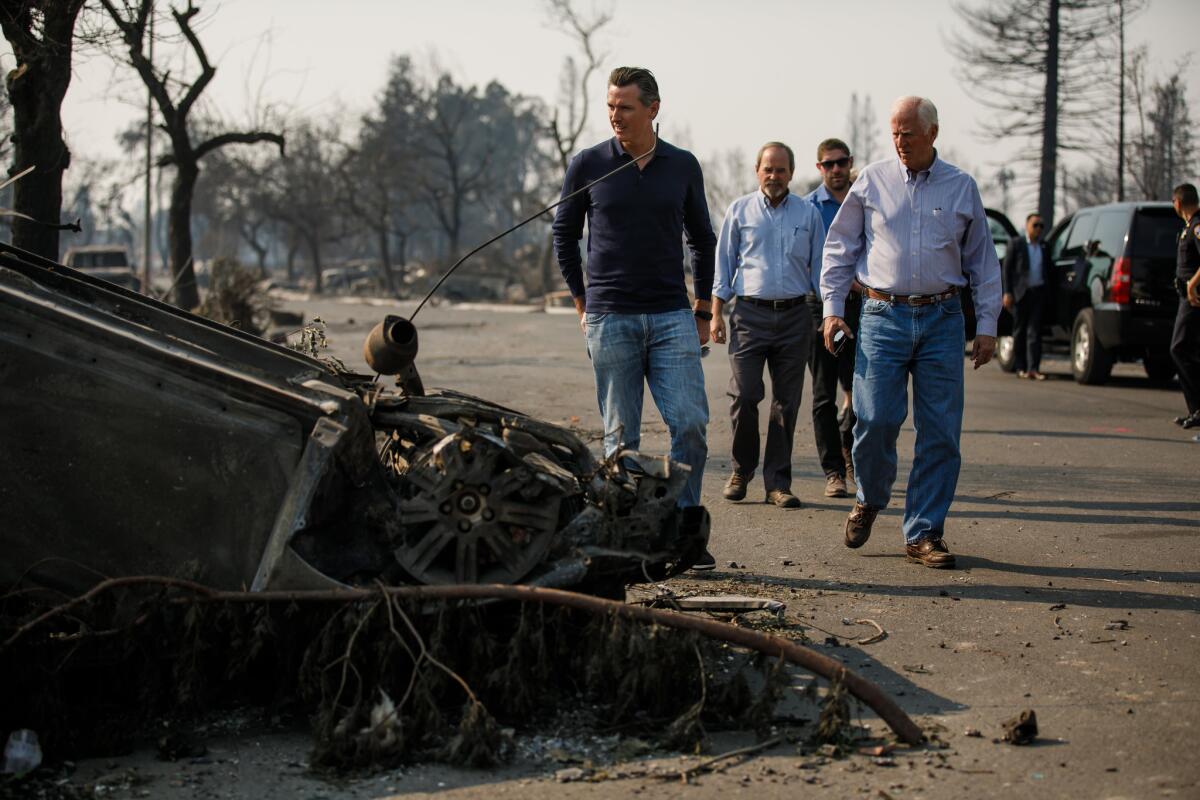
For all the sparring between California and President Trump, there was little concern from some of the state’s politicians about receiving federal assistance for the recent wildfires.
“They haven’t played politics,” Lt. Gov. Gavin Newsom said Friday while visiting some of Santa Rosa’s most devastated areas.
Rep. Mike Thompson (D-St. Helena) agreed.
“This has been extremely fast, what they’ve done,” he said.
Thompson was pleased with federal assistance for firefighting, as well as help for individuals who have lost their homes.
“It usually takes a long time,” he said.
Vice President Mike Pence said in a visit to California’s emergency management headquarters that President Trump has approved a “major disaster declaration” for California to assist with the response to the fires that have burned thousands of acres in Northern California.
The Federal Emergency Management Agency is conducting damage assessments, providing aid to local agencies and offering federal funding to residents affected by the fire, the agency announced Saturday.
‘Go! Go! Go!’: Deputy’s body camera captures frantic evacuation
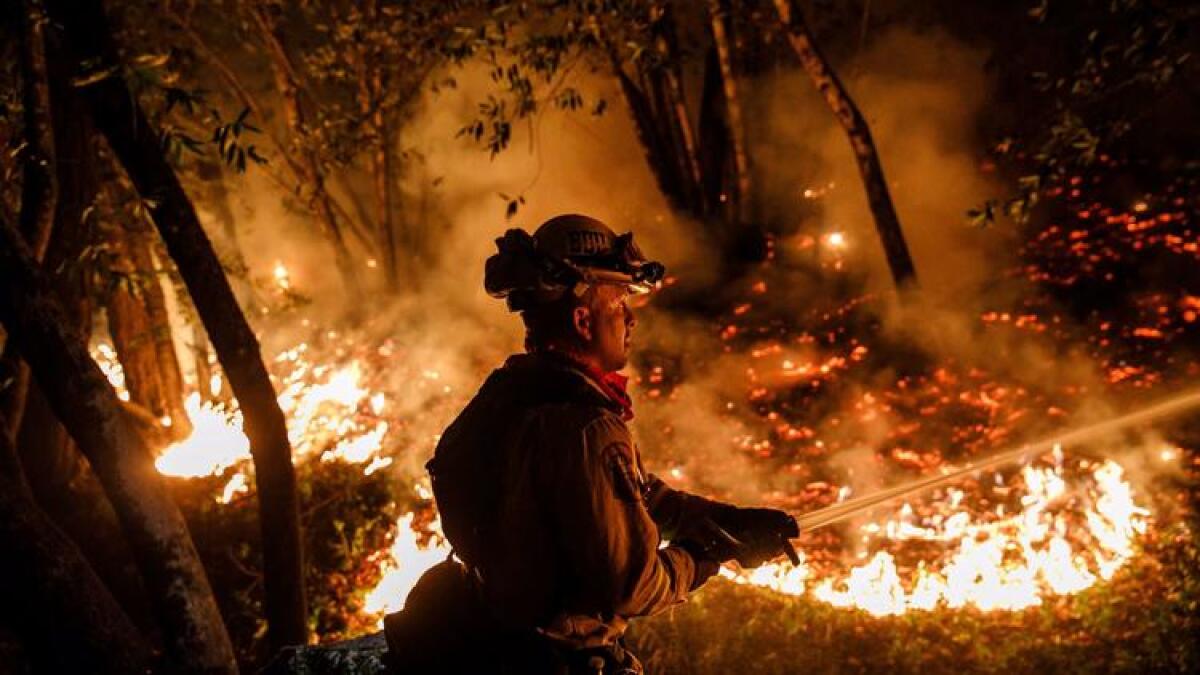
Body camera footage released by the Sonoma County Sheriff’s Office on Friday captured the frantic effort to evacuate Mark West Springs as fires raced toward the Santa Rosa neighborhood.
With heavy winds blowing and sparks flying, a sheriff’s deputy raced from house to house, pounding on doors and shouting, “Sheriff’s Office! Sheriff’s Office!”
As he drove down the mountain, his camera showed flames licking the side of the hill on the right side of the road and devouring a fence. Sparks showered the windshield, and the sky was an ominous orange.
“I’ve gotta get out of here,” he muttered, coughing. “We’re in a bad spot.”
Sonoma County Sheriff Rob Giordano said 16 deputies spent hours in the neighborhood, ushering people to safety. At one point, the deputy lifted a disabled woman into the back of his cruiser, with the help of a co-worker.
The body camera footage showed cars racing down a smoky street as a deputy shouts: “Go! Go! Go! Drive!”
Another deputy in the neighborhood got trapped by fire on the road as he tried to escort residents out of the neighborhood, Giordano said. The deputy huddled at the Mark West Lodge with 35 residents, waiting, as the fire burned around them.
“They were just lucky,” Giordano said.
Mendocino County fire evacuees seek refuge in Ukiah
Ukiah, the county seat of Mendocino County, is quickly becoming a place of refuge for those displaced by the deadly Redwood/Potter fires.
Employees at Ukiah Natural Foods Co-op make ham and turkey sandwiches every day for the volunteer fire fighters. Officials are running an evacuation center at the high school, while the fairgrounds are home to a growing number of tents and RVs.
“Wherever you go, there’s someone talking about how they had to be evacuated or lost their house,” said Lori Rosenberg, general manager at Ukiah Natural Foods Co-op.
Cassie Taaning-Trotter, 50, is staying with her mother in Ukiah after losing her own home in Redwood Valley, which is located about 10 miles north of Ukiah.
Taaning-Trotter said workers at a Ukiah sushi restaurant insisted on picking up her lunch tab and gave her a $50 gift certificate. “People are incredibly generous,” Taaning-Trotter said.
Magnus Kuhne Petersson, 34, his wife and 10-month-old baby fled their home in Redwood Valley and are housed at a friend’s residence in Ukiah.
He said he went to Mendo Baby, a Ukiah store to pick up some things, but the owner wouldn’t accept money for the baby clothes. The owner’s own house burned down, but she still insisted on giving away the items for free, he said.
“We’re very fortunate,” Kuhne Petersson said. “The community is very strong and supportive.”
Three fire victims identified in Mendocino County
Officials continued to identify victims of the fire Friday.
In Mendocino County, where at least eight people have died, officials identified three victims from the Redwood Valley: Kai Logan Shepherd, 14; Roy Howard Bowman, 87; and Irma Elsie Bowman, 88.
Kai, the 14-year-old, was found near his family’s house on the 11300 block of West Road. Authorities believe he was trying to escape the fire when he was “overtaken by flames,” according to a Mendocino County Sheriff’s Department statement.
The Bowmans, who were married, were found in their home on the 4000 block of Fisher Lake Drive. “The residence was completely destroyed by the fire,” according to the Mendocino County Sheriff’s Department statement.
The Redwood fire in Mendocino County has burned 34,000 acres and was 10% contained as of Friday. Between the Redwood fire and the 2,500-acre Sulphur fire, about 8,000 people have been evacuated, according to Cal Fire.
“Steep inaccessible terrain coupled with critical fuel moistures, and northwest winds will provide challenges for crews working on the fire,” a Cal Fire incident report read Thursday night.
The Northern California firestorm is straining hospitals and the healthcare system
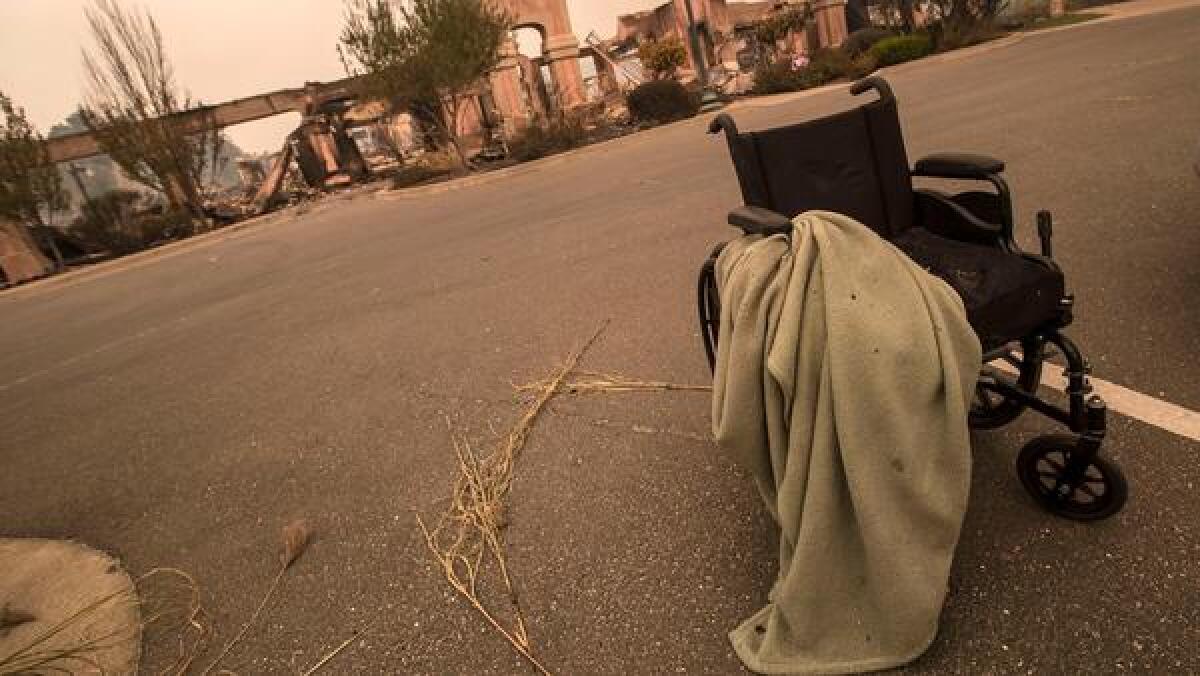
The deadly Northern California fires — by forcing the evacuation of several hospitals and clinics and destroying the homes of many doctors and nurses — have put a strain on available medical services.
The Petaluma Health Center canceled all scheduled appointments this week to make time for people requiring urgent care. The center has treated asthmatics struggling to breathe amid some of the most unhealthy air in Bay Area history, as well as people who sprained their ankles or forgot to grab their medications as they raced from burning homes in nearby Santa Rosa, clinic chief administrative officer Pedro Toledo said.
Echoing health providers across the region, Toledo said the situation has been especially stressful because the danger isn’t gone. The many fires devastating wine country are nowhere near containment, and the clinic could be threatened if the wind changes. This week, staff members made emergency supply kits for their cars.
“A major earthquake hits, and then it’s over. … We still have no sense of when this is going to end,” Toledo said. “This thing could get worse.”
Where are all the fires in Northern California?
ICE suspends activity in Northern California fire zones
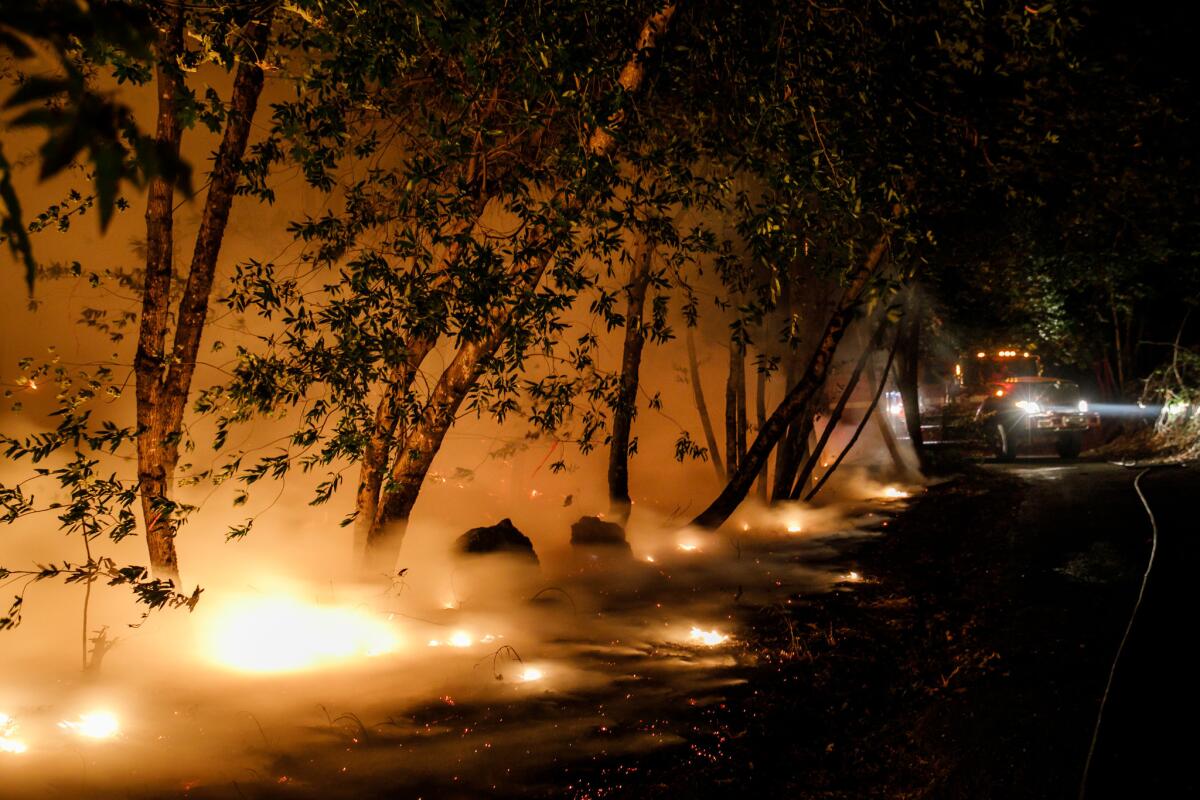
Immigration officials have suspended operations in the Northern California fire areas, authorities said Friday.
“The only time we’re going to pick someone up is in the event of a serious criminal presenting a current public safety threat,” U.S. Immigration and Customs Enforcement spokesman James Schwab said Friday.
He did not say how long the suspension would last.
Immigration enforcement will not detain anyone from evacuation sites, assistance shelters or food banks in the region, Schwab said.
Wildfire destroys home of ‘Peanuts’ creator Charles Schulz
The home of “Peanuts” creator Charles Schulz burned to the ground in the deadly California wildfires but his widow escaped, her stepson said Thursday.
Jean Schulz, 78, evacuated before flames engulfed her hillside home Monday and is staying with a daughter, Monte Schulz said.
The Schulzes built the California split-level home in the 1970s and the cartoonist lived there until his death in 2000.
“It’s the house he died in. All of their memorabilia and everything is all gone,” Monte Schulz said.
He said he had not heard from his stepmother and learned about the disaster from his brother, Craig Schulz, who also lost his Santa Rosa home in the fire.
“The fire came by at, like, two in the morning,” Monte Schulz said. “Everything’s gone.”
Fires in the Northern California wine country have killed at least 31 people since they began Sunday.
Monte Schulz said he had not visited his stepmother’s home in recent years because he lives more than 300 miles away in Santa Barbara. He wasn’t sure what might have burned.
“Obviously stuff from my dad and their life together, all gone,” he said.
Charles Schulz usually worked at an outside studio and most of his original artwork and memorabilia are at the Charles M. Schulz Museum and Research Center in Santa Rosa, which escaped the flames.
But the loss of the house itself is painful, Monte Schulz said.
“I had memories of being in that house. I never lived there but I visited all the time,” he said. “That time of our lives is now completely erased.”
Charles Schulz had long ties to Santa Rosa and to Sonoma County. He and his first wife, Joyce, built a home in the city of Sebastopol in 1958.
The airport in Santa Rosa is officially titled the Charles M. Schulz-Sonoma County Airport and features bronze sculptures of the Peanuts characters. Its logo is Snoopy flying on top of his doghouse.
The Tubbs fire is now one of the five deadliest in California history
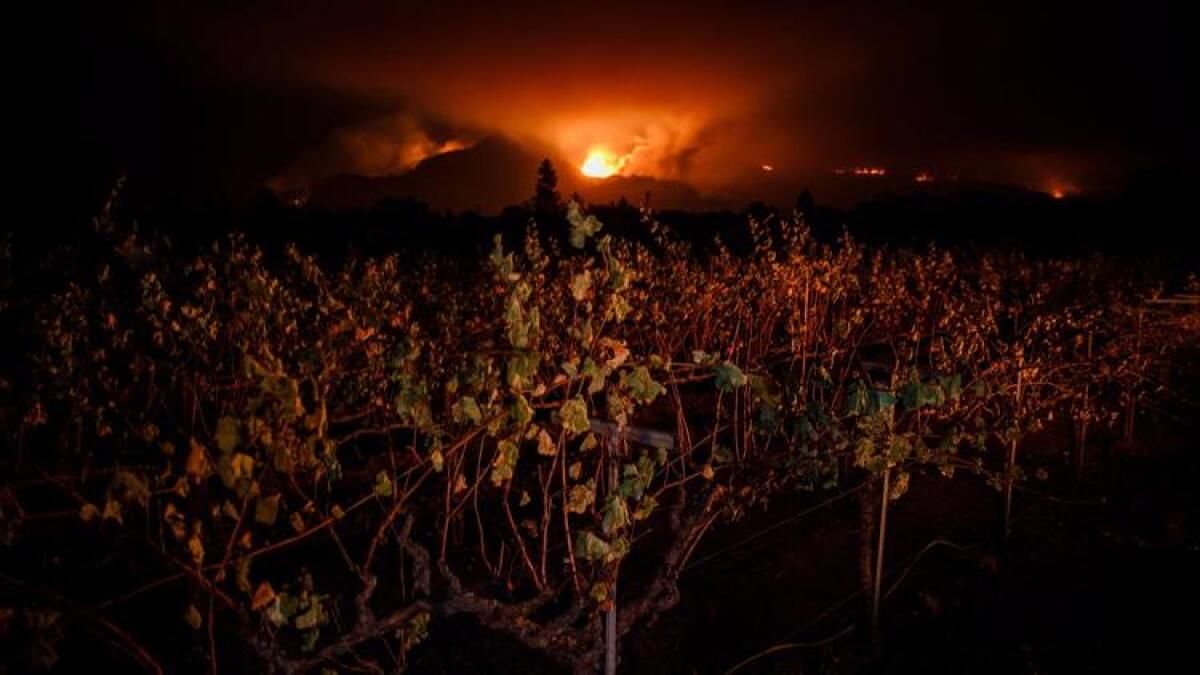
The death toll from the Tubbs fire in Napa and Sonoma counties rose to 15 late Thursday, making it one of the five deadliest wildfires in California history.
Two other wildfires, including the 2003 Cedar fire in San Diego, each claimed the lives of 15 people.
Here’s a look at the deadliest blazes in state history in addition to the Tubbs fire:
- The Griffith Park fire burned only 47 acres in October 1933, but took 29 lives.
- The Oakland Hills fire killed 25 people in October 1991. The fire burned 1,600 acres and destroyed 2,900 structures.
- The Cedar fire in San Diego scorched 273,246 acres in October 2003 and claimed the lives of 15 people.
- The Rattlesnake fire in Glenn County in July 1953 burned 1,340 acres and killed 15 people.
More people turn to homeless shelters for relief from smoky conditions outside
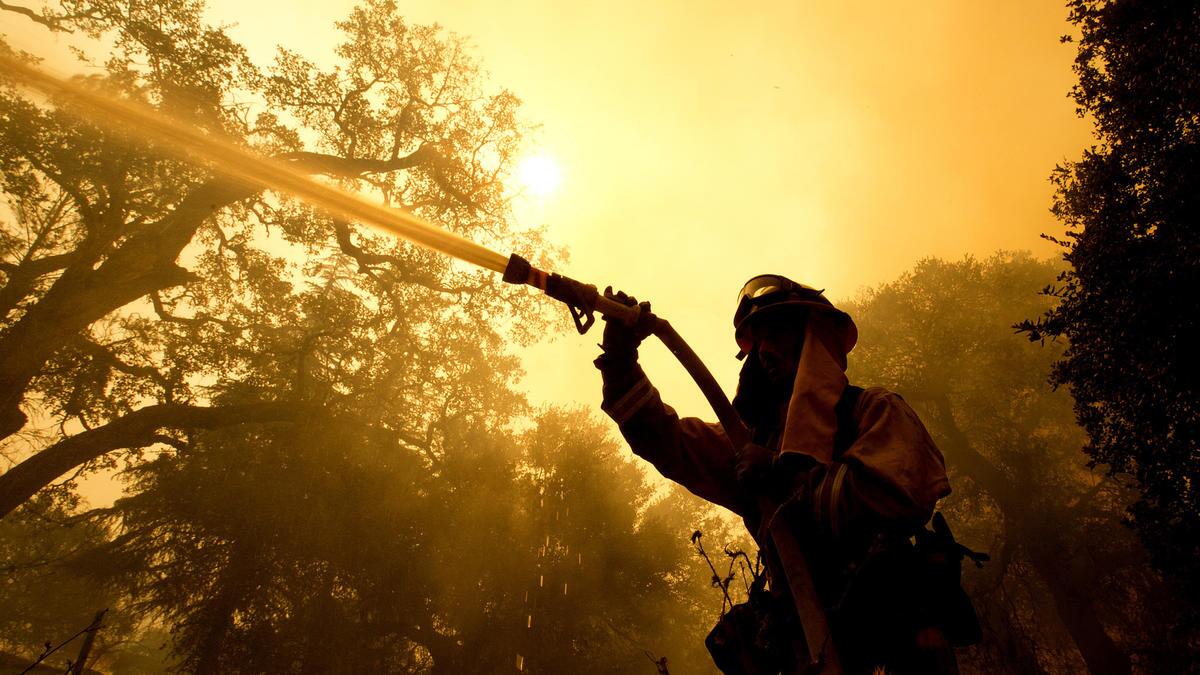
Homeless shelters in Napa are seeing more requests from individuals and families who live on the streets and want refuge from the smoky conditions.
Napa’s Hope Center saw about a 30% rise in clients this week, said Eric Medina, who works at a nonprofit that helps run the shelter.
“Some of them have respiratory issues or just general health problems. They just want to get away from the smoke,” Medina said.
Maricela Pelayo, a shelter coordinator at Samaritan Family Center, said she got a call this week from a homeless family who had been living in a tent in a Napa park. She directed them to another shelter because Samaritan Family Center is at capacity.
Pelayo said she has discussed the fires with families already staying at the center, but she said they were largely nonchalant about the blazes.
“These families are already in survival mode, so for them this is nothing new,” Pelayo said. “They already don’t have a home to go to.”
Scenes from the battle against the flames along Highway 29 north of Calistoga
Recovery crews begin search for bodies in wake of Sonoma County fires
Recovery crews in Sonoma County have begun the grim task of searching for bodies in the ashes of neighborhoods that were devastated by wildfires.
Sheriff Rob Giordano on Thursday announced the county’s 14th death (bringing the Northern California fires death toll up to 24) and said at a morning briefing that law enforcement is “moving into a recovery phase” in the aftermath of the Tubbs fire in the Santa Rosa area, which he called “an active disaster.”
The searches can take hours and identification will be difficult, Giordano said.
“So far in the recoveries we have found bodies that were almost completely intact and bodies that were nothing more than ash and bone,” he said.
Sometimes, he said, the only way to identify someone is through a medical device, such as a metal hip replacement, that has an ID number.
“We will do everything in our power to locate all the missing persons, and I promise you we will handle the remains with care and get them returned to their loved ones,” Giordano said.
Asked whether he expected the death toll to rise, Giordano said, “I’d be unrealistic if I didn’t.”
Giordano said law enforcement personnel are working through missing-persons reports, trying to reach people by phone, with alternate addresses or through family members. When that fails, he said, they conduct targeted searches of the homes of the missing.
As of Thursday morning, Sonoma County had received 900 missing-persons reports, and had found 437 people safe.
“We have teams of people who are going out searching for a very specific person ... to a very specific place. That’s how the majority of recoveries have been made so far,” Giordano said.
Starting Thursday, three search-and-rescue teams of mostly civilian volunteers from Alameda, Monterey, and Sonoma counties will be going out with cadaver dogs to some of the hardest-hit areas where it is “probable” that a missing person may be found, sheriff’s department officials said.
Sheriff’s Sgt. Shawn Murphy confirmed in an interview after the briefing that the department is sending teams to the Kenwood and Mark West Springs Road areas, but said searchers were not yet going to the Journey’s End mobile home park, which was almost completely razed and where at least one death has been reported.
Murphy said he does expect to conduct searches there eventually, once the teams have more information.
Winds may still stoke fires Thursday, Cal Fire says
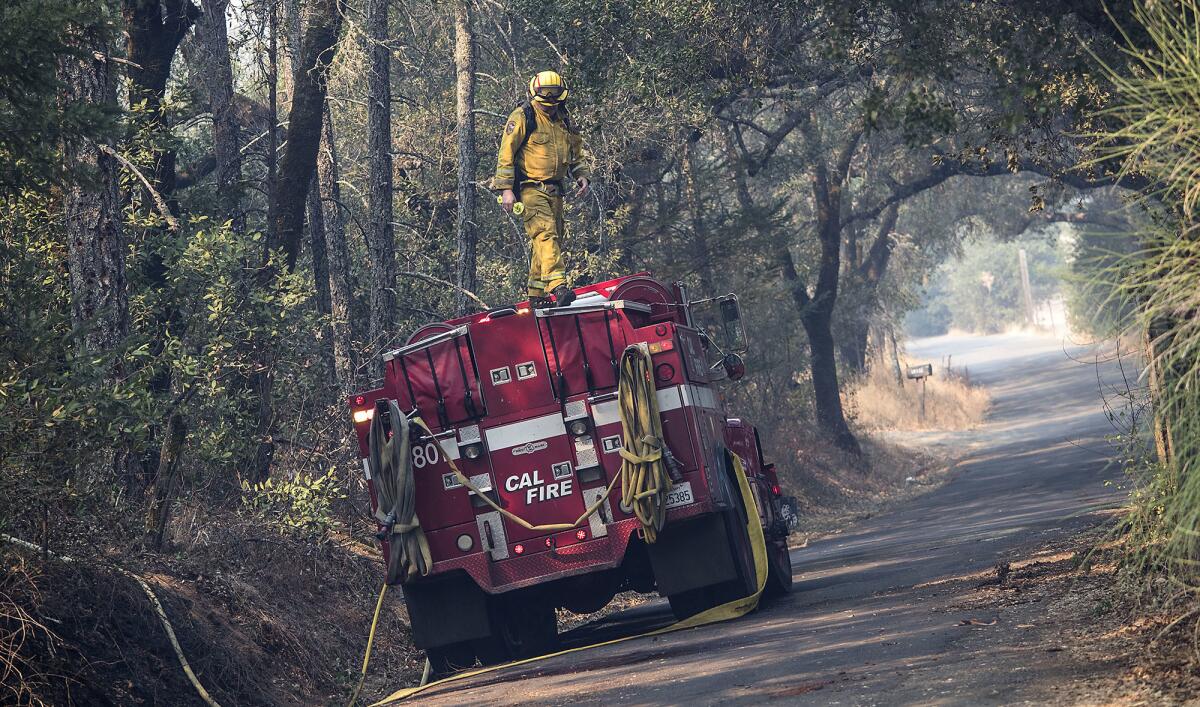
In Northern California, 17 fires have burned more than 180,000 acres and destroyed at least 3,500 homes.
Winds were not as strong as officials feared Wednesday night, but there’s still a risk that they could kick up and fan new fires, officials said Thursday.
Although the Tubbs fire spared an evacuated Calistoga on Wednesday night, the town is still an area of concern for officials, Williams said.
Winds on Thursday night may reach 10 to 20 mph and officials fear stronger seasonal winds over the weekend, Cal Fire spokeswoman Heather Williams said.
“The winds did calm down last night and they’re calm right now,” Williams said. “The red flag warnings are in effect until tonight, which means there are the potential for 10- to 20-mph winds.”
Red flag warnings were in place for Thursday night in large parts of the area affected by fires, including pockets of the Sacramento Valley, and parts of Napa County that include St. Helena and Yountville, Williams said.
The Mendocino Lake Complex, which includes the Redwood and Sulphur fires, reached 32,500 acres by Thursday, she said. The larger, 29,500-acre Redwood fire is 5% contained and the Sulphur fire is 40% contained, Williams said.
“They do have structures that have been destroyed, a couple hundred residential structures and nearly 100 outbuildings,” Williams said.
The area saw mandatory evacuations Monday night in Potter Valley.
The 43,000-acre Atlas fire, which began in Napa and moved into Solano County, has put the Green Valley area in some danger, she said. That area had mandatory evacuations earlier in the week.
Overall, there have been about 20,000 mandatory evacuations throughout Northern California. Officials estimate that 50,000 people, including those who evacuated voluntarily, actually left their homes because of the fires.
A ghost town in Calistoga
The town of Calistoga is empty.
Motorcycle cops wearing masks are circling the deserted streets. Everything is closed in the downtown area -- the art galleries, wine tasting rooms, cafes. The thick smoke hangs like fog. Roads leading into town are closed.
Ten miles away at Napa Valley College, a Red Cross shelter had only 35 people through Tuesday night.
Then early Wednesday morning, hundreds evacuated early when police knocked on their doors and woke them up, demanding they leave their homes. Napa Valley College swelled with evacuees.
There were 683 people in the shelter at one point, and 386 by the last count Thursday morning. The parking lot was filled with cars, and cots were laid out in the cafeteria and gymnasium.
On Thursday morning the air outside the shelter was smoky, and some volunteers were shuttling back and forth with masks.
Yury Kopansky, 66, a retired software engineer, said he only had five minutes to grab a few things and get dressed. He’s eager to go home. “I don’t think it was necessary,” he said about the evacuation.
David Sutidze, 55, evacuated with his mother-in-law. They had packed a bag two days before the evacuation, and were thinking about unpacking when police came by their house and told them to clear out.
Sutidze and his mother-in-law slept in their sedan with their two dogs, because dogs aren’t allowed in the shelter, he said. A neighbor remained behind and has been sending updates.
“He said everything is fine,” Sutidze said.
Neither snow nor rain nor wildfire’s devastation stops this U.S. Postal Service worker
Douglas Thron, an Oakland-based drone cinematographer, has photographed California wildfires and their aftermath for decades.
But even he was surprised when he captured a U.S. Postal Service truck driving through Santa Rosa’s Coffey Park neighborhood. The driver could be seen Tuesday dutifully opening mailboxes in front of destroyed homes.
At first, Thron thought the driver was just pulling over to take a cellphone photo.
“But then I got a little closer and saw he was delivering mail. He delivered to half a dozen houses or what used to be a house,” he said.
At one point, Thron said the postal worker, who wore a face mask, waved to him.
“It was surreal-looking,” Thron said of the scene in Coffey Park, one of the areas believed to be hardest hit by the Tubbs fire. “It looked like a nuclear bomb had gone off.”
Postal Service San Francisco District Manager Noemi Luna said in a statement that the work of the postal worker “is an example of the longstanding relationship that has been established between our carriers and their customers based on trust.”
Luna continued:
“The carrier in question was honoring a request by a few customers who were being let back in the fire zone to retrieve personal items. A few customers asked the carrier to leave their mail if the mailbox was still standing because they could not get to the annex to retrieve it.”
All evacuations lifted as firefighters work toward containment of Anaheim Hills blaze
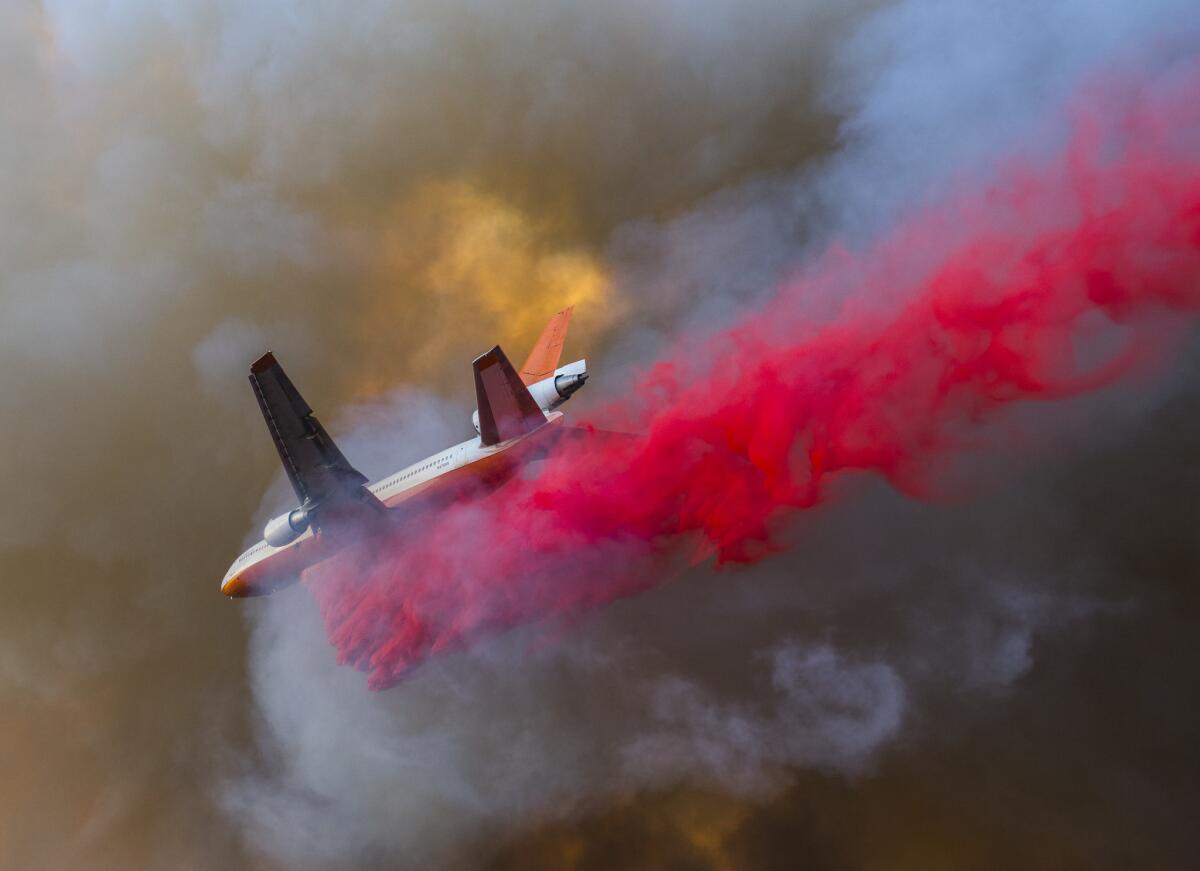
After burning 9,200 acres, Cal Fire reported that the Anaheim Hills fire was 60% contained as of Thursday morning.
All evacuation orders have been lifted. The fire destroyed 23 structures and damaged 36 others.
There still were some road closures Thursday morning: Santa Ana Canyon Road between Woodcrest and Gypsum Canyon roads, as well as parts of the 241 toll road.
‘It’s time to finish this thing,’ Santa Rosa fire chief says
Despite continuing red flag conditions, forecasts called for cooler daytime temperatures and relatively light winds Thursday. Fire authorities were predicting a generally productive day on the fire lines in and around the devastated resort communities of Sonoma and Napa counties’ wine country.
As of Thursday morning, the Tubbs fire had charred 34,200 acres and was 10% contained, Cal Fire spokesman Richard Cordova said.
“We need to hit this thing hard and get it done,” Santa Rosa Fire Chief Tom Gossner told hundreds of firefighters gathered at dawn in a barn at the Santa Rosa fairgrounds. “It’s time to finish this thing.”
There was more good news: Predicted winds never materialized last night in the vicinity of Calistoga, where mandatory evacuation orders had forced 5,000 residents from their homes Wednesday afternoon.
Throughout the region, major highways and country lanes were packed with Pacific Gas & Electric Co. trucks as the company aggressively worked to restore communications by repairing downed power lines and replacing destroyed telephone poles.
Overnight winds were milder than expected, keeping Atlas fire’s growth to a minimum
The 43,000-acre Atlas fire had only moderate growth overnight thanks in part to winds that were milder than expected Wednesday night. They pushed the fire mostly to the north and east, good news for Napa residents who were warned Wednesday afternoon to be prepared to leave the eastern sections of town closest to the fire.
The weaker winds also aided firefighters on the Partrick fire, but the danger of it pushing into Sonoma and Vineburg remained Thursday.
Firefighters were warned that critical “red flag” conditions remain, with strong winds, low humidity and “extremely receptive fuels,” according to Thursday morning’s Cal Fire incident management plan for the Atlas and neighboring fires.
Forecasted gusts of up to 40 mph are expected to ease Thursday afternoon, diminishing the risk of a runaway fire line.
The latest Cal Fire maps show some small containment lines and completed bulldozer breaks at key locations in the wine country fires.
The Atlas fire stretches from Lake Berryessa in the north to the southern flank of Napa, but a control line has been established across the bottom of Atlas Peak Road, near where firefighters first engaged the now-sprawling ridge fire Sunday night.
The goal is to keep the fire north of Jameson Canyon and east of Highway 29, the critical north/south road that bisects Napa and is a key evacuation route for the populous area.
Some fire engines and their crews continue to work 12-hour shifts.
‘Absolutely devastated’ daughter says her mother, 69, died in Santa Rosa firestorm
A 69-year-old woman was among the 23 people known dead in the firestorm that continues to rage across Northern California, her daughter confirmed on Facebook late Wednesday.
Linda Tunis’ remains were found at her home in Journey’s End Mobile Home Park in Santa Rosa, according to her daughter Jessica Tunis.
“I have been a mess, absolutely devastated,” Jessica Tunis wrote on Facebook. “Hug and kiss your loved ones extra hard tonight.”
Earlier, Jessica Tunis has used the social media platform to try to find her mother, asking users if they knew whether the park was evacuated before it burned down and posting a missing-person flyer.
The pair had last spoken early Monday.
Linda Tunis called her daughter from her burning home and said, “I’m going to die” before the phone went dead, the Associated Press reported.
“May she rest in peace, my sweet Momma,” Jessica Tunis wrote.
Evacuation shelters will not ask immigration status, Sonoma County sheriff says
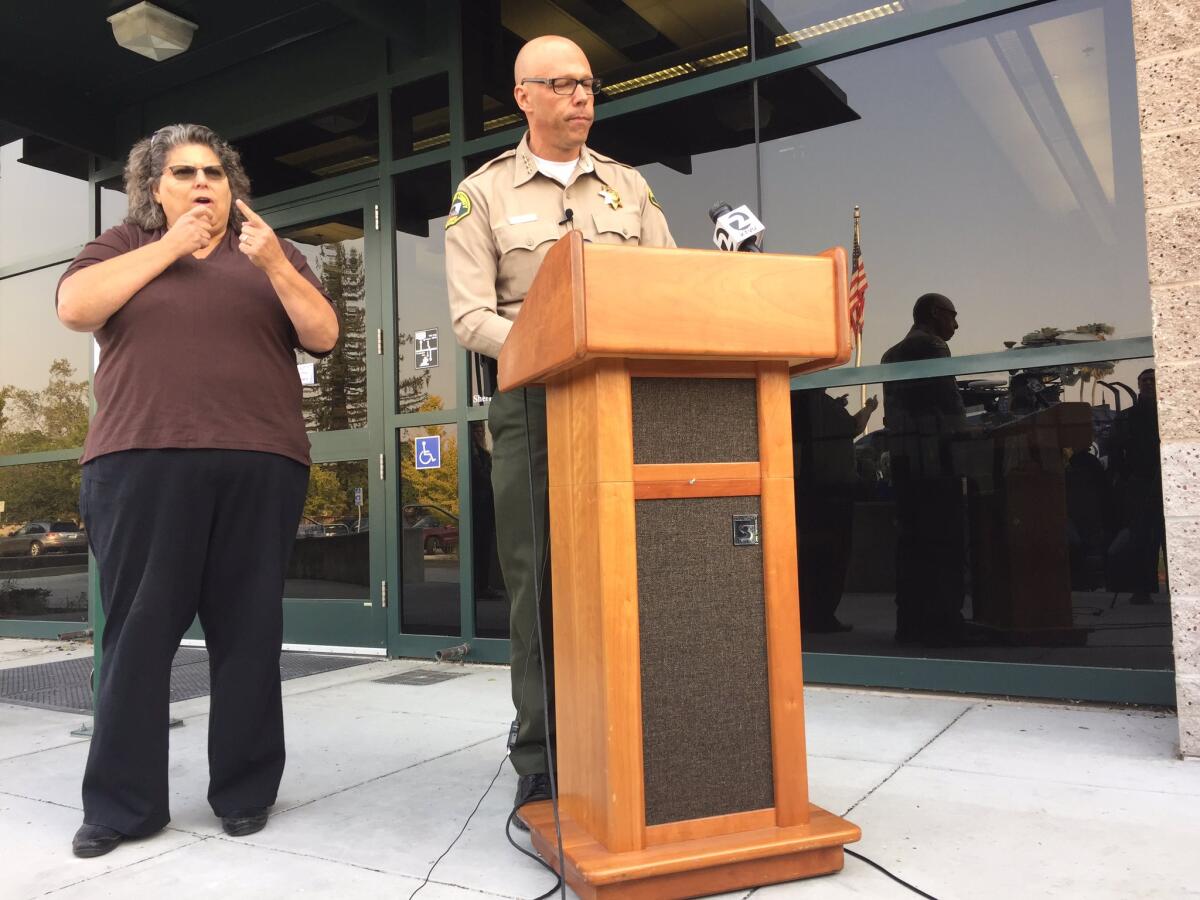
Shelters opened for fire evacuees in Sonoma County will not ask anyone’s immigration status, Sheriff Rob Giordano said Wednesday night.
“There’s a rumor out there that people are checking immigration status in shelters and that is not true,” he told reporters at a news briefing.
“Immigration status will never be asked of you.”
Red-flag warning issued as wildfires rage across Northern California
A red-flag warning took effect Wednesday evening in the Bay Area as more than a dozen wildfires continued to spread throughout the region.
Weather officials expect strong winds, with gusts as high as 50 mph. With dry fuels and low humidity, the fires have the potential to spread quickly, according to the National Weather Service.
The warning took effect at 5 p.m. in the North Bay hills and will take effect at 11 p.m. in the East Bay hills, Santa Cruz Mountains and the mountains in Monterey and San Benito counties.
“It’s a good heads-up to all the firefighters and emergency management that the conditions are going to be pretty bad in terms of the fire behaviors,” said Will Pi, a meteorologist with the National Weather Service. “We’re expecting the strongest winds to be tonight and tomorrow morning.”
The red-flag warning was issued through 5 p.m. Thursday.
“Outdoor burning is NOT recommended,” the service said on social media.
Armed with goggles, heavy gloves and a respirator, Calistoga man says, ‘I’m not leaving’
Calistoga resident Dennis DeVilbiss had his mind made up.
“I’m not leaving,” the former police officer and firefighter said.
Standing on the wooden front porch of his cul-de-sac home on the south end of the resort town as smoke wafted over nearby forests, the 60-year-old said: “Why should I? I’m in a good spot. I’m monitoring all the radio bands. I just put a sprinkler on my roof. Oh, and I’ve got goggles, heavy gloves and a respirator.”
His confidence befit the German translation of his last name: “Devil Biter.”
He paused, and added with a smile: “I’m not stupid. If it’s time to run, I’ll run like hell.”
His partner, DJ Marrs Smith, a former firefighter herself, was not so sure.
Wrapped in a bathrobe with bright leopard spots and wearing a face mask to filter out smoke, she said: “I’m not sure what I am going to do. My friends are begging me to leave.”
Cause of raging Northern California fires remains under investigation, officials say
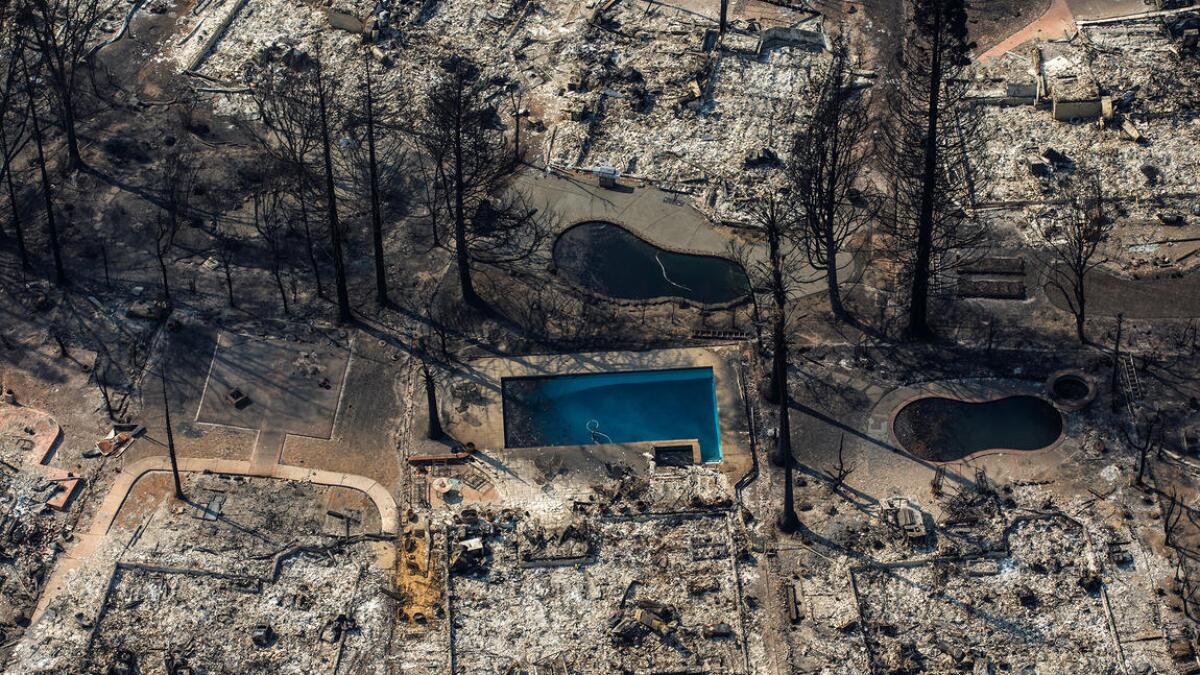
A Pacific Gas and Electric spokesman said Wednesday that it’s too early to know if the utility’s power lines or transformers sparked any of the fires raging in Sonoma and Napa counties.
The utility’s priority right now is restoring electricity, said Jason King, spokesman for the San Francisco-based utility.
At least 40,000 customers are without power in the Santa Rosa area, he said.
Strong winds late Sunday and early Monday affected the utility’s electrical lines across the North Bay, the company said in a statement.
“In some cases we have found instances of wires down, broken poles and impacted infrastructure. Where those have occurred, we have reported them to our state utility regulator and Cal Fire,” the statement read.
Any electrical facilities in Sonoma County are owned by the utility, unless the facilities are on private property, King said.
Sonoma County spokeswoman Hannah Euser said she had no information about damage to any PG&E’s infrastructure.
Daniel Berlant, assistant deputy director at the California Department of Forestry and Fire Protection said power lines, campfires and equipment use are common causes of fires, but investigators don’t know what sparked the blazes burning throughout Northern California.
“We have investigators spread out across all the fires,” Berlant said, adding that such investigations take at least several days.
All of Calistoga is now under mandatory evacuation
As wildfires continued to rage across Napa County on Wednesday afternoon, authorities issued new evacuation orders.
All of Calistoga is now under mandatory evacuation.
“Winds have shifted out of the northeast,” said Sgt. Scott Fleming of the St. Helena Police Department. “Our goal is to have all 5,000 residents out by 5 p.m.”
Officials advised residents to leave the city via State Route 29 south, or head south on the Silverado Trail to Zinfandel Lane, then head west to the 29.
A shelter is open at American Canyon High School at 3000 Newell Drive in American Canyon.
Sonoma County evacuees will no longer be allowed to visit homes for medicine, urgent items, sheriff says
Sonoma County authorities will no longer escort evacuees back into homes to grab essential items, County Sheriff Robert Giordano announced Wednesday afternoon.
“For a short time we were trying to let people back into their houses to get medications and urgent things,” Giordano said during a press conference Wednesday at the Sonoma County sheriff’s headquarters. “We cannot do that any more because of fire safety issues.”
People who have been asked to leave should stay away from evacuation areas and shouldn’t plan to return to their homes until after Monday, he said.
“This is a big event and we have a lot of work to do still,” Giordano said. “I would encourage people to find places to stay.”
Officials are also trying to upgrade Nixle so that people will get phone calls to their landlines when alerts are pushed out through the online notification system, Giordano said.
“We’re trying to upgrade Nixle right now.… We can upgrade Nixle to a level where it can also dial landlines in a geographical area,” he said.
He did not know how long that would take.
Authorities are still trying to find hundreds of missing people, and are “starting very limited searches right now in some of the cold areas,” he said.
Another 350 National Guard personnel are on the way to help with efforts, Giordano said.
Fires resources have included 73 helicopters, 30 air tankers and 550 fire engines
State and federal officials portrayed an all-out effort to fend off California’s devastating wildfires on Wednesday.
“It’s an extremely stressful and challenging time,” said Office of Emergency Services director Mark Ghilarducci. “We are all hands on deck.”
The response involves 73 helicopters, 30 air tankers and 550 fire engines. The state also has requested 154 additional engines from the federal government and 170 from nearby states, officials said during a news conference at a state emergency operations center outside Sacramento.
“These are going to be very unpredictable fires for the next several days,” Cal Fire Chief Ken Pimlott said.
Gov. Jerry Brown warned that recovery would be expensive and the state should brace for more dangerous fires.
“That’s the way it is with a warming climate and dry weather and reducing moisture,” Brown said. “These kind of catastrophes have happened, they’ll continue to happen, and we have to be prepared and do everything we can to mitigate.”
The situation remains dangerous, officials said.
“We’re not going to be out of the woods for a great many days to come,” Pimlott said. The state is still feeling the effects of the drought despite a recent wet winter, and there’s “explosive vegetation” fueling the blazes.
Volatile wind gusts push Atlas fire closer to Fairfield, triggering school closures
Another Northern California city is on edge as strong and erratic winds continued to push the damaging wine country fires -- which have already killed at least 21 people and burned more than 160,000 acres -- in new directions Wednesday.
The immense and growing Atlas fire, which began burning in Napa County, doubled in size overnight and the flames are now moving south toward Fairfield, a North Bay Area city along Interstate 80.
Authorities began evacuating the Green Valley area just outside the city and issued an advisory evacuation order for another neighborhood, warning residents to be ready to evacuate as forecasts predicted “volatile and gusty” winds in the area, local police said in an alert.
Three school districts in the area -- with a total enrollment of about 81,000 students -- shut down classes for the rest of the week as thick smoke enveloped the area.
Many people in the city are anxious.
Jennifer Leonard, a spokeswoman for the Vacaville School District north of Fairfield, said students and district staffers have friends or family in the area who have lost homes or loved ones in the fire.
“This morning it felt like a war zone, yesterday evening you could stare straight at the sun, it was just this purple circle in the sky,” she said. “Ash was falling from the sky.”
“It is a heavy and ominous reminder of this tragedy that is going on just over the hill,” she said,”It is a just a very solemn day for sure.”
Where people have died because of Northern California fires this week
So far, 21 fire-related deaths have been confirmed in Northern California as of noon Thursday, according to Cal Fire spokeswoman Heather Williams:
- 11 people died in Sonoma County
- 6 people died in Mendocino County
- 2 people died in Yuba County
- 2 people died in Napa County
The 28,000-acre Tubbs fire accounted for the 11 Sonoma County deaths, making it the sixth-deadliest fire in California history, Williams said.
Only two victims have been identified. Charles Rippey, 100, and his wife, Sara Rippey, 98, died when their Napa home was consumed by the Atlas fire.
Sonoma County sheriff expects the death toll to increase in the raging wildfires
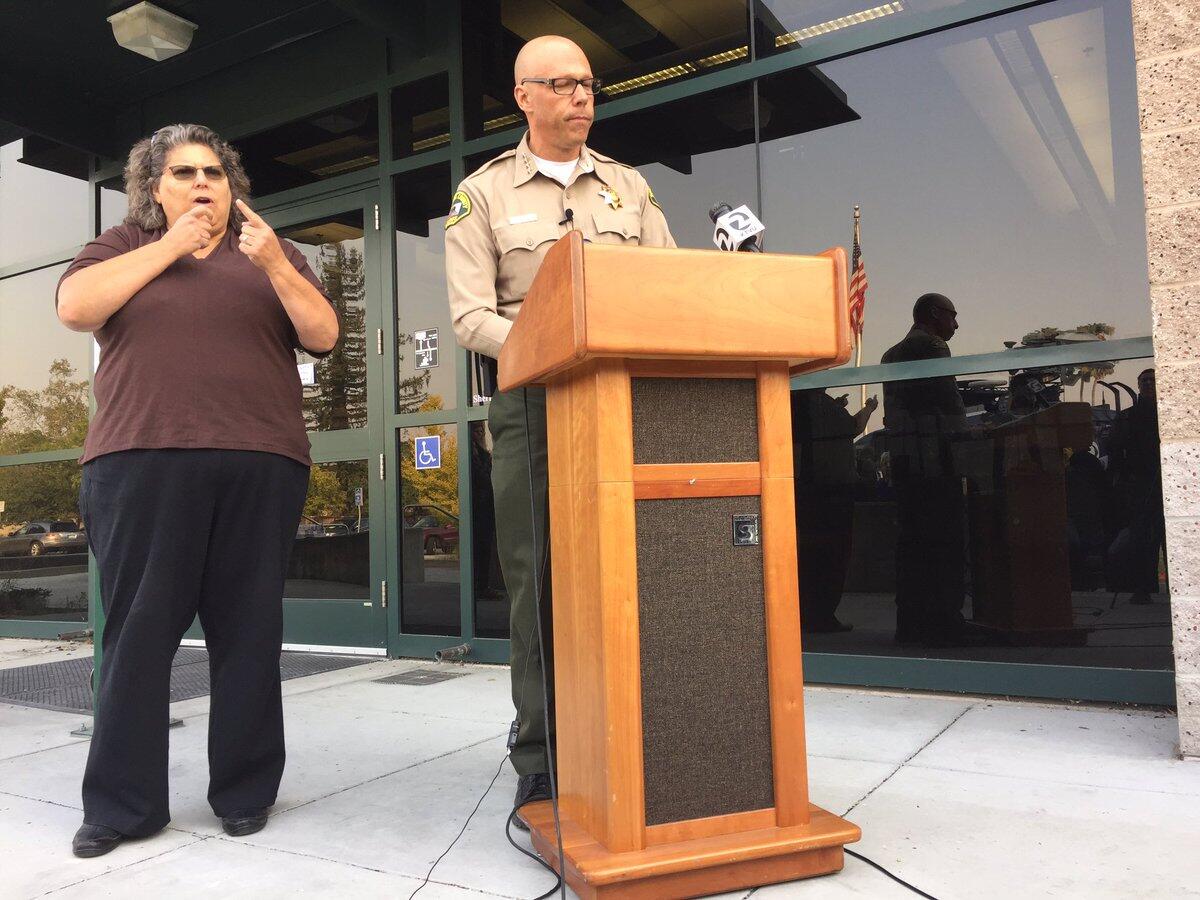
Sonoma County Sheriff Rob Giordano said Wednesday morning that emergency crews continued to evacuate neighborhoods near Santa Rosa through the night because of concerns that strong winds forecast for later in the day would kick up the deadly wildfires that have been burning since Sunday.
The sheriff urged all residents who receive notices of a possible evacuation of their neighborhood to leave the area as soon as possible and not wait for a final order to flee.
“This is a very serious event,” Giordano said at a news conference at the sheriff’s department headquarters.
The sheriff said there have been 11 confirmed fire-related deaths in the county, a number he expects to increase when emergency crews are finally able to search the hundreds of homes that have been reduced to ashes in Santa Rosa and outlying areas. The identities of those killed have not been released.
A team of detectives continues to track down the whereabouts of the 670 people who have been reported missing, and have already found 110 to be safe, he said.
The task has been complicated by the loss of 73 cellphone towers in burn areas, which has made it difficult for friends and family members to find their loved ones, the sheriff said. Still, he said he expects most of the people reported missing to be found safely.
Giordano said Sonoma County officials did send out warnings to residents as the fire approached Sunday. But he added that it’s difficult to assess how effective that alert system was during the rapidly moving fire.
Residents have to register to receive emergency warnings about fire, floods and other threats from the county’s SoCoAlert system. Residents can receive warnings via their home and work phones and their cellphones, by text message and by email.
“The fire was in the middle of the night,” the sheriff said. “I don’t know how effective that was. It’s going to take a long time until we understand that.”
Giordano said law enforcement officials did arrest three people they suspected were looting over the last two days.
Northern California firefighters ‘pushing it to the limits’ as turbulent winds feed fires
Crew exhaustion, limited resources and turbulent winds complicated the battle against multiple wine country wildfires Wednesday, California fire officials said.
“There’s no doubt there’s extreme fatigue,” said Cal Fire’s deputy incident commander in Napa, Barry Biermann. “They are pushing it to the limits. Everyone is.”
Napa County’s Atlas fire has nearly doubled in size to 46,000 acres, whereas the devastating Tubbs fire reversed direction and now threatens Calistoga, also in Napa County. The fire has also caused widespread devastation in Sonoma County, where it ran rampant through Santa Rosa.
Napa County Supervisor Diane Dillon said Cal Fire commanders decided in the middle of the night to evacuate nearly half of Calistoga’s homes.
By 3:30 a.m. Wednesday, Dillon and town officials along with police crews were walking house to house in the thick smoke, knocking on doors and telling occupants to leave.
“I was stunned to hear Cal Fire was recommending a massive, for Calistoga, evacuation,” Dillon said. “When we went out to talk, people were already leaving. People were alert to the situation.”
For more than two days, some 500 firefighters have been working extended shifts to rescue trapped residents, save homes, and get a start on containing the sprawling fires.
“We are stretching them shift after shift. We are trying to get them rest so they can reengage fresh,” Biermann said. “They are being pushed to limits that have not normally been pushed due to all these life safety issues and rescues.”
Crews that had been dispatched to other fires in the state are due to arrive Wednesday, bringing the total personnel fighting the fires to 800, Biermann said.
“It wasn’t that people weren’t giving us stuff. It was just there were so many different incidents going on,” Biermann said. “Southern California had a very significant fire. They had wind events. There were their own issues to deal with. And as fires become more contained as resources become available off other incidents, they go to the next need, and that’s what we’re starting to see.”
The weather is another challenge. Low humidity and gusting winds are creating prime conditions for explosive fire growth. Humidity levels are falling to 15% or lower and 10 to 30 mph winds are expected to gust much higher. Woodland fuels are at near or historically low moisture levels.
“When the wind and weather changes like it is doing, it is extremely difficult. This fire is extremely dangerous. We had a very challenging time on our fires yesterday because of the wind and fire growth, getting our aircraft in, because it was so turbulent, visibility was so terrible,” Biermann said.
“All areas of all fires will be a concern today.”
Winds push Tubbs fire north toward Calistoga and Middletown

As the deadly Tubbs fire pushed north overnight, Napa County officials went door-to-door asking residents of some 2,000 Calistoga households to leave.
The rest of the Napa County town remained under advisory evacuation orders Wednesday morning.
About 80 residents of the Veterans Home of California near Yountsville were moved because of respiratory problems. Some were taken to Travis Air Force Base and others to medical facilities.
Power was restored to parts of Napa, but cell coverage remained spotty.
To the north, the Lake County Sheriff’s Department has issued an advisory evacuation order for residents of Middletown, which was heavily damaged and rebuilt just two years ago in the Valley fire.
This threat comes also comes from the Tubbs fire to the south, which winds drove into Santa Rosa.
Now the weather has turned and Middletown, with limited access roads already choked by fires, could again be in harm’s way.
Northern California fires, by the numbers
The latest numbers from Cal Fire show that the biggest Northern California fires have reached 28,000 and 26,000 acres, respectively.
The Tubbs fire has no containment, and the Atlas Peak fire is about 3% contained as of Tuesday night, officials said.
‘We are facing some pretty significant monsters’: Firefighters hear from leaders
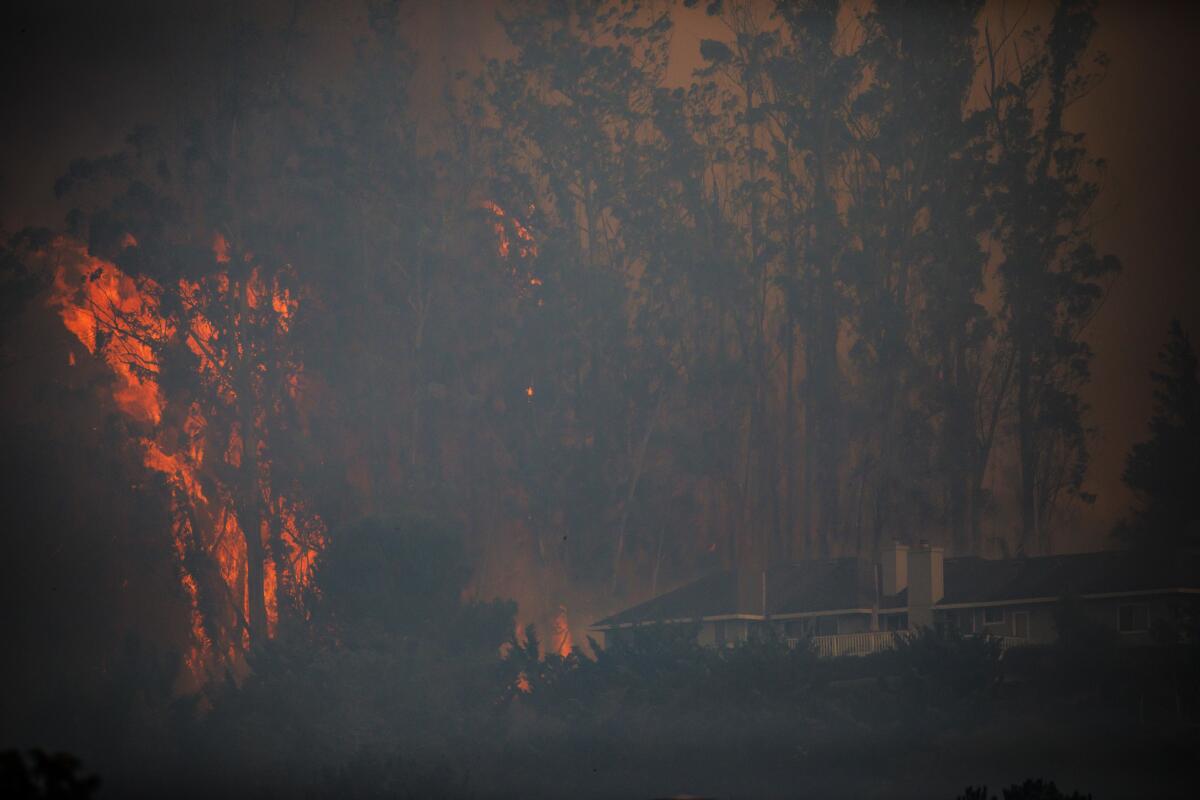
Cal Fire operations chief Steve Crawford set an ominous tone for firefighters combating the Tubbs fire during a strategy briefing at the Sonoma County Fairgrounds on Wednesday morning.
“A wind shift is coming, so don’t let your guard down today. It won’t be as strong as when this thing started, but be ready for it,” Crawford said.
Cal Fire incident commander Bret Couvea was more blunt: “We are facing some pretty significant monsters.”
Mindful that many firefighters have been serving double shifts, Couvea sought to lift their spirits. “Don’t let things that have occurred in this incident get you down,” he said.
The morning briefings are routinely held at 7 a.m. in a large barn where about 200 fire commanders, law enforcement officers — even postal office law enforcement officials — gather shoulder to shoulder to hear from top officials before setting out to the fire lines.
The focus of this briefing was on the 28,000-acre Tubbs fire affecting Napa and Sonoma counties, and the 1,800-acre Pocket fire in Sonoma County.
During the daytime, the winds will be light, less than 5 mph from the north in the morning, increasing to 15 mph in the afternoon in the valleys, officials told firefighters at the briefing.
Authorities also reminded firefighters that with the return of the winds, there is a danger of reviving embers and sending them flying into green areas that haven’t burned.
Firefighters will take advantage of a lull in the winds early Wednesday to attack hot spots and put out as many embers as possible.
At night, though, “winds will be 25-30 miles per hour after 2 a.m. These strong winds have the potential to push the fire south back towards Calistoga and Santa Rosa, especially where the fire was active yesterday [Tuesday] on the north side,” according to the weather forecast that firefighters received Wednesday.
Wildfire recovery funds included in $36.5-billion bill approved by House panel
The House Appropriations Committee on Tuesday approved a bill to provide $36.5 billion in emergency funding for hurricane and wildfire relief and recovery.
The legislation includes $18.7 billion for the Federal Emergency Management Agency’s Disaster Relief Fund, $576.5 million for wildfire efforts, and $16 billion for debt relief for the National Flood Insurance Program, which now needs additional funds to make insurance claims payments to individuals, according to a release from the committee.
The bill includes a provision for the Disaster Nutrition Assistance Program to enable low-income residents in Puerto Rico to receive the same emergency nutrition assistance that other hurricane-affected states already receive.
“These funds are urgently needed to get resources to families and communities that are still suffering,” Appropriations Committee Chairman Rodney Frelinghuysen (R-N.J.) said in the statement. “This legislation will continue immediate relief efforts, and help jump-start the rebuilding process.”
Most evacuations lifted in Anaheim Hills fire
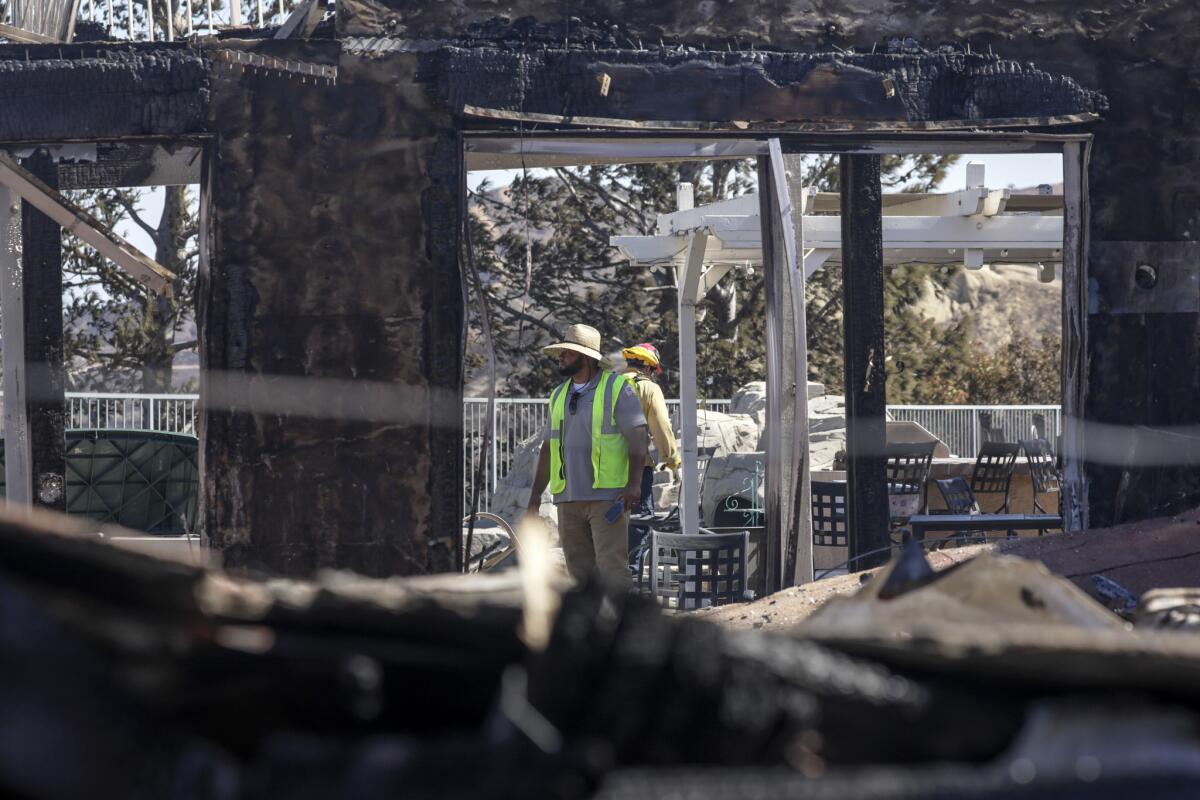
The Canyon 2 fire has scorched 8,000 acres in the Anaheim Hills and was 45% contained as of Wednesday morning, authorities said.
Most evacuation orders have been lifted and all residents should be able to return to their homes by late Wednesday, said Orange County Fire Authority spokesman Larry Kurtz.
Still, 1,600 personnel are on site fighting the blaze, focusing on hard-to-reach areas in the Cleveland National Forest on the fire’s eastern flank, Kurtz said.
“The big problem out there is just access,” Kurtz said. “Crews have a hard time getting to the perimeter to the fire because ...there’s no roads. It’s just wilderness.”
Crews have only completed about a fourth of damage assessment in the area, but so far 15 structures have been destroyed and another 12 damaged, according to a news release.
Officials expect the fire to be completely contained by Saturday, according to the release.
Cooler temperatures overnight helped calm the fire and on-shore winds bringing the return of the marine layer should help more, the release read.
As desperate calls poured in, an emergency alert system failed many
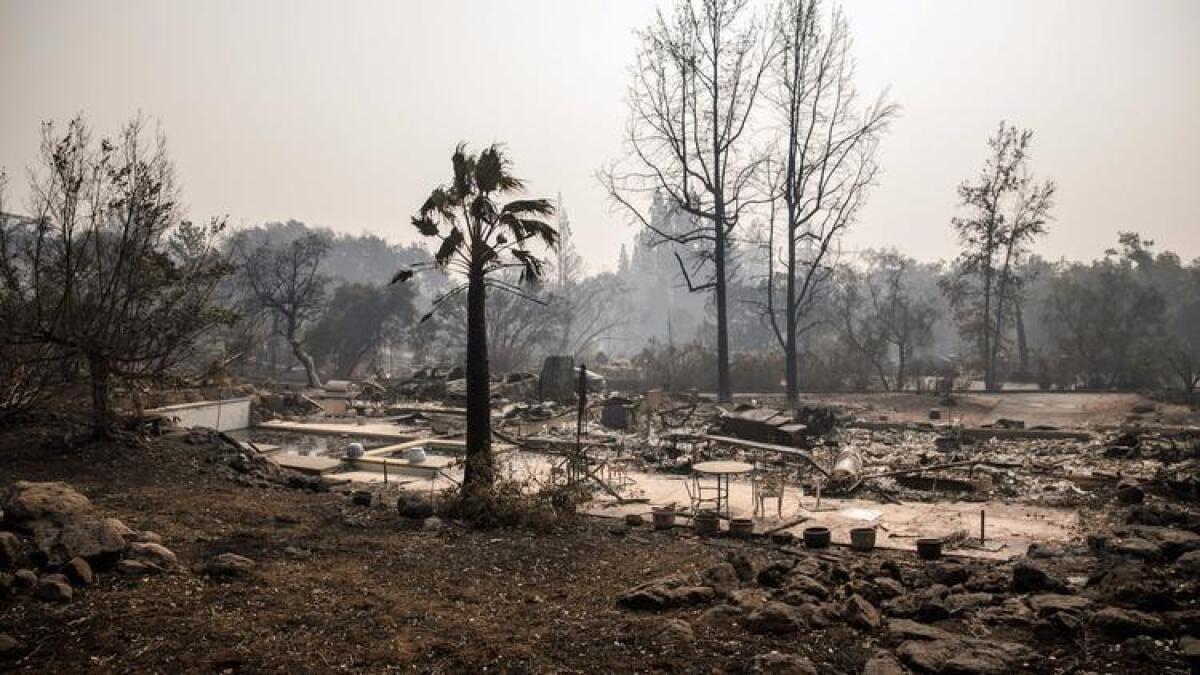
The distress calls crackled over the Napa County sheriff’s dispatch radio in a rapid staccato late Sunday as flames sped toward residents on Atlas Peak Road.
“Parents trapped in garage,” an officer called in to the central dispatcher. Then: “The fire is moving quickly through here.”
Two minutes later, the dispatcher sent someone to another house on the same road: “Two people trapped.”
A minute passed, then a call to still another house: “An elderly lady trapped.”
The dispatcher sent out an all-points request to send “any units in the area,” then made a chilling plea: “Two people called, advising their house is on fire, and they need help evacuating.”
Over the radio, officers in the field reported propane tanks exploding throughout the neighborhood, which would soon lay in ruins.
The dispatch calls, which began pouring out after 10:30 p.m., less than an hour after the fire was first reported, provide a harrowing narrative of the frantic, confusing efforts to rescue people from the Atlas Peak fire, which by Tuesday had burned 25,000 acres and destroyed more than 100 structures.
On Tuesday, Napa County officials confirmed the identity of an elderly couple who died in their home in the neighborhood: World War II veteran Charles Rippey, 100, and his wife, Sara, 98. They had just celebrated their 75th wedding anniversary.
In what has been called one of the worst firestorms in state history, at least 1,500 homes, businesses and other structures have been destroyed in 16 fires in Northern California in recent days.
At least 17 people, including the Rippeys, have died in the fires.
In Napa County — where at least three major wildfires, the Atlas Peak, Tubbs and 1,000-acre Partrick fire burned — the chaos was accentuated by a problematic alert system. Residents reported difficulties receiving fire alerts, an issue possibly caused by fire damage to cellphone towers, officials said Tuesday.
“We are well aware that there are challenges,” said Kristi Jourdan, a county spokeswoman. “It’s been a challenge to get information to folks at times using Nixle. I know some folks have had problems receiving text messages.”
Nixle is a text and email alert system used by public safety agencies, schools and other entities.
A Santa Rosa synagogue becomes a haven in a firestorm
Stephanie Kramer wasn’t sure what to do. The 33-year-old rabbi of a synagogue on Bennett Valley Road had offered shelter to congregants fleeing the wildfire on Monday, but by Tuesday evening, Bennett Valley was being evacuated too.
Kramer had spent hours calling synagogue members, trying to match those who had an open bed or room with those who needed shelter. Out of the congregation’s 460 families, more than 20 had lost their homes, Kramer said.
“There’s been an outpouring of help and support,” she said.
By Tuesday evening, there were just a couple of people left at the synagogue, including an elderly woman Kramer was trying to convince to go down to a congregant’s house in Petaluma and an elderly man with a poodle and a kitten. He had a friend in Windsor but wasn’t sure he wanted to go all the way there.
Sonoma County officials on wildfires: ‘This is nowhere near over’
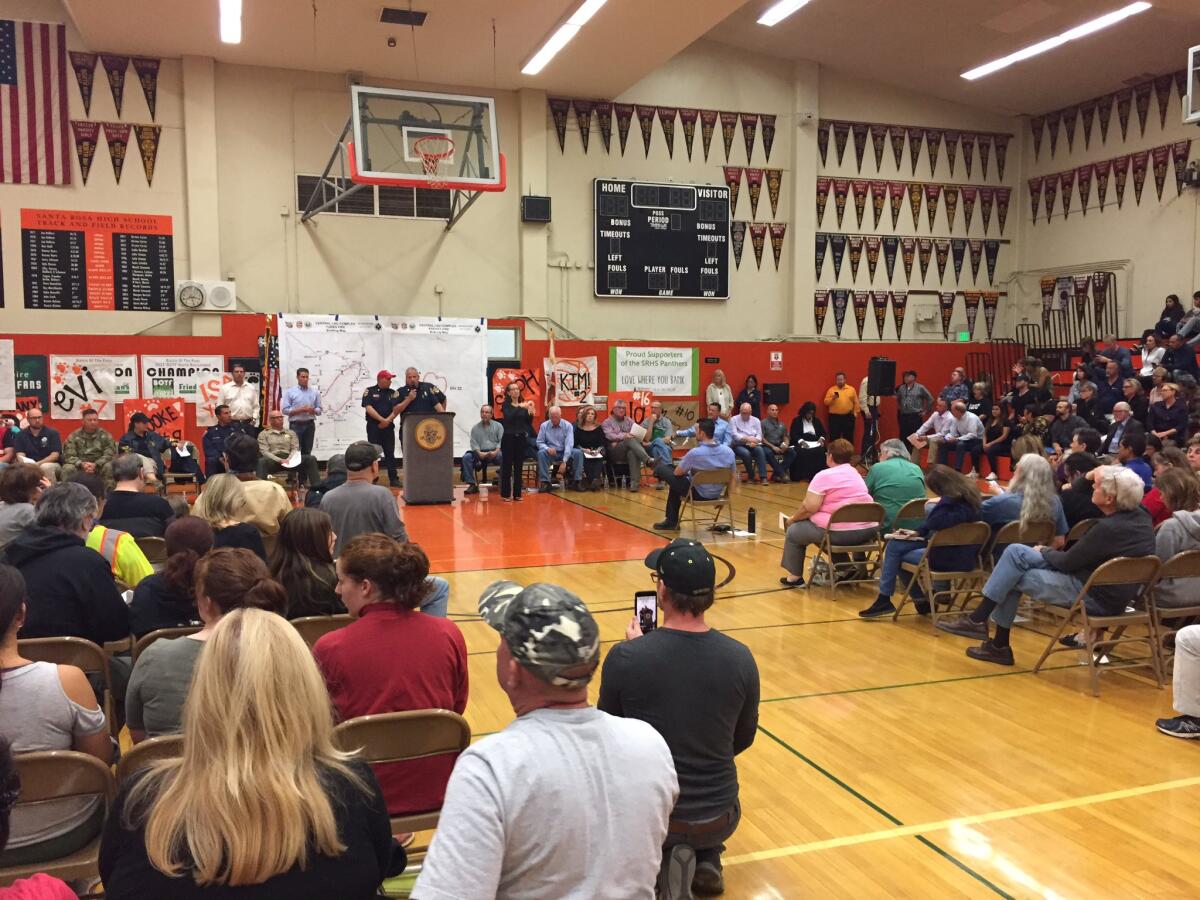
Sonoma County residents battered by deadly wildfires this week were told that a “red flag” warning forecasting potentially hazardous fire conditions has been issued for Wednesday.
This comes after cooler weather allowed firefighters to gain ground battling multiple blazes in the county Tuesday morning, only to see the flames flare up again with afternoon winds.
The dire warning was issued Tuesday evening during a packed community meeting with emergency officials inside the Santa Rosa High School gym.
“This is nowhere near over. This is still very dangerous,” said Sonoma County Sheriff Rob Giordano.
Giordano also confirmed that the countywide death toll in the fires increased to 11 people, most of whom perished in the wildfires that quickly spread from Calistoga into the city of Santa Rosa.
Cal Fire Deputy Chief Bret Gouvea told residents not to become complacent. Gouvea said the fire spread so rapidly on Sunday night and Monday morning because wind gusts reached up to 70 mph.
Santa Rosa Fire Department Chief Tony Gossner received warm applause from residents, but still issued an emotional apology to them.
“We just could not get ahead of this fire,” he said.
Eleven confirmed dead in Sonoma County, raising death toll from NorCal fires to 17
Sonoma County coroner’s officials confirmed late Tuesday that 11 people have died in the Tubbs fire, raising the death toll from the Northern California wildfires to 17.
Two bodies were recovered in each of the following areas:
- Angela Drive in Larkfield
- Mark West Springs Road in Larkfield
- Sundown Trail in Santa Rosa
One body was found in each of the following areas:
- Coffey Lane in Santa Rosa
- Crystal Court in Santa Rosa
- Mountain Home Ranch Road in Santa Rosa
- Hemlock Street in Santa Rosa
- Wikiup Bridge Way in Larkfield
Resident describes harrowing escape from Redwood Valley fire: ‘We’re going to die’
It was just after 1 a.m. when Jaime Lynn Lojowsky woke up to a pounding at the door.
“There is a fire on the mountain,” she overheard her neighbor tell her husband. “It’s an emergency. It’s an emergency.”
Lojowsky, who lives in Redwood Valley with her husband, Mac, and two young girls, looked out her back window. Normally, she’d see bright stars, the moon peeking between the redwoods, pines and oak trees. It was one of the reasons why she’d moved from crowded and light-polluted Southern California more than a year ago.
This time, white smoke choked the night sky. The hillside was on fire. Flames licked the backyard of her 1-acre lot. By Tuesday, the fire scorched 21,000 acres west of Mendocino National Forest, claimed one life and left two people seriously injured.
Wildfire evacuees in Anaheim, parts of Orange can return home tonight
Anaheim residents evacuated due to the Canyon 2 fire can return home Tuesday evening, city officials said.
The fire has scorched 7,500 acres and continues to burn, but it is no longer threatening Anaheim neighborhoods, according to Anaheim Fire and Rescue.
Thirteen homes in east Anaheim were destroyed in the blaze, while another 21 homes were damaged. Two out buildings were also ruined.
Residents were asked to check their homes for burn or water damage. Those who find their power out can call utility officials at (714) 765-3300 for information.
In Orange, evacuation orders were lifted for all residents except those living in neighborhoods off Windes Drive, Hunters Way and Lolita Street north of Santiago Canyon Road.
Officials advised residents not to bring horses or large animals back for at least 24 hours.
Santa Rosa fire officials issue stern warning to Oakmont: ‘All residents must leave now!’
Santa Rosa fire officials issued a stern reminder Tuesday afternoon to residents of the Oakmont neighborhood: Leave immediately, if you haven’t already.
The 5,000-acre Nuns fire burning in Annadel State Park is “rapidly approaching Oakmont,” the alert said. “All residents must leave now!”
The neighborhood, which was already under a mandatory evacuation order, is home to a senior living community. As of 2 a.m., no structures had burned.
“Right now, I don’t know,” Paul Lowenthal, assistant fire marshal for the Santa Rosa Fire Department, said shortly before 5 p.m.
Around the same time, residents west of the park were also ordered to evacuate as firefighters brace for a wind shift that could push the fire toward Summerfield Road and the Bennett Valley Golf Course.
Residents south of Parktrail Drive and east of Summerfield Road are being told to leave.
“They don’t want to take any chances,” Lowenthal said.
Fires leave elderly evacuees with nearly nothing. ‘She’s 85 and he’s 87. How do you start all over?’
At the Journey’s End mobile home park for seniors on Mendocino Avenue, sons and daughters returned to the skeletons of their parents’ homes for the first time since the fire to see what could be salvaged.
Almost all of the park’s 160 homes had been completely destroyed, though some on Sahara Street, near the Kaiser Permanente hospital, were still intact.
Alex Perez, 41, said he would drink tea with his mother-in-law at her home on Biltmore Street. All that remained Tuesday was the trailer’s steel frame, the carcass of her son’s motorcycle and the shells of a washer, dryer, microwave, refrigerator and stove. Two stools, a countertop and a sink lay on the ground.
“I’m just glad she’s safe, that’s it,” Perez said. He said she had only thought to evacuate because her brother had texted asking if she was OK. Perez said his mother-in-law wished she’d had more notice. She only saved her documents for the house and a Bible.
A couple of doors down, Carrie Reindahl said her mom and stepdad only got out in time because they woke up from the noise of their U.S. flag whipping in the wind. By then, two trailers and a tree were already ablaze.
“They tried to wake up some neighbors, and they barely got out with the clothes on their back,” Reindahl said.
On Tuesday, Reindahl managed to pull out her grandmother’s collection of porcelain Kewpie dolls from the rubble. Some had been broken.
“It’s just so devastating,” she said, looking at the wreckage of her mother’s home of 25 years. “She’s 85 and he’s 87. How do you start all over?”
Reindahl said her mom and stepdad had been able to drive out in their own car, but she worried about others at the park. “Trailers go up like a match,” she said.
A few streets over, Jeff Moroni, 55, had come back to see what he could collect of his mother’s belongings. Shirley, 86, lived in “the biggest and newest home” in the park, Jeff said, a three-bedroom, double-wide trailer.
Shirley Moroni had kept a few of her late husband’s prized possessions, including an antique bathtub he had turned into a flower planter and a lifelong collection of Morgan silver dollars, old pennies and nickels. On Tuesday, the coins were in good shape, but the surrounding papers were burned to a crisp.
Jeff also searched for his family’s cat, an 11-year-old orange tabby. Shirley Moroni hadn’t had time to grab much when sheriff’s deputies knocked on her door early Monday morning and evacuated her in their patrol car to the veterans’ building downtown.
“The only thing she had time to grab was my dad — his urn,” Jeff said, holding back tears. The family had been saving the ashes, he said, so they could be mixed with his mother’s when the time comes.
The fire’s destructive speed surprised him. Jeff said he thought the flames might have started in the hills above Fountaingrove Parkway and then raced down.
He said, “It looks like a bomb dropped.”
California wildfires destroying pot farms just before legal sales begin in state
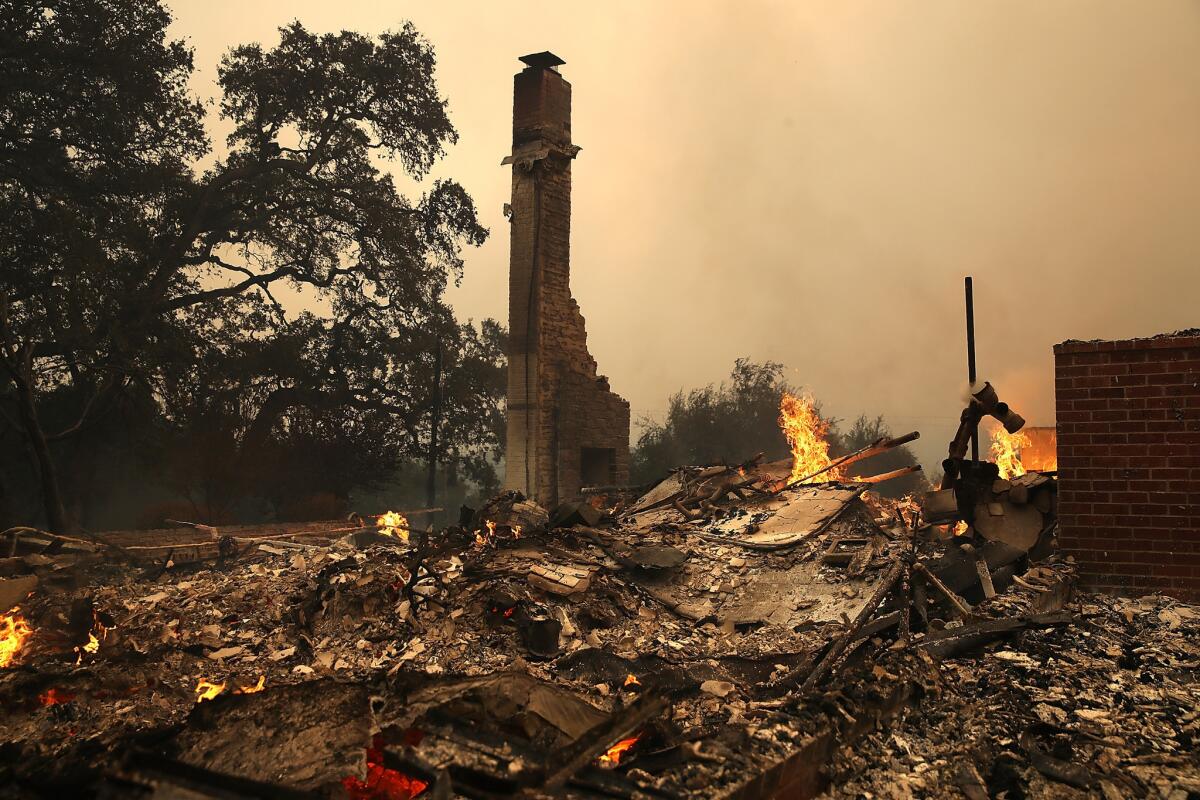
The Northern California wildfires this week have destroyed at least seven marijuana farms just months before the state begins licensing legal sales of cannabis, making it the “worst year on record” for loss of crops, an industry leader said Tuesday.
Many growers lost their homes and farms in the Redwood Complex fire in Mendocino County, the Atlas fire in Napa County and the Stubbs and Nuns fires in Sonoma County, said Hezekiah Allen, executive director of the California Growers Assn.
Fires in Sonoma County leave at least nine dead and about 180 more missing
Sonoma County Sheriff Robert Giordano said there were at least nine people killed in the wildfires that consumed Santa Rosa and other parts of the county this week, and that many more remain missing.
Giordano said 57 of the 240 reported as missing have been found safely. Communication difficulties, including disrupted cellphone service, may explain why many others have not been found. Many evacuees were in assisted living centers and may be hard to reach, he said.
“We have a team of people now working on finding missing persons,” the sheriff said. “A lot of it is just confusion trying to link people together.”
More than 200 additional law enforcement personnel from other cities and counties, as well as the California National Guard, are searching and securing burned and evacuated areas, Giordano said.
The sheriff urged patience: Many scorched areas remain unsafe, with spot fires still burning and power lines still down.
“Getting people back in their homes soon is important to us as well, but the most important thing is keeping them safe,” he said.
Giordano said the bodies of eight of the nine people killed in the fires have been recovered and one remains in a home that is still too hot to enter.
He said it could take weeks to confirm the identities of some of those who perished.
No information was released about where the bodies were found or the circumstances of their deaths, other than the fact that they were all fire-related.
The sheriff praised the response of his department, noting that at least 20 deputies and other agencies lost their homes in the fire. Deputies also risked their lives to evacuate residents.
The most harrowing assignment deputies faced was evacuating residents from the isolated homes and neighborhoods in the hills to the north of Santa Rosa, including off Mark West Springs Road, a winding two-lane street lined by trees.
Giordano said the fire barreled down the Mark West canyon and toward Sutter Hospital in the city.
“There was even one deputy who was stuck in an open field with 40 people who kept coming to the patrol car, but they couldn’t get out,” Giordano said. “They watched the fire burn around them.”
Damaged cell towers create communication problems in Northern California fire zone
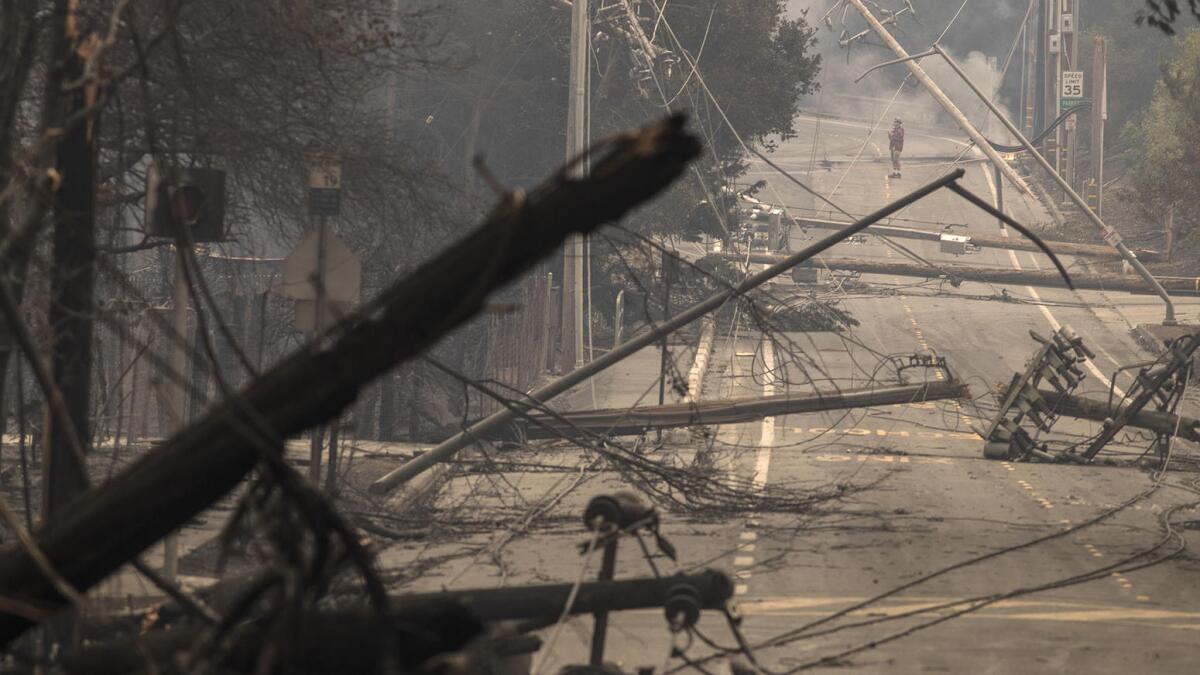
Napa County residents reported problems with getting alerts about fires, an issue possibly caused by fire damage to cellphone towers, a county spokeswoman said Tuesday.
“We are well aware that there are challenges,” said Napa County Public Information Officer Kristi Jourdan. “It’s been a challenge to get information to folks at times using Nixle. I know some folks have had problems receiving text messages.”
Nixle is a popular alert system used by public safety agencies and schools.
In a news conference Tuesday, Mark Ghilarducci, director of the California Governor’s Office of Emergency Services, acknowledged that many evacuees are struggling to access alerts or get in touch with each other.
He said that across Northern California, 77 cell sites were destroyed or damaged, and that the state is creating mobile communications units to help.
In addition to Napa County, the city of Napa uses Nixle, noting on its website that the service allows for “real-time alerts and notifications about emergencies, traffic problems, crime watch notices, safety tips and more directly to your cell phone or e-mail.”
The company did not immediately return a phone call Tuesday.
Napa resident Brenda Burke, 55, said a Nixle alert about the Atlas Peak fire came in about 30 minutes after its postmarked 11 p.m. time on Sunday night. She said she was first alerted to the fire earlier in the night by a friend who sent a text message.
There are at least three major fires burning in Napa County: the Atlas Peak fire, the Tubbs fire and the Partrick/Carneros fire.
In addition to using Nixle, Jourdan said the county partners with local radio stations KVON and KVYN and posts messages on its Facebook and Twitter pages. She said residents should check all those sources.
A fountain, two tables, 12 chairs: The remains of the Fountaingrove Inn
At the corner of Fountaingrove Parkway and Mendocino Avenue, the remains of the historic Fountaingrove Inn Hotel and, above it, the Hilton Sonoma Wine Country hotel could be seen from the bottom of a charred hill.
The sickly sweet smell of smoke hung in the air. The ground was still hot. Nearby spot fires continued to smolder.
At the Fountaingrove Inn, it looked like a fire had torn through the property, leaving behind only a steel frame, now crooked in many places, and pieces of stone walls. A mess of tangled rebar, broken piping and blackened tree limbs lay strewn above piles of rubble. Water pipes hung down and broken glass littered the hedges.
Amazingly, at the far side of the inn, a dry fountain, two wooden tables and about a dozen wooden chairs remained intact.
Farther up the hill, the sprawling Hilton looked similar, except the scene was repeated in several areas. Small fires still smoldered and the occasional piece of debris rained down. On the far end of the property, the pool and its surrounding area were untouched.
In a pile of ashes, a veteran searches for gift he gave father after return from Iraq
It took Brady Harvell almost exactly two hours to find what he was looking for in the rubble of his parents’ home.
Using a small spade to move ashes aside, Harvell, 31, searched for the Army dog tags he gave his father in 2013 when he returned from deployment in Kirkuk, Iraq.
At 12:40 p.m. he reached down and triumphantly pulled it out of a gray pile, held it up and shouted: “Got it! Oh my God! Got it!”
Marveling over the discolored and misshapen valuable in the palm of his hand, Harvell said: “I grew up here, all my memories are from this very spot. It’s where I played and learned right from wrong. But the fire destroyed every photograph my mother and father had of me. It took all our memories, except this one.”
Standing in the ruined neighborhood on the northwest corner of Santa Rosa, Harvell reached into his pocket, pulled out a cellphone and dialed.
On the other side of the line, his father said: “Love you, Brady.”
“Love you dad,” Harvell replied.
Climatologist explains why ‘the conditions are primed for fire’ in California
Here’s why fires are exploding up and down the state, with answers by Bill Patzert, a climatologist for NASA’s Jet Propulsion Laboratory in La Cañada Flintridge.
What is going on in California?
Fall is fire season in California — the end of the long dry season and the appearance of the meteorology that drives the strong, hot and dry winds (appearance of high pressure over the Great Basin-Nevada) that drive the fires. After more than a decade of drought, the fuel levels up and down California (dry brush and grasses) are exceptionally high. The conditions are primed for fire.
What are the wind conditions?
On Sunday and Monday, the dry, intense Santa Ana winds in Southern California and the Diablo winds of Sonoma and Napa counties roared out of the mountains and the situation exploded. ... Last winter’s welcome rains created more vegetation that — over the past dry six months — created more fuel.
Why are the fires starting in these places?
The simple formula is fuel plus meteorology plus ignition equals fire. The catalyst is people. Both the Northern and Southern California fires erupted in areas with a high population density, where wildlands meet urban and suburban development.
Part of this story is that both in the north and south, Californians have built in what are historical fire corridors. These new, high-density developments are particularly vulnerable to fast-moving, destructive fires.
Ten minutes of terror over radio as flames invade Napa County neighborhood
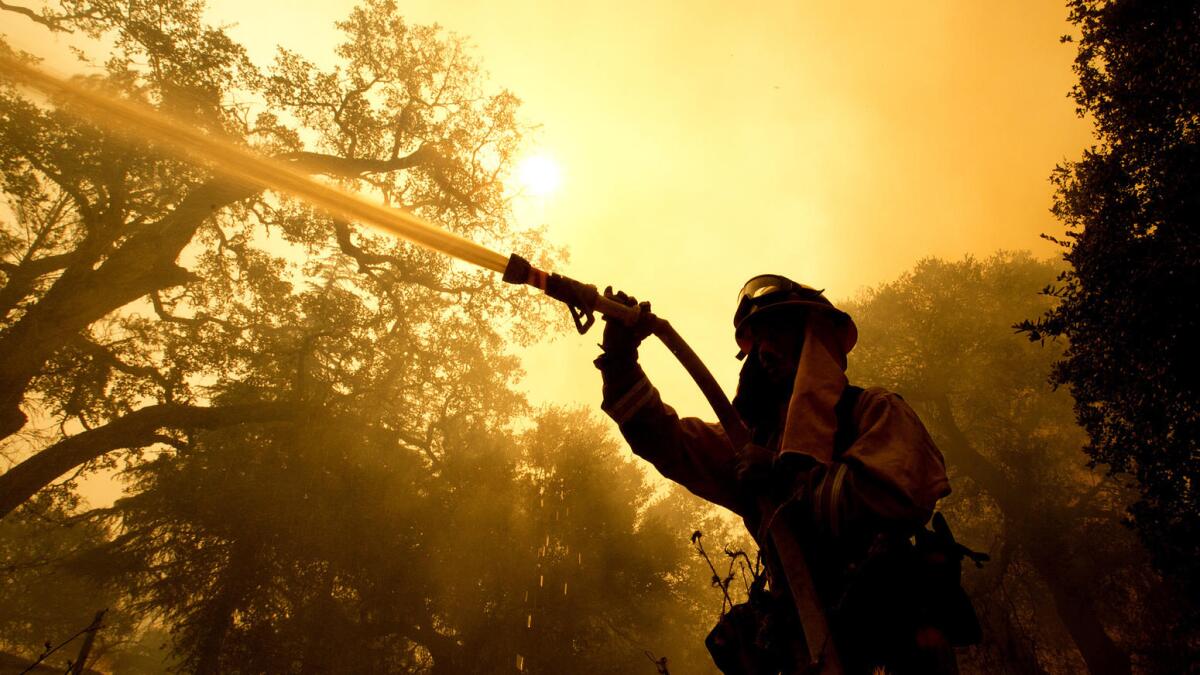
The terror that swept in with the wind-driven fire over those living on Atlas Peak is evident in the chaos that erupted over less than 10 minutes over the Napa County sheriff’s dispatch radio late Sunday night.
The distress calls, crackling over the radio since 10 p.m., arrived in rapid fire by 10:42 p.m.
“Parents trapped in garage,” one officer radioed in to the central dispatcher, giving an Atlas Peak Road address, followed by another warning: “The fire is moving quickly through here.”
Two minutes later, the dispatcher sent someone out to a second house on the road: “Two people trapped.”
Barely a minute later, also on Atlas Peak, a call came in for another house on the road: “An elderly lady trapped.”
At the same time, an officer on scene radioed in the loss of nearby house. “It is on fire now, it looks like they evacuated,” he said.
The dispatcher sent out an all-points request for “any units in the area.”
“Two people called, advising their house is on fire, and they need help evacuating.”
A minute later, she repeated the call.
“Is anybody able to go to 2232 for two people trapped in a house on fire?”
Moments later, propane tanks began to explode.
Two deaths have been confirmed from the fire that tore through the neighborhood. Charles and Sara Rippey, ages 100 and 99, died in their home on a ridge. Their son told a Bay Area television station that the caregiver for his parents was unable to get them out of the house.
“It was very fast, very fast,” Chuck Rippey told NBC. “She went to get my father and all the windows started to explode. The smoke. The heat… She couldn’t find him.”
The three major Northern California fires are still not contained, officials say
Over 17 fires continued to burn more than 115,000 acres across the state, officials said in a briefing Tuesday.
Cal Fire Director Ken Pimlott provided an update on the major fires in Northern California.
- The Atlas Peak fire in Napa covered 25,000 acres and was 0% contained.
- The Nuns fire in Santa Rosa covered 5,000 acres, and was not contained. Pimlott said firefighters were working to keep it from spreading to Sugarloaf Mountain to protect the eastern edge of Santa Rosa.
- The Tubbs fire covered 27,000 acres and also was not contained. Workers focused on protecting the flank of Calistoga Road from the fire.
Conditions for fighting the fires, though, had improved with the changing winds Tuesday.
“We did experience much calmer winds overnight and into this morning,” Pimlott said. “Humidities are up,” giving firefighters a better chance to control the fires. Red flag warnings had expired or were about to expire, he added.
So far, firefighters on 45 missions have pumped 266,000 gallons of fire retardant over the flames. “We are far from out of the woods,” Pimlott said. “We’ve got several days of fire weather conditions to come.”
When asked about the cause of the fires, Pimlott said they are still under investigation, and it’s “very early in the process.” The majority of fires — 95% — are started by people in one way or another, he said.
The flames turned into a massive firestorm in part because of the fast winds and because of the timing. “They all grew into major fires very quickly,” he said. “People were sleeping. ... These fires came down to neighborhoods before people even realized that the fires were occurring.”
In response to reports of looting, Pimlott said there is “zero tolerance for people who are entering these properties illegally.”
As of Tuesday, there were 3,200 people staying in 28 shelters throughout Napa and Sonoma counties, said Mark Ghilarducci, director of California’s Office of Emergency Services. Power and water are still problems, particularly for gas stations — so the state is providing refueling trucks to pour gasoline directly into stranded cars.
Ghilarducci also said that 77 cell tower sites were destroyed or damaged and that the state is creating mobile communications units.
Officials said the 101 Freeway through Santa Rosa had reopened, though some of the ramps were closed. About 14 schools in seven counties remained closed.
“This is pure devastation, and it’s going to take us awhile to get out and comb through all of this,” Pimlott said. His priority is to get people back in their homes, but “this could be days; this could be weeks for some folks.”
Northern California fires by the numbers
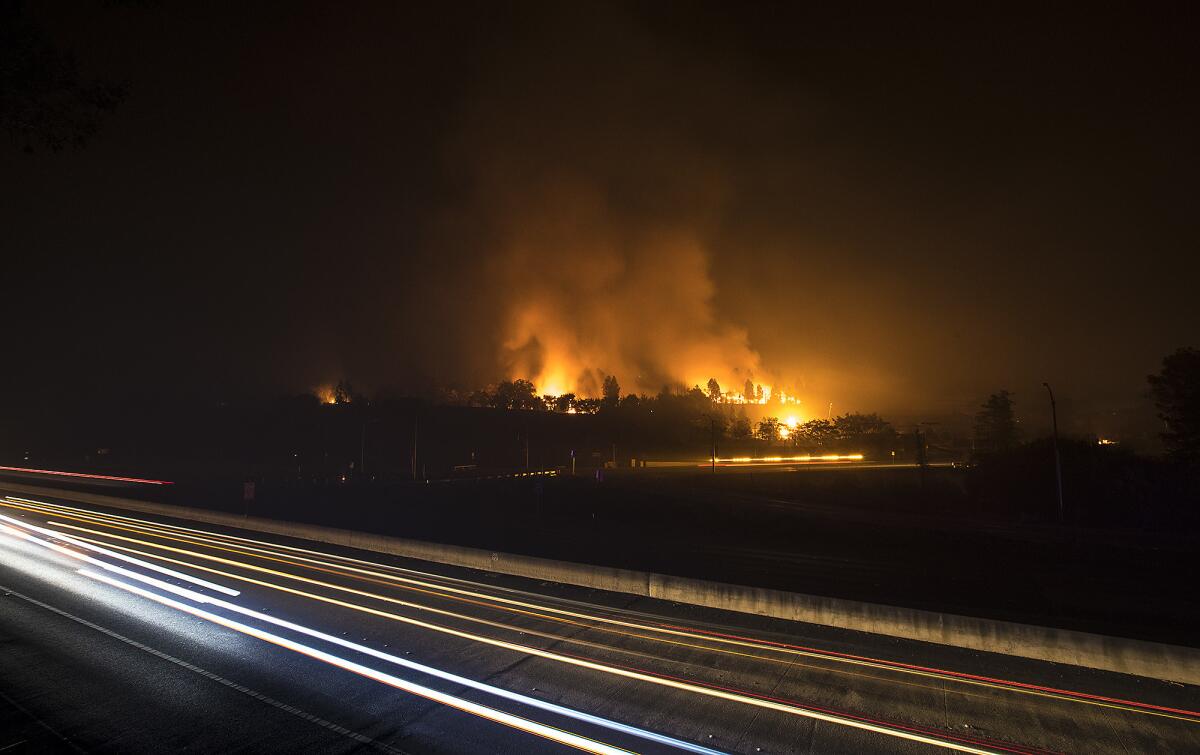
Each day the National Interagency Fire Center releases a situation report detailing wildland fire activity in the United States.
As of 4:30 a.m. Tuesday, here is the information NIFC compiled on the major fires that erupted in Northern California over the last two days. The cost-to-date figure represents the cost associated with fighting the fire.
NIFC is located in Boise, Idaho, and combines the efforts of eight agencies: the U.S. Forest Service, the Bureau of Land Management, the National Weather Service, the Bureau of Indian Affairs, the National Fish and Wildlife Service, the National Park Service, the U.S. Fire Administration and the National Assn. of State Foresters.
NIFC started in the late 1970s as the Boise Interagency Fire Center, and provides support across the United States.
Santa Rosa’s northern hills are still burning
The rolling hills north of Santa Rosa on Tuesday still smoldered a day after Monday’s deadly firestorm.
Firefighters and utility crews worked feverishly to douse hot spots and power lines snaking across roads and front yards.
Eric Anderson provided a harrowing tale of his narrow escape from his home on Mark West Springs Road, where the flames swooped down just before 10 p.m. Sunday and exploded into the town below, destroying hundreds of homes.
“It just came through there, like a blowtorch,” said Anderson, a contractor. “I saw fire trucks racing up Martin West and then, five minutes later, I saw them racing down. I said, time to get out of here.”
Anderson said residents in the wooded area, which is dotted with million-dollar homes, had little warning. As he loaded the last box of possessions into his car, a flurry of embers flew overhead, setting off spot fires throughout the hillside community.
Authorities said the fires in Northern California have claimed at least 13 lives thus far, and warned that the death toll might increase.
On Tuesday morning, a Los Angeles Times reporter saw Sonoma County Sheriff’s deputies gathered around a burned car near the top of Mark West Springs Road. The car was on its side, in a gulch, just off the road. A empty gurney was on the road above it, next to an unmarked white panel van commonly used by county coroners,
The deputies declined to comment about what had happened and ordered the reporter to leave, saying the scene was off limits to the public and remained hazardous.
Napa fire evacuees say blaze struck with little warning
A volunteer at the Red Cross shelter in Napa said Tuesday one refugee from the raging wildfires told her that he did not get his cellphone alert until an hour after he had left his home. Other evacuees said they received no warnings despite signing up for automated text messages from the Napa County Sheriff’s Department.
Sisters Georgia Hansford and Sandy Sundin said they have lived with the threat of fire in the Napa Hills area since their parents moved there in 1959.
Three times now, they said, they’ve seen the oak savanna slopes and vineyards engulfed in flames. They said they weren’t aware that a red-flag warning was in effect, but that they recognized the dangerous fire conditions themselves.
“When there is a fire and the wind blows, you already know conditions are bad,” Sundin said.
Fire is part of the oak savanna ecology, and the ridges catch and accelerate southerly winds, funneling them down to the long, hot Sacramento Valley.
Sundin said the moment she and her sister saw flames crest the ridge line on Atlas Peak, above their home on Silverado Trail north of Napa, the wind had picked up. She said she then knew they had to get out fast.
“The most frustrating part is no news,” said Hansford, a retired school bookkeeper. “All they keep doing is telling us to stay out.”
White House Press Secretary Sarah Huckabee Sanders on the wildfires: ‘Our hearts go out to the people of California’
Untouched by flames, Santa Rosa winery prepares food for devastated neighborhoods
The Kendall-Jackson Wine Estate and Gardens north of Santa Rosa was untouched by the devastating Tubbs fire, despite being just a few miles from where flames jumped the 101 Freeway on Monday.
On Tuesday, ash swirled in the air and thick smoke blanketed the sky. The winery was closed for the day but six kitchen employees had come in, responding to calls for volunteer staff who could help prepare food for employees and others affected by the flames.
“Rather than sitting at home listening to the news all day, at least we can contribute,” said Ken Poe as he sprinkled salt and olive oil over a tray of salmon filets.
Matthew Lowe, who has worked at the winery as a chef for 17 years and did not have to evacuate his home in Forestville, prepared tray after tray of meatloaf. He said he came in to work Tuesday “because I could. They asked those of us who were able to come and help, so I did.”
Pence: major disaster declaration approved for California wildfires
Vice President Mike Pence said in a visit to California’s emergency management headquarters that President Trump has approved a “major disaster declaration” for California to assist with the response to the fires that have burned thousands of acres in Northern California.
“This declaration will allow FEMA to identify, mobilize and provide additional equipment and resources to assist with the emergency,” he said. “This includes debris removal, emergency protective measures, search and rescue operations.”
Pence received a briefing Tuesday from officials at the California Governor’s Office of Emergency Services.
“Let me first say our hearts and the hearts of every American go out to the families of the 13 who’ve lost their lives. It’s heartbreaking to think that many of the fallen represent our most vulnerable; in some cases senior citizens who simply were not able to escape the flames that overcame their homes,” he said. “They are in our prayers.”
World War II veteran and his wife killed in Atlas Peak fire
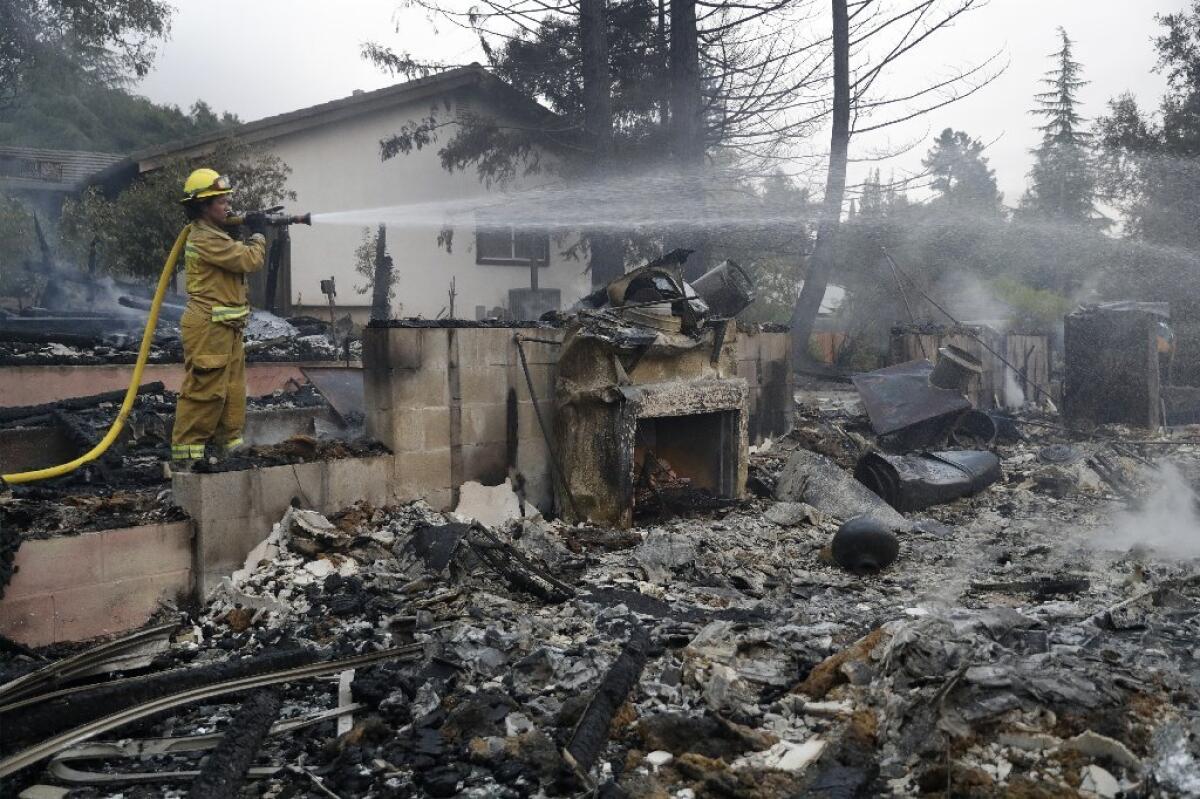
An elderly Napa couple who died in their home in the Atlas Peak fire had recently celebrated their 75th wedding anniversary, according to the Napa Valley Register.
The Napa County Sheriff’s-Coroner’s Office on Tuesday confirmed the deaths of Charles Rippey, 100, and his wife, Sara Rippey, 98.
They had lived near the Silverado golf course for about four decades, their son, Chuck, told NBC Bay Area. The couple’s caregiver called him as fire tore through the house on Sunday night.
“The caregiver called me and said that there was fire everywhere,” Chuck Rippey told the station. “I said just get those guys out on the street, and before she knew it, the roof was caving in and all that, so it was very fast. Very fast.”
The Rippeys celebrated their 75th anniversary on March 20, the Napa Valley Register reported.
Charles was a World War II veteran who attained the rank of captain in the Army Corps of Engineers and was stationed in Europe and North Africa, according to the Register. He went on to work for Firestone Tire and Rubber Company and Norris Industries in Brea.
Sara was a homemaker and avid bridge player.
The couple’s five children all gathered in Napa in March to celebrate their anniversary. Charles turned 100 in July.
Chuck Rippey told NBC Bay Area that his parents’ bodies were discovered in the ashes of their home. Despite the smoke, and his walker, Charles almost managed to make it to Sara’s side.
Wind dies down, giving Northern California firefighters a shot at containing blazes
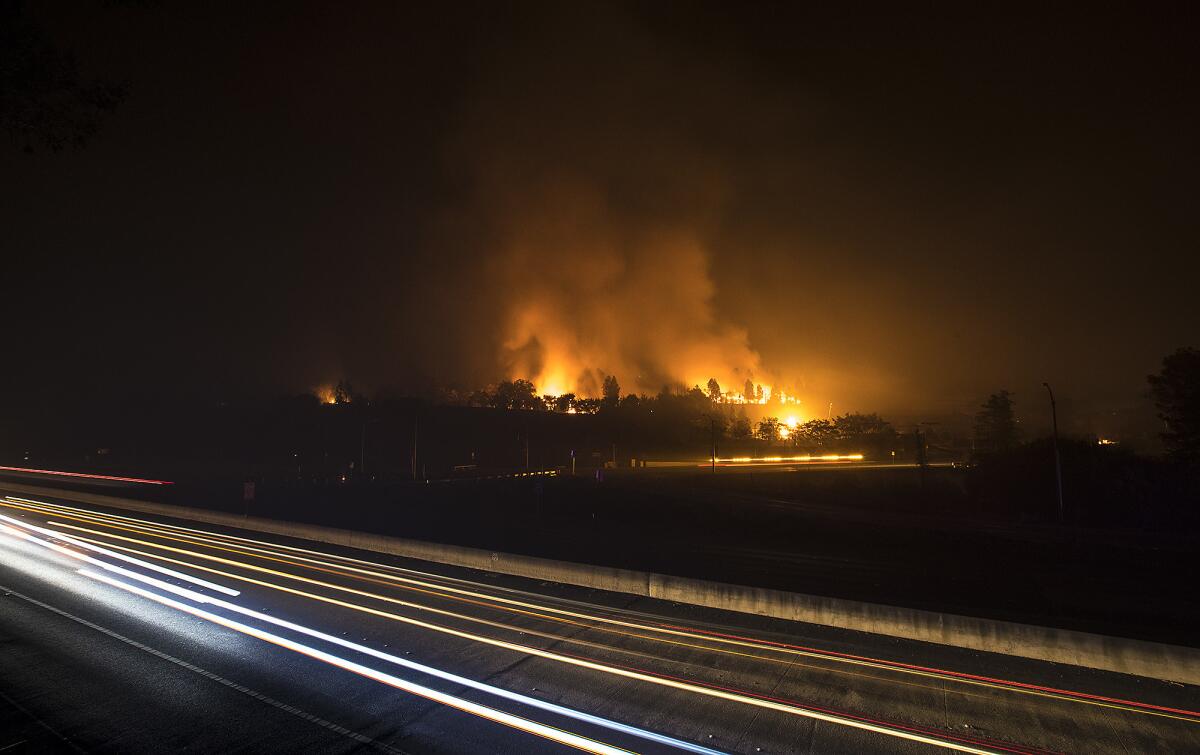
An abrupt return to normal weather conditions for this time of year brought what had been devastatingly swift wind-whipped fires in Sonoma County to a halt on Tuesday. The shift allowed firefighters and utility workers an opportunity to try to contain the blazes and restore communications.
“You take away the wind and we’re back to normal in Northern California,” said Cal Fire spokesman Richard Cordova. “Humidity is in the 20s, temperatures in the low 80s, which is all good and it’s going to stay that way for the next several days.”
The size of the Tubbs fire, which on Tuesday had threatened to overwhelm this city of about 175,000 people, remained at 27,000 acres charred, with 0% containment, he said.
“We had some issues with cellphone towers and downed power and telephone lines and poles,” he said Tuesday. “Today, Cal Fire and PG&E are working together to get those poles back up, and to start working on the infrastructure.”
In the meantime, more than 1,000 evacuees from surrounding blackened foothills gathered anxiously in three Red Cross shelters, including two at the Sonoma County Fairground where there was a shortage of blankets.
“We’ve pretty much stripped our [local] storage facilities of cots and blankets,” said Ron Reynolds, Red Cross shelter manager at the Sonoma County fairgrounds.
The number of dead in Sonoma County remains at seven people as of Tuesday morning.
“The fire started at about 10 p.m. so it could be that people were sleeping, or they were trapped,” said Cal Fire spokesman Richard Cordova.
There have been six deaths in other counties, according to officials.
“With 80 mile per hour winds, there’s no controlling a wildfire,” Cordova said. “The fire started at about 10 p.m. so it could be that people were sleeping, or they were trapped.... But then again, they’ve never seen a fire like this one.”
Santa Rosa resident laments fire damage: ‘It just had so much character’
Seven miles north of Santa Rosa about 20 residents of the Larkfield neighborhood had gathered Tuesday morning, hoping to be let back into their homes to check for damage and to gather medication and other essentials.
Police had blocked off traffic and were allowing only one family in at a time, escorted by police.
Sue Asay, 65, and her husband John, 69, had come back from their daughter’s home in Rohnert Park to pick up medication -- hers for ulcers and his for a heart condition. The Asays, now retired, had moved into their house as a young family 31 years ago. They raised their daughter there. Today, their grandson attends Mark West School, which Asay had heard was still standing, as was her house.
But Cardinal Newman High School wasn’t so lucky, Asay said, having suffered damage in the fire. Many children in the community attended that school, and almost everyone attended its annual crab feed fundraiser.
Willi’s Wine Bar, a classic roadhouse style bar with a saloon atmosphere, also burned.
“It just had so much character,” Asay said. “That stuff is the history of the area.”
Sonoma County Sheriff: 150 missing-person reports filed in wake of fire
The Sonoma County Sheriff’s office has received about 150 missing-person reports as a series of fires continue to burn in wine country.
“We have received about 150 missing-persons reports. We are confident that many of these people will be found safe and reunited with loved ones, but unfortunately we are preparing for further fatalities,” the department said in a Facebook post.
The department said 4,991 residents spent the night in one of the 24 evacuation centers open in the county.
The department said there had been calls of suspicious vehicles but no reports of looting and no arrests in the evacuated areas.
At least 11 people have died in Northern California fires that continue to ravage multiple counties, while the Anaheim Hills fire in Southern California has scorched between 5,000 to 6,000 acres.
NASA satellite captures Northern California fires from space
Woman dies fleeing fire in Yuba County
A woman died Monday morning fleeing the Cascade fire in Yuba County when her car went off a rural road, county spokesman Russ Brown said.
The woman was in a convoy of cars traveling on Lone Tree Way in the town of Loma Rica when her car veered off the road amid heavy smoke, he said.
Nine Orange County schools closed because of Anaheim Hills fire
Nine Orange Unified School District campuses will be closed Tuesday due to the wildfire raging in the Anaheim Hills area:
- Anaheim Hills Elementary
- Running Springs Elementary
- Canyon Rim Elementary
- Chapman Hills Elementary
- Linda Vista Elementary
- Panorama Elementary
- Santiago Charter School
- El Rancho Charter School
- El Modena High School
District staffers will monitor air quality at schools remaining open in Anaheim Hills and Orange, and will keep students indoors, according to a statement from the district.
All sports and after-school activities have been canceled.
Sonoma County has fielded 100 calls from people looking for missing loved ones
Sonoma County fire officials have fielded 100 phone calls from people looking for missing family members or friends.
Some callers were looking for the same individuals, said Barry Dugan, a Sonoma County spokesman. It’s unclear how many people are actually unaccounted for.
The Sonoma County Sheriff’s Office has confirmed seven fire-related deaths.
Those looking to report a missing person or get information on the fire can call (707) 565-3856.
When he saw a ‘red snake’ of fire, this off-duty detective banged on his neighbors’ doors. Now he’s watching for looters
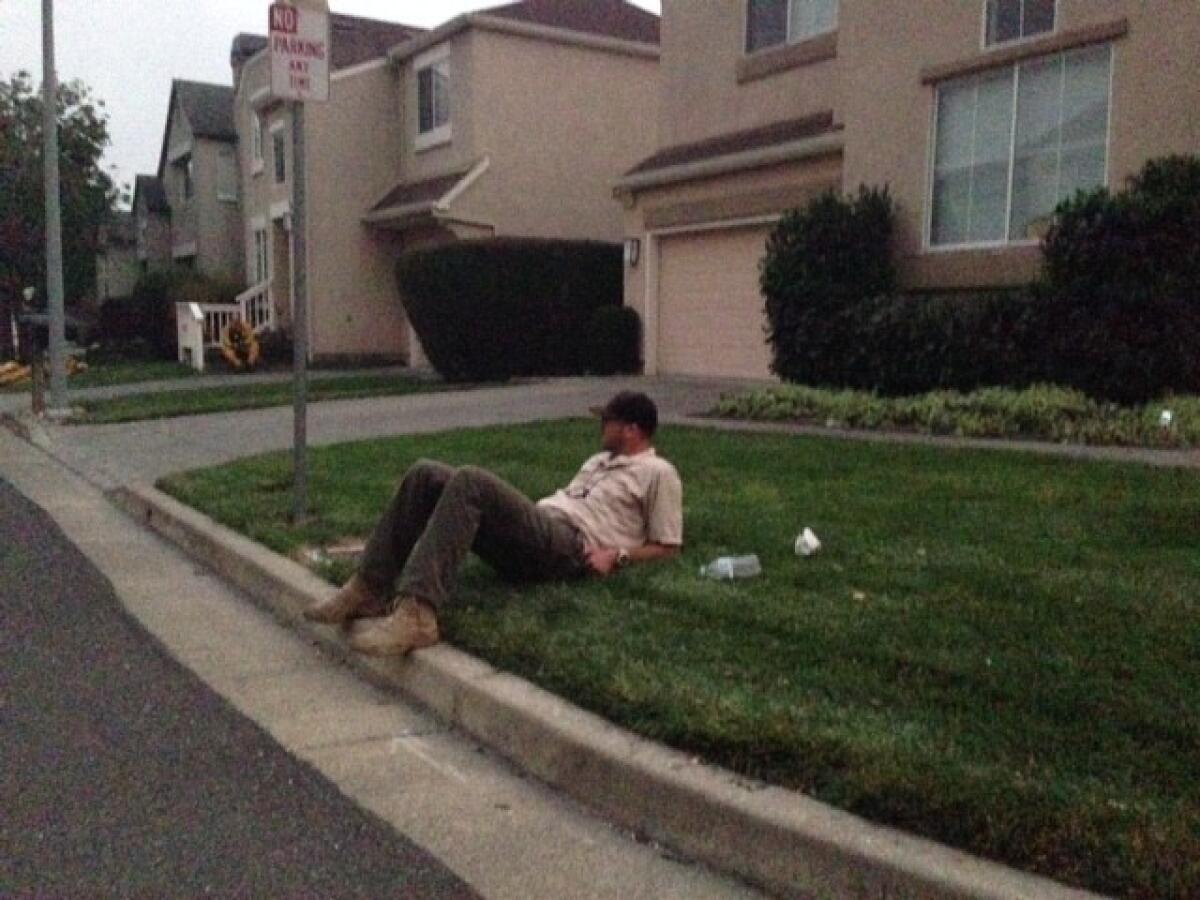
Troy Newton smelled smoke moments after pulling into the driveway of his home in a tidy, upper-class neighborhood of two-story homes in the foothills on the eastern edge of Santa Rosa.
The off-duty Sonoma County sheriff’s detective ran up a hill behind his home and saw a “growing red snake” of fire moving toward him.
“I ran into my house and told my wife to get our 4-year-old boy ready to leave,” he said. Because, as he put it, “We’ve got trouble.”
Newton, 46, then bolted outside and started banging on his neighbors’ doors. He hit 40 homes in 40 minutes.
“It was boom, boom, boom. Ring the door bell. Boom, boom -- until someone inside got the message,” he said.
At each door, he yelled, “Hey, there’s fire to the east and fire to the north, you gotta go.”
Many of his neighbors’ homes survived the wall of flames that charged down the mountain Sunday night. But dozens of homes in the neighborhood just down the hill were reduced to ash.
After sundown Monday, Newton was lying on his side on the lawn outside his home, his sheriff’s badge dangling from a lanyard around his neck.
By then, he’d taken on a new responsibility: guarding his evacuated neighborhood from looters and vandals.
“After 25 years as a cop, I know that there are going to be people coming in here to rob our homes,” he said. “So I’m gonna sit right here until morning.”
Fires strike a blow to the wine industry in Sonoma and Napa counties
The deadly firestorms raging across wine country have burned hotels, small lodges, winery buildings and even some vineyards, officials in the region said.
But the worst damage is likely to be to the residents who toil in the wine and tourism industry, particularly in Santa Rosa, in Sonoma County, where the Fountaingrove fire devastated neighborhoods in the north end of the city.
That fire burned the 250-room Hilton Sonoma Wine Country hotel and the smaller Fountaingrove Inn, and reportedly destroyed several other small inns, restaurants and other businesses, according to fire officials and local media reports.
“I’m pretty sure I lost my house,” said Karissa Kruse, president of the Sonoma County Winegrowers, an industry group. “It sounds like most of the houses in the Fountaingrove neighborhood have been burned down.”
Sick evacuees being treated as evacuation center turns into makeshift hospital
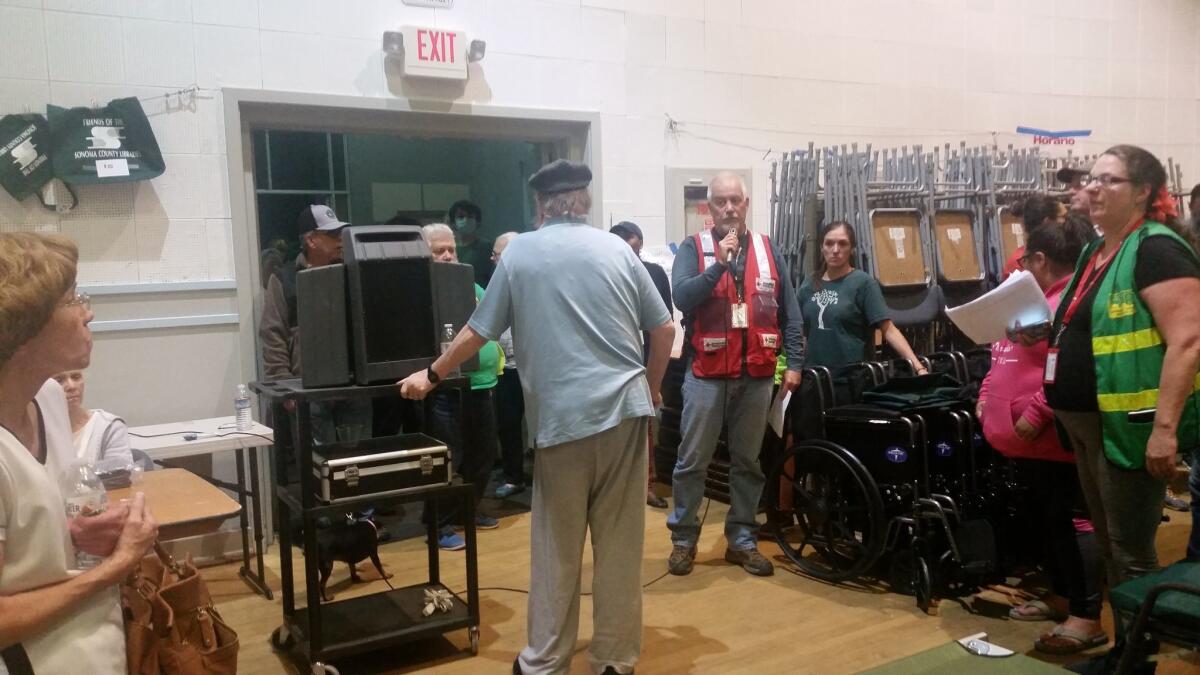
The Santa Rosa Veterans Memorial Building, which opened as an evacuation center around 2 a.m., was at its full capacity of 400 by early evening, Red Cross spokeswoman Sharon Jones said.
The building’s main auditorium had been used for a book fair over the weekend and staff had to scramble to stack up all the books and make room for evacuees.
One room was being used as a dining area, another had been set up for “fragile” evacuees who were in long-term care and needed to be watched, and a third as a “hospital” for those who had been evacuated from the nearby hospitals and nursing facility.
Joan Acquistapace, a school nurse who was evacuated from her home in Rincon Valley, had been at the center since 4 a.m.
She and other nurses and doctors were providing breathing treatments to patients whose asthma or COPD were being aggravated by smoke, monitoring blood pressure and glucose levels, and trying to get prescription refills for patients.
About 40 patients, most of them elderly, lay in cots lined in rows.
“They lost everything,” Acquistapace said.
Acquistapace said the last time a fire like this hit the Santa Rosa area was the 1960s, but even then the hospitals were OK.
“It is unusual to have to evacuate a hospital,”she said. “What can you do? You can’t very well keep the patients in the place that’s gonna burn down.”
When they saw flames, they grabbed their two kids, a stroller, a few diapers and fled
Tomas Landa, 37, his wife and two children were awakened in the house they rent in Santa Rosa about 1 a.m. by the sound of sirens and people shouting.
They could see smoke and flames from their house.
“It was very scary,” Landa said in Spanish. “We left the house running.”
They were in such a hurry they didn’t pack anything, just a stroller and a few diapers for their 2-month-old baby.
It took them an hour to drive less than a mile. Eventually they made it to a Costco parking lot, where they spent the night.
They tried to go back to their house in the morning to get some rest, but it was still too smoky. They picked up their important documents and came to the Sonoma County Fairgrounds.
For now, they’ve decided to stay put at the fairgrounds, where Landa played Monopoly with his son and his wife nursed their baby.
Curfew imposed overnight in Santa Rosa to prevent looting of empty homes
The city of Santa Rosa imposed a curfew starting at 6:45 p.m. Monday until sunrise Tuesday to prevent looting, an official said.
The evacuation zone is larger than the burn zone, so many houses are sitting empty, said acting Santa Rosa Police Chief Craig Schwartz.
“We have had a number of reports in the evacuation zone and the fire zone of people driving around and suspicious behavior,” Schwartz said.
He didn’t know if there had been any arrests.
Santa Rosa resident comes home to find every house on her cul-de-sac burned to the ground
Diana Wilder stood outside the pile of rubble that was once her home, clutching a concrete Buddha lawn ornament.
“I wanted to take something from the house with me,” said Wilder, 53, a homemaker.
She was afraid to root around in the wreckage. A safe and some flower pots survived but not much else.
Wilder and her husband had spent the night in a supermarket parking lot.
“I was praying all night, ‘Please, house, still be there,’” she said.
But her prayers were not answered.
She returned to find every house on her cul-de-sac burned to the ground, the charred remains of washers and dryers, barbecues and chimneys standing amid the ruins.
Wilder and her husband bought their house in 2000. The monthly payment was $1,200. She doubts she can find an apartment for that amount of money. She plans to live with her brother until she figures out what to do next.
Two blocks away, Bill Miken grabbed bucket after bucket of water to douse burning embers on the ruins of his next-door neighbor’s house.
On Monday afternoon, Miken’s home in the Coffey Park neighborhood of Santa Rosa was still standing, one of seven on a block of about 30 homes to survive the Tubbs fire.
The rest were smoldering heaps, many with gas lines still lighted up like torches. Miken, who has lived in the neighborhood for 30 years, said the neighborhood was full of young children. The neighbors whose house burned down had young twins and had moved there recently after losing their previous house in a fire, he said.
“I’m blessed that they saved my house,” said Miken, 58, who works for the county. “But I feel terrible that my neighbors weren’t so lucky.”
Survivors from 2015 fire show up to help latest evacuees
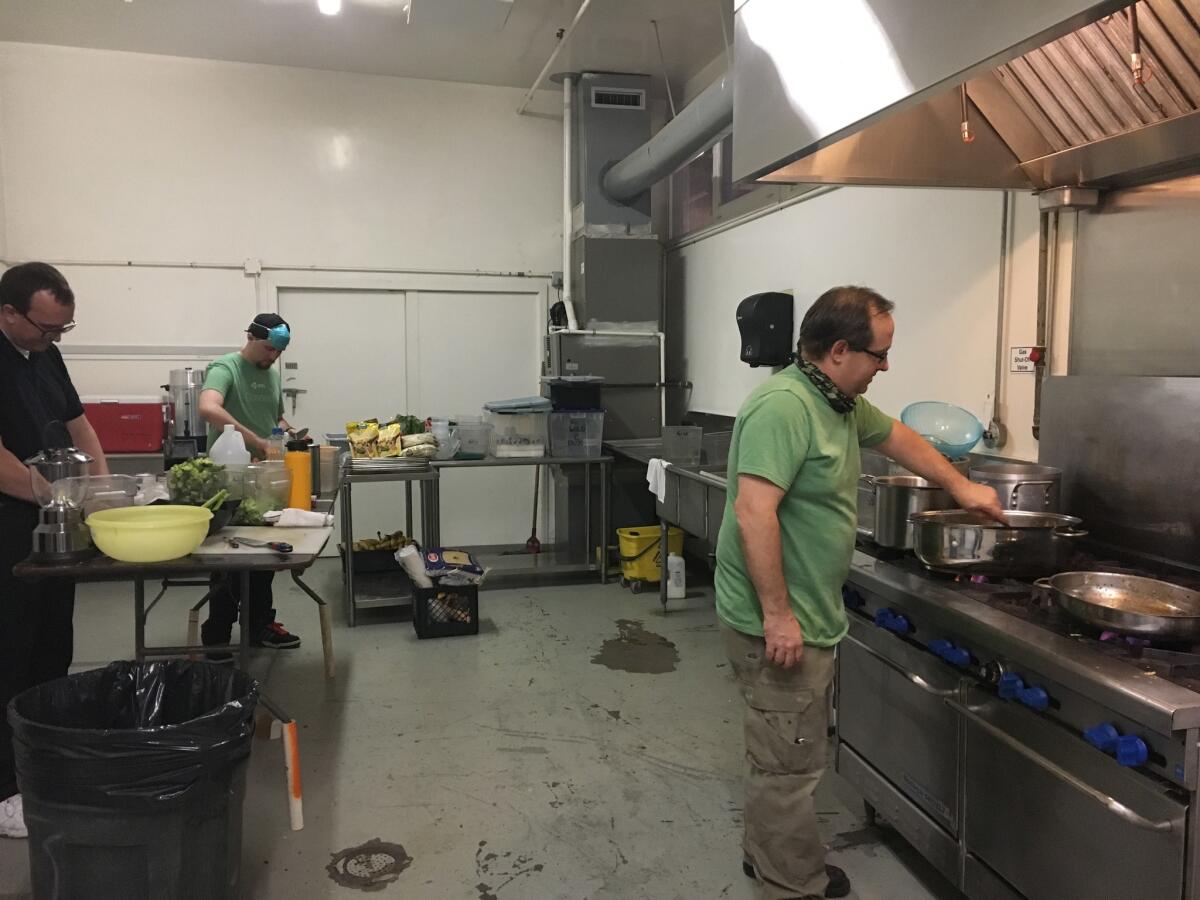
Two years ago, during the Valley fire, the Napa County Fairgrounds in Calistoga, Calif., was the scene of a tent city of evacuees, along with massage therapists, puppet artists, drum circles and food catered by the best of Napa Valley.
On Monday, smoke from the nearby Tubbs fire left the same evacuation shelter all but deserted. But it didn’t stop determined volunteers from showing up to give what they could.
Among them was Will Gross of Cobb.
“I lost my house in the Valley fire. These guys helped me out, so I thought I’d help them,” Gross said as he scooped watermelon and cantaloupe into a fruit salad in the shelter’s kitchen.
He worked beside two professional cooks – Ed Burke, the food service director for Calistoga joint unified schools, and Andy Wild, special events director for the fabled Culinary Institute of America, which has an academy near Napa.
It was not standard evacuation shelter fare. Wild had prepared a menu around two stews, “and some of our students are bringing up some seafood,” he said.
Changing winds send flames toward Napa County Fairgrounds, where some had sought shelter
A late-afternoon shift in the wind sent smoke from the nearby Tubbs fire into Calistoga, driving out many who sought shelter there at the Napa County Fairgrounds.
Fairground employee Monica Garibay, who manned the shelter registration desk, ran out of a carton of face-masks donated by a local medical facility.
But she said the generators were working and fairgrounds staff plan to serve dinner at 6 p.m. to anyone whose need for shelter outstripped with her desire for fresh air.
“We are ready! “ said Garibay, a nearly empty community room behind her. Somewhere in the dark of the room, a kitten mewled. Outside, shuttle bus drivers stood ready to take unknown passengers someplace else.
The afternoon sun weakly pierced the gray blanket of smoke, a blood red disk.
Aerial photo shows destroyed neighborhood
Google Earth imagery shows what a neighborhood near Coffey Park looked like before it was destroyed by today’s fire.
California Highway Patrol posted this aerial photo of the destroyed neighborhood in Santa Rosa.
Drag the slider to compare the images.
Some Anaheim Hills evacuees turn around after getting stuck on gridlocked roads
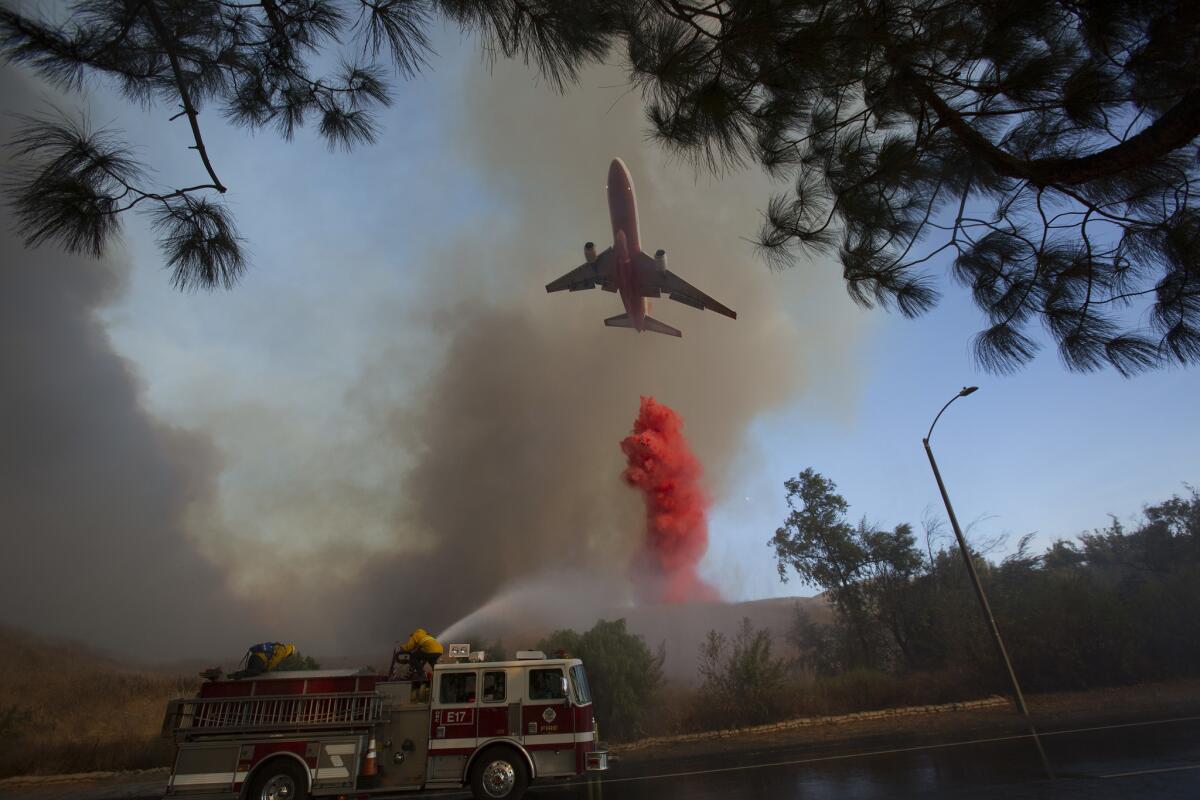
In Anaheim Hills, Joey Borgese, 33, and his neighbor Mike McCall, 49, climbed up a steep dusty hillside and surveyed the path the fire had carved through the rolling hills down the street from their homes.
Borgese had seen one home further up the hill smoldering earlier in the day.
“It wasn’t super green or anything, but it was covered in brush,” said Borgese, pointing to the now scorched hillside emitting wisps of smoke. Most homes appeared to be spared despite abutting the burned hill, where Borgese said he’d often walk his dogs. A pillar of dark smoke could be seen beyond the hill.
“It’s marching toward hundreds of homes now — thousands,” McCall said.
They had been ordered to evacuate earlier in the day, and they packed the essentials — medication and important documents for McCall, and his late grandfather’s watercolor paintings for Borgese. But the gridlock of traffic of evacuees was so bad that they turned around, and by late afternoon, the danger seemed to have passed.
From atop the hill, they watched fire helicopters draw water from a reservoir and head toward the plume of smoke.
The firestorm in Northern California has left at least 10 people dead, officials say
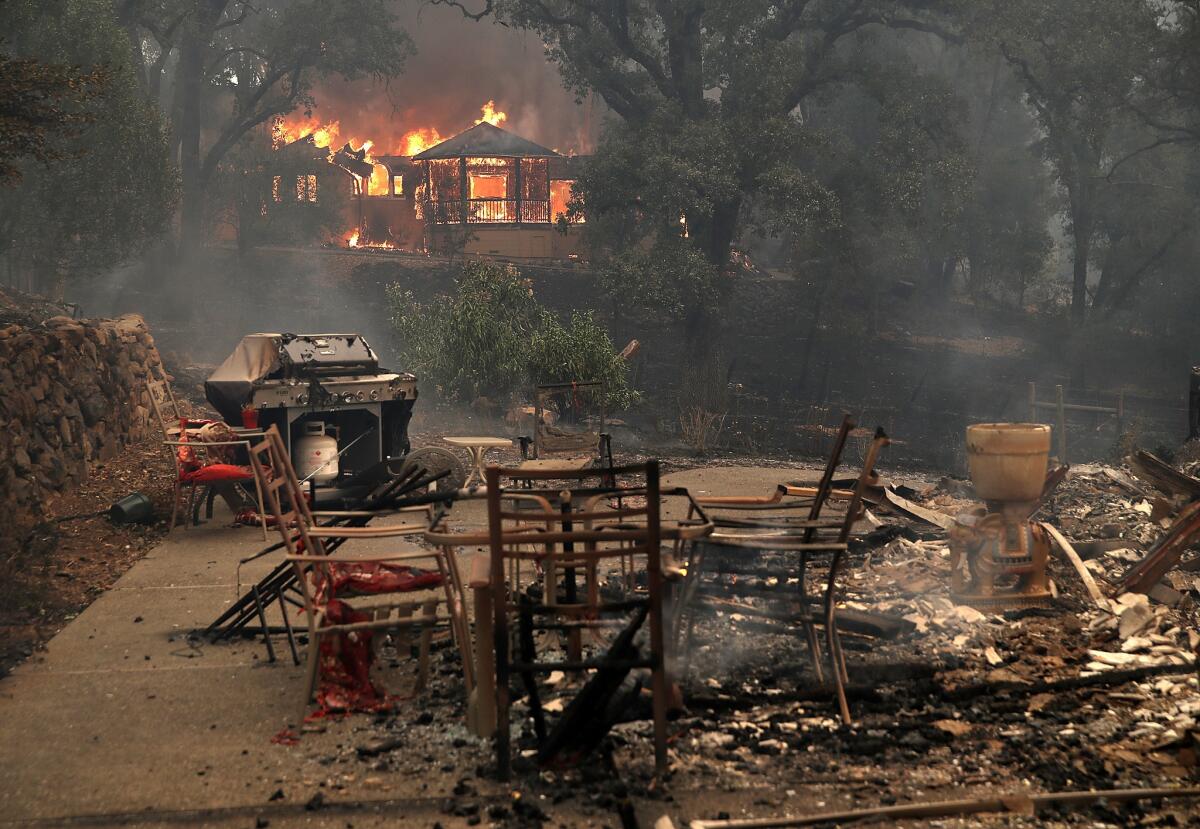
In Sonoma County, there have been seven fire-related deaths, said Misti Harris, community engagement liaison with the Sonoma County Sheriff’s Office. She had no further information about the fatalities.
In addition, two died in the Atlas fire in Napa County, according to CalFire. One person died as result of the Redwood Valley fire in Mendocino County.
Shocking images of entire neighborhoods leveled by fire in Santa Rosa
One of the hardest hit areas of Santa Rosa was the Coffey Park neighborhood, where the fire swept through and leaving the community devastated.
The fire leveled entire blocks of tract homes as it moved through Monday morning. Residents said they had to run for their lives.
Some flames still smolder in Santa Rosa
Lucy Cortez said she “woke up to the smell of burning smoke.” She thought it was a campfire. The police banged on her door in Santa Rosa.
Devastation in Fountaingrove as an assisted living facility burns down
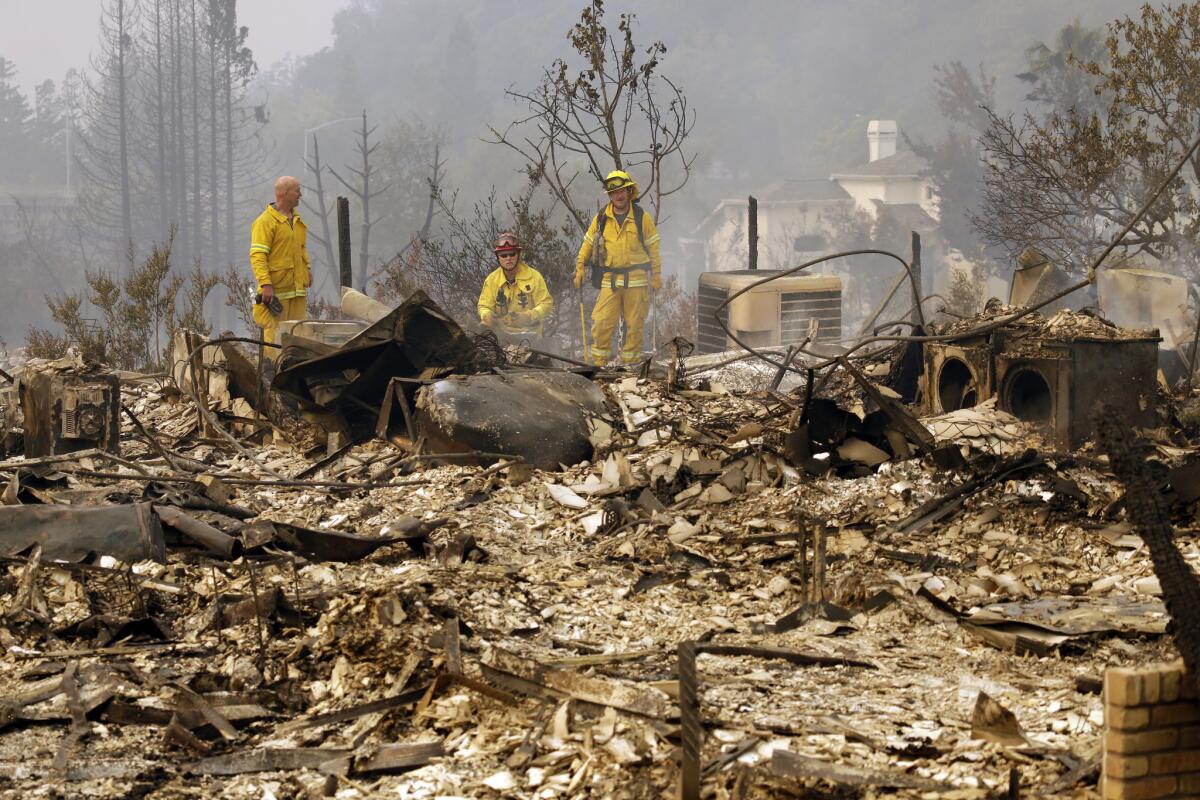
Santa Rosa’s Fountaingrove Lodge, an LGBT retirement community, was evacuated shortly after midnight, said executive director Robert May. The building is in Fountaingrove, a neighborhood that was hardest hit by the fire.
However, Villa Capri, an assisted living community center owned by the people who own the lodge, burned down, he said. Residents from all the continuing care facilities are being transported to Montecito or Berkeley.
“It was a harrowing experience,” May said of the evacuation. “The flames were right in front of us.”
He ticked off half a dozen structures that are believed to have burned in the fire, including the Santa Rosa Hilton.
Officials set up command centers in Napa and Sonoma counties to deal with widespread fires
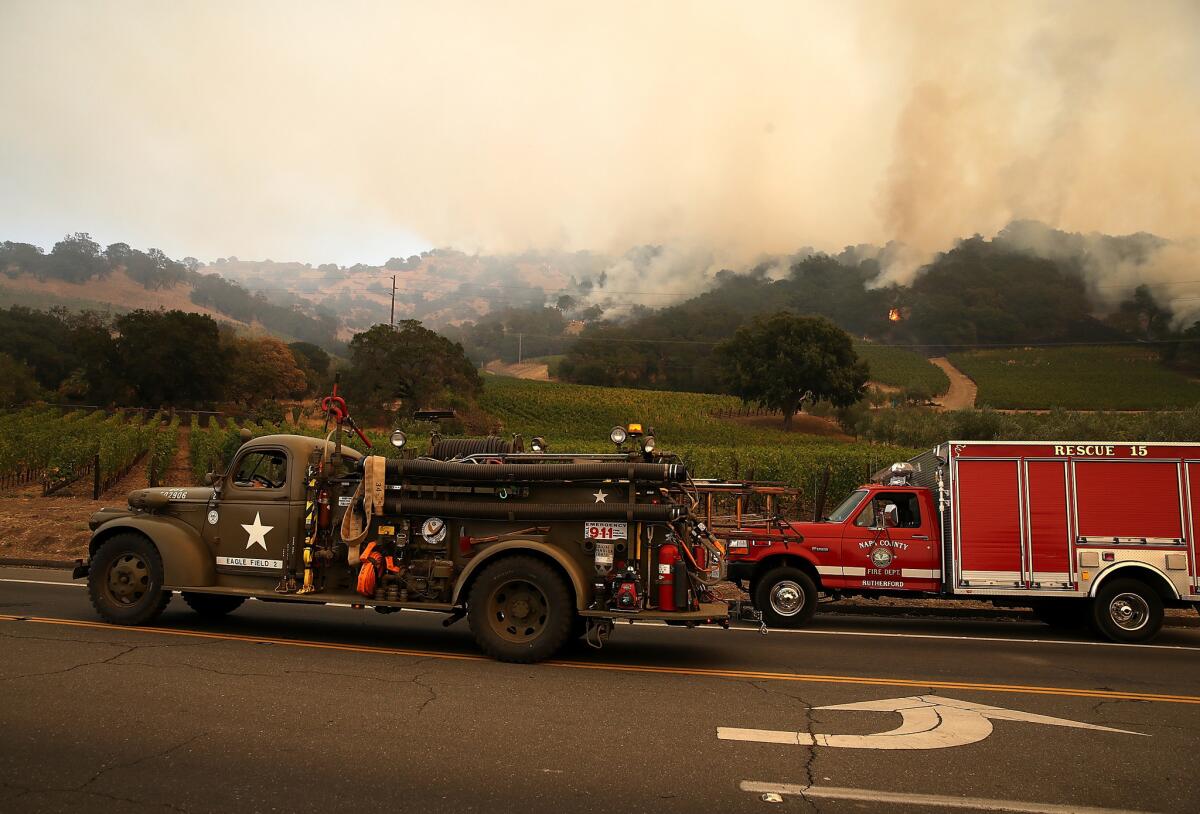
Emergency responders are setting up command centers to handle the multiple fires in Napa and Sonoma counties. The first wave of logistics crews are erecting a command center at the Napa County Expo Center, in Napa, for the Atlas fire.
The Tubbs fire command center is in Sonoma County, and state emergency planners might build a central command for wine country incidents.
Driving up to Napa from Riverside, Cal Fire spokesman Capt. Mike Smith said the team was waylaid by a fire in Kern County and now they understand there is one burning back home as well, creating the impression the whole state is beset by fire. “The wind won’t stop,” he said.
Canyon fire forces evacuation of over 1,000 homes
More than 1,000 homes have been evacuated as the Canyon fire rapidly spread to more than 2,000 acres Monday afternoon, burning at least six homes, fire officials said.
“Extreme winds” were causing spot fires well ahead of the fire line, frustrating the firefight, said Daron Wyatt, public information officer for Anaheim Fire and Rescue. The fire was 0% contained.
Officials said they had no information on what caused the fire, which broke out at the same spot as the earlier Canyon fire but was burning toward the west rather than east, consuming the unburnt brush left from the previous blaze.
Two hundred firefighters, 12 aircrafts and 10 helicopters battled the flames. One firefighter was being treated for minor injuries.
Anaheim Hills evacuees line up at gas stations before fleeing fire
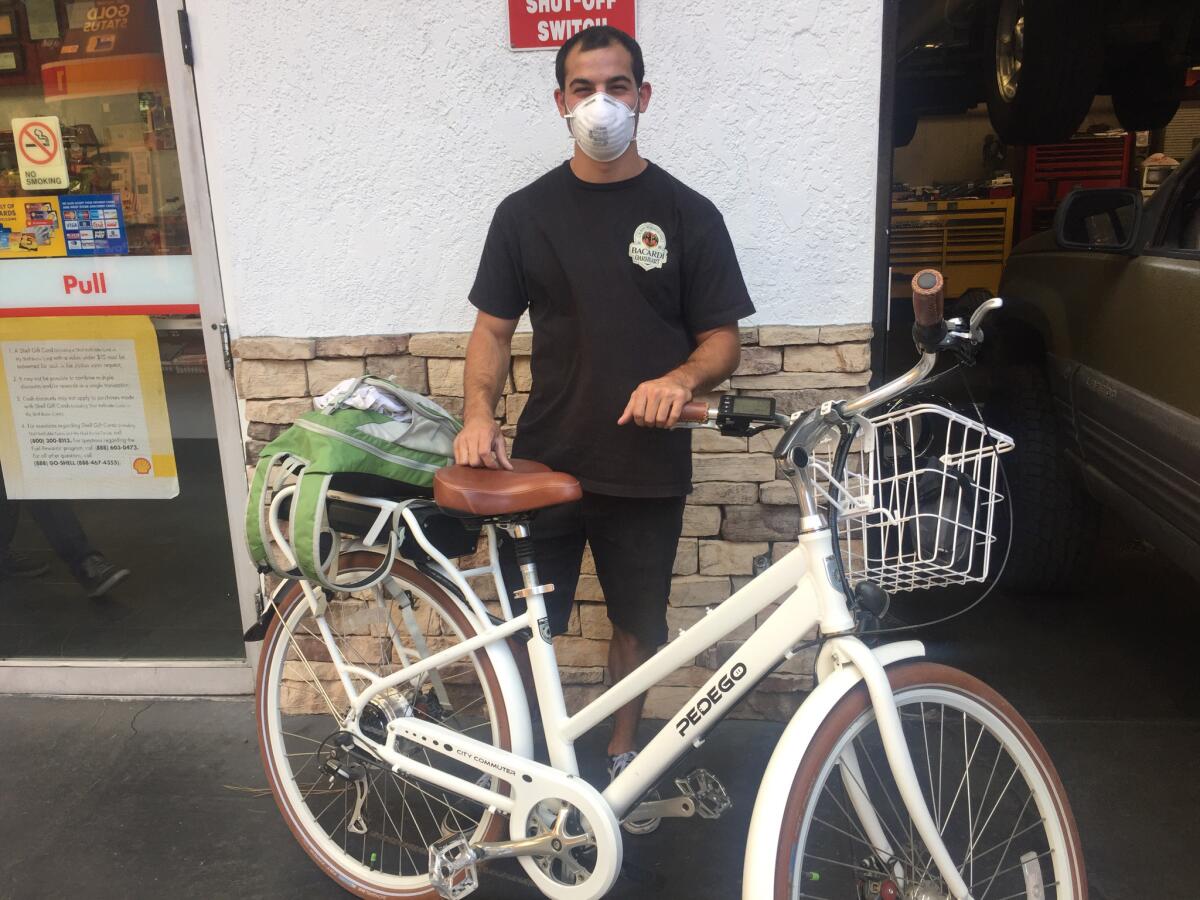
Devran Finestein, 21, showed up for his afternoon shift as a cashier at an Anaheim Hills gas station looking like he was in a war zone — a white T-shirt wrapped around his face, orange ski goggles and hydration backpack. He rode an electric bike.
He had just helped his father evacuate from his home in Anaheim Hills, loading financial documents, his father’s cat and his own snowboarding gear into his father’s car. He rode his bike through gridlocked streets jammed with evacuating residents, and past at least one sizable cul-de-sac house in flames. He passed out masks and bottles of water to those he saw on foot.
“I was just trying to help people,” he said. “Serrano was already getting it,” he said, referring to a nearby street where he saw houses burn.
At the gas station, he arrived to find dozens of cars lined up to fill their tanks before hitting the road. He tossed his co-worker a mask, and went inside to take his post.
Satellite images show fires popping up overnight

Satellite imagery from NOAA shows smoke from fires that started Sunday night in Northern California. Source: NOAA
Imagery from the National Oceanic and Atmospheric Administration’s GOES satellite shows fires in Northern California starting during the night.
As the sun came up, huge plumes of smoke were revealed.
High winds, low humidity and dry vegetation are perfect ingredients for a massive fire
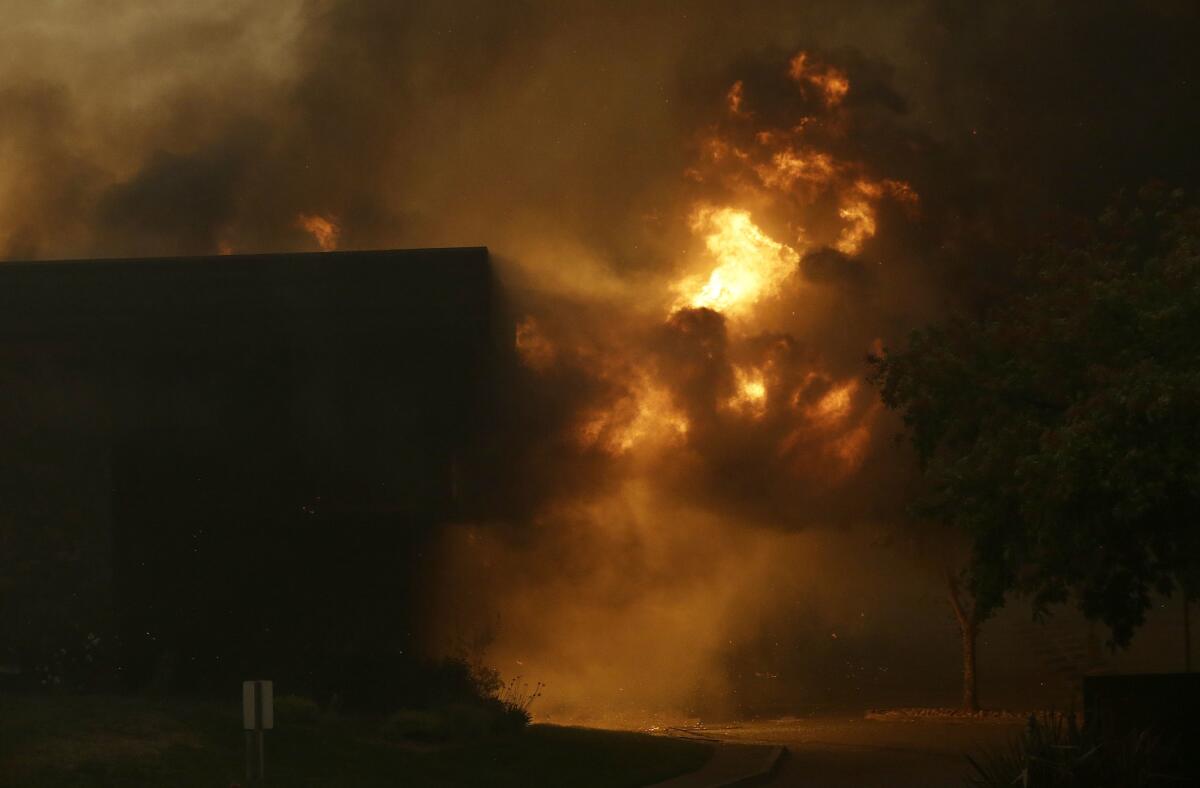
When winds pushed the Tubbs fire into Santa Rosa on Sunday night, it created “a firestorm within a city,” Cal Fire director Ken Pimlott said.
“It’s fair to say it’s been destroyed,” Pimlot said of Santa Rosa’s Fountaingrove neighborhood. Hotels, a big box store and a high school burned as the flames danced around the 101 Freeway.
“Late last night starting around 10 o’clock you had 50-60 mph winds that surfaced -- really across the whole northern half of the state,” he said. “Every spark is going to ignite.”
Northern California has seen its share of horrific wildfires – the state’s second deadliest is the October 1991 Tunnel fire in the Oakland Hills, when 25 people died. The Tunnel also ranks as the most destructive, charring 2,900 buildings.
But the combination of high winds, dried-up vegetation and low humidity driving flames into neighborhoods is more typical of Southern California.
“This is exactly what you would expect in the Southern California fall fire season,” Pimlott said.
The most damaging of the 14 blazes that flared overnight are the Tubbs and the Atlas. As of early Monday afternoon, each had grown to 25,000 acres, with no containment.
“Much of this is in grass-oak woodlands, which is why it’s spreading so quickly,” Pimlot said.
Despite a wet winter, he said vegetation still hasn’t recovered from California’s punishing drought, and at the end of the summer dry season, was ready to burn.
Firefighters are hopeful the winds will calm Monday afternoon. But red flag weather conditions will persist into Tuesday.
Pimlot said he expects the count of destroyed buildings to climb above 1,500.
In Anaheim, parents abandon their cars to pick up their children on foot
At a strip mall downhill from the evacuated neighborhoods in Anaheim, a line snaked out from the gas station. Seniors filed into buses from an adjacent senior living center, and ambulances carted residents away.
Families cast concerned glances up toward the smoke-covered hills, over which helicopters were ferrying water from a reservoir.
By the time Eric Schmidt, 48, had driven home from his work at Disney, police would not let him back into his neighborhood. Parents frantic to pick up their children at a nearby elementary school had taken to abandoning their cars and seeking their children on foot.
Schmidt’s wife, Marigold, left their home with only their three dogs, and his son Ethan walked from his high school; the family reunited at the strip mall parking lot with a dog bakery, a Thai restaurant and a spa.
“It came so fast you couldn’t even grab anything,” said Eric Schmidt, who said his family didn’t even have a change of clothes. A neighbor at the end of the cul-de-sac had told him the flames had reached his backyard. Houses lower on the hill were burning. For the moment though, he could see his home was safe from the doorbell cam app installed on his phone.
It was the second time he’s had to evacuate from a wildfire in 18 years of living in the neighborhood.
“With the Santa Ana winds, the fire just funnels out from the canyon,” he said.
The Atlas Peak fire: ‘You could hear the propane tanks exploding’
Brenda Burke, 55, was alerted about 11 p.m. to flee her cottage near the Atlas Peak fire, north of Napa. She left with smoke in the air and the ridge behind lit orange. She watched the progress of the fire from the top of the road.
“It was awful, it would move with the wind and you knew when a house went up because there would be a whole slew of smoke and you could hear the propane tanks exploding,” she said.
Monday morning she snuck back in, past fire-gutted houses, and smoking lawns to her drive. Ahead she saw flames “from what appeared to be the front of my house.”
With that question seemingly answered, Burke threw herself into her volunteer work Monday, helping an animal rescue organization. Sitting outside a Napa emergency shelter with a dog and cat pulled from a parked van, she managed a tight smile.
“I have what I’m wearing right now and my dog and my phone,” she said. “And I have friends and family.”
“I will be fine.”
Burke said she received no emergency notification even though she is signed up for the Napa County automatic alert system.
She found out about the fire only after a friend in Tahoe heard the area was burning.
A Red Cross volunteer at the Crosswalk Community Church shelter said some 250 people spent the night, sleeping on cots in a large community room. State and county emergency officials had not yet provided the shelter with fire maps and updates. Pet food supplies were still arriving by midday.
Cellphone service in north Napa was largely nonexistent and residents said power also was out from Napa on north. They flooded into the smoky, largely shuttered downtown to take advantage of the WiFi available at a Starbucks, one of the few businesses open. The smoke even there was so thick most cars had their headlights on.
5,000 buildings added in extended evacuation zones in Santa Rosa
An extended evacuation map from the city of Santa Rosa includes 5,000 more buildings than the last zone. The city ordered evacuations near Oakmont Golf Club.
About 20,000 buildings are now within the evacuation zones.
Windsor woman: ‘The whole town was on fire’
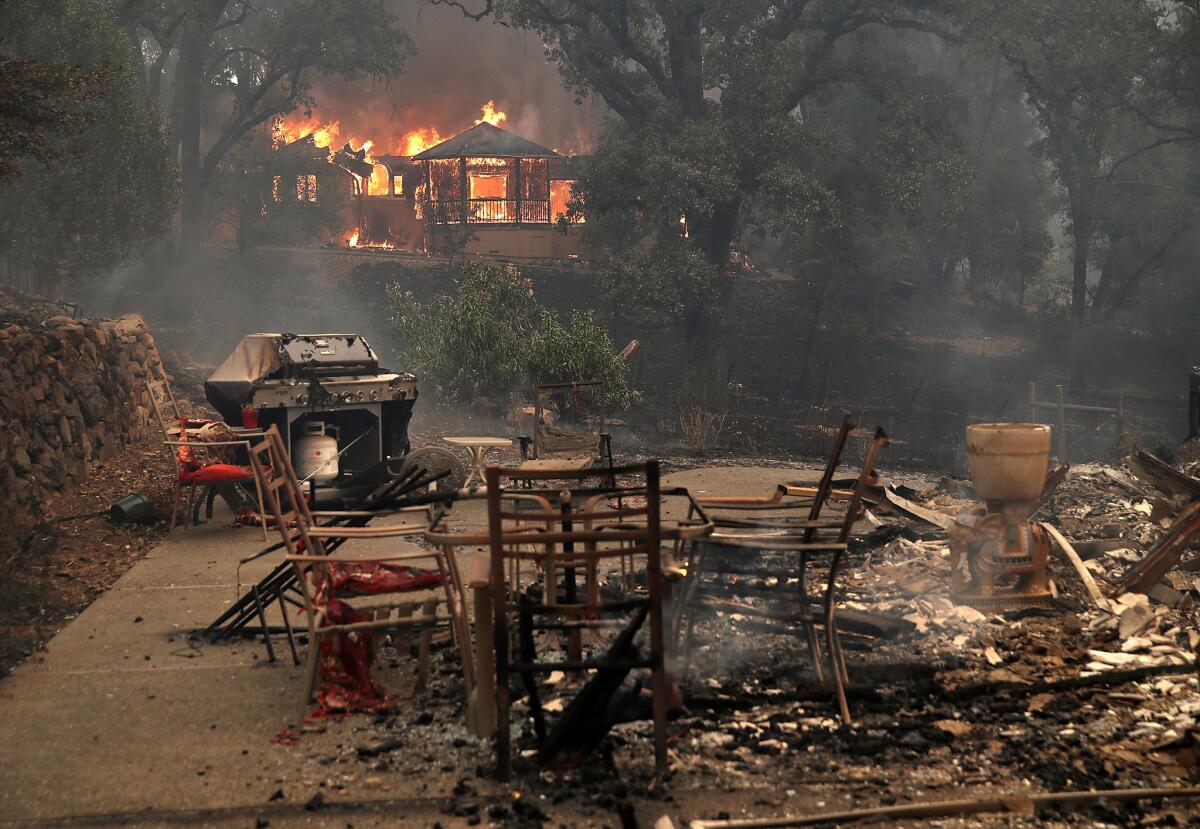
At around 2 a.m., the Sonoma County Sheriff’s Office ordered evacuations around Kay Drive and Mark West Station Road in Windsor. Jen Ancic, 31, fled with her two young sons and boyfriend.
As the family drove north on U.S. Highway 101, Ancic said she could see buildings and trees burning.
“The whole town was on fire,” she said. “It was crazy.”
A Santa Rosa native, Ancic said fires in the mountains are not uncommon, but that “nothing like this has happened in Santa Rosa.”
She was devastated to learn from online news reports that Coffey Park, where she’d played as a child and had recently held a birthday party for her son, had burned.
“There’s nothing left,” Ancic said.
Napa County official: ‘We are pretty good at this disaster stuff’
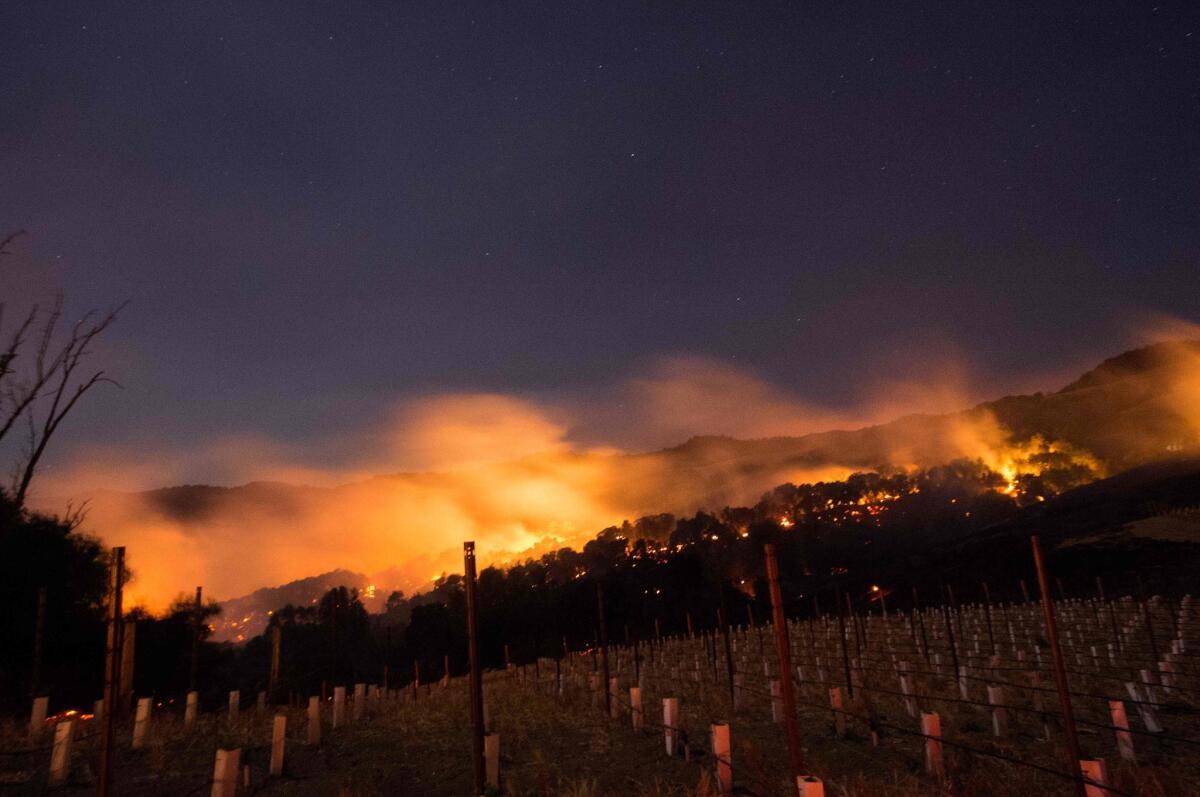
Belia Ramos, chairwoman of Napa County Board of Supervisors, said Monday that emergency crews are still focusing on evacuating homes in the paths of the wildfires and have yet to do a full damage assessment.
While there have been no reports of deaths or injures there, Ramos said she has seen several homes engulfed in flames in southwest Napa County.
“Right now we are still in evacuation and life safety modes,” Ramos said from the Emergency Operation Center. “We are starting to be able to execute on the fire itself by air support that is now coming in. And we have a number of strike teams coming to the area.”
Ramos said the county unfortunately has a lot of practice responding to disasters, most recently devastating floods in January.
She said Napa has also been hit by earthquakes and a number of wildfires that came close but did not burn over the ridge into the populated areas of Napa County.
“We are pretty good at this disaster stuff,” she said.
Ramos said she had been up all night concerned about the path of the Atlas fire.
Rangers pack up Jack London memorabilia to save artifacts from fire damage
State park rangers packed irreplaceable artifacts and began hosing down the roofs of historic buildings at Jack London State Historic Park in Sonoma County on Monday as the Nuns fire approached.
Rangers moved memorabilia including London’s original typewriter and his wife Charmian’s Steinway piano, said Tjiska Van Wyk, executive director of the park. Several homes on London Ranch Road, which leads into the park, burned to the ground, she said.
The park includes the cottage where London lived and wrote many stories and novels, the ruins of London’s dream home dubbed Wolf House, which burned to the ground before it was completed, and a house that Charmian lived in until her death in 1955. The couple’s gravesites are in the park as well.
‘Diablo winds’ fuel widespread destruction from fires in California wine country
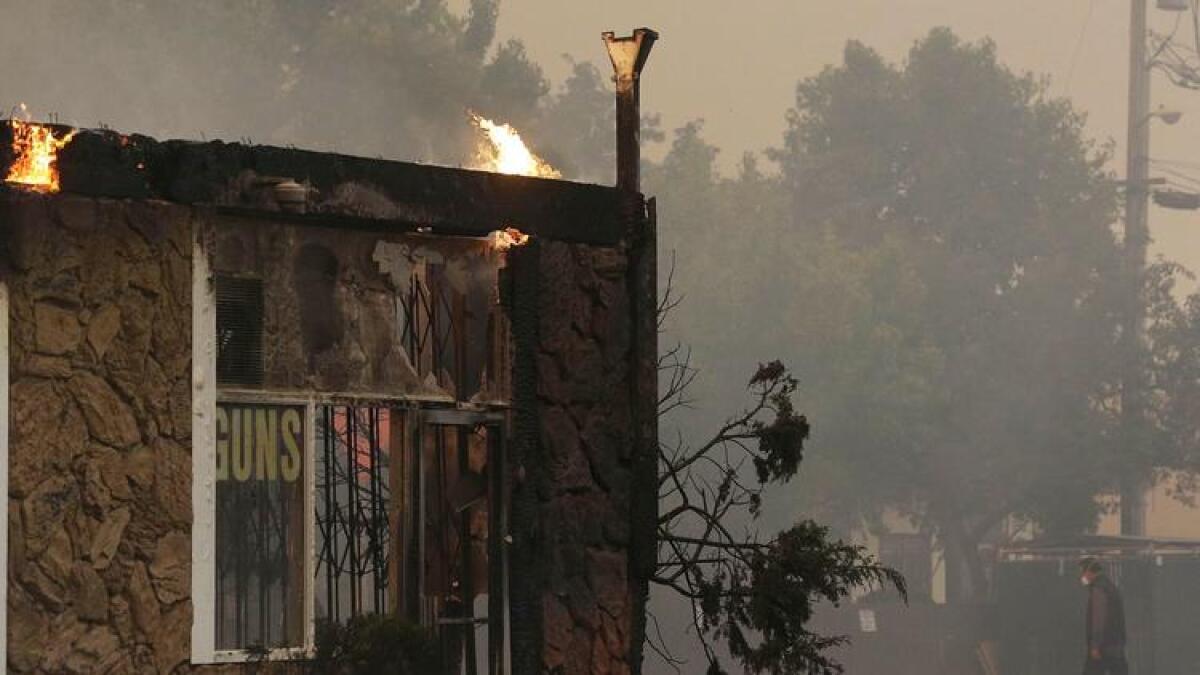
A key reason why the fires burning through Napa and Sonoma counties became so devastating is that the ignitions happened at the worst possible moment: when extremely dry conditions combined with so-called Diablo winds that fanned flames on the ridge tops with gusts as high as 70 mph.
It’s similar to the conditions that caused one of the most destructive fires in Northern California history, the October 1991 firestorm that struck the Oakland and Berkeley hills that killed 25 people and destroyed more than 3,300 single-family homes.
Tubbs fire forces two hospitals to evacuate
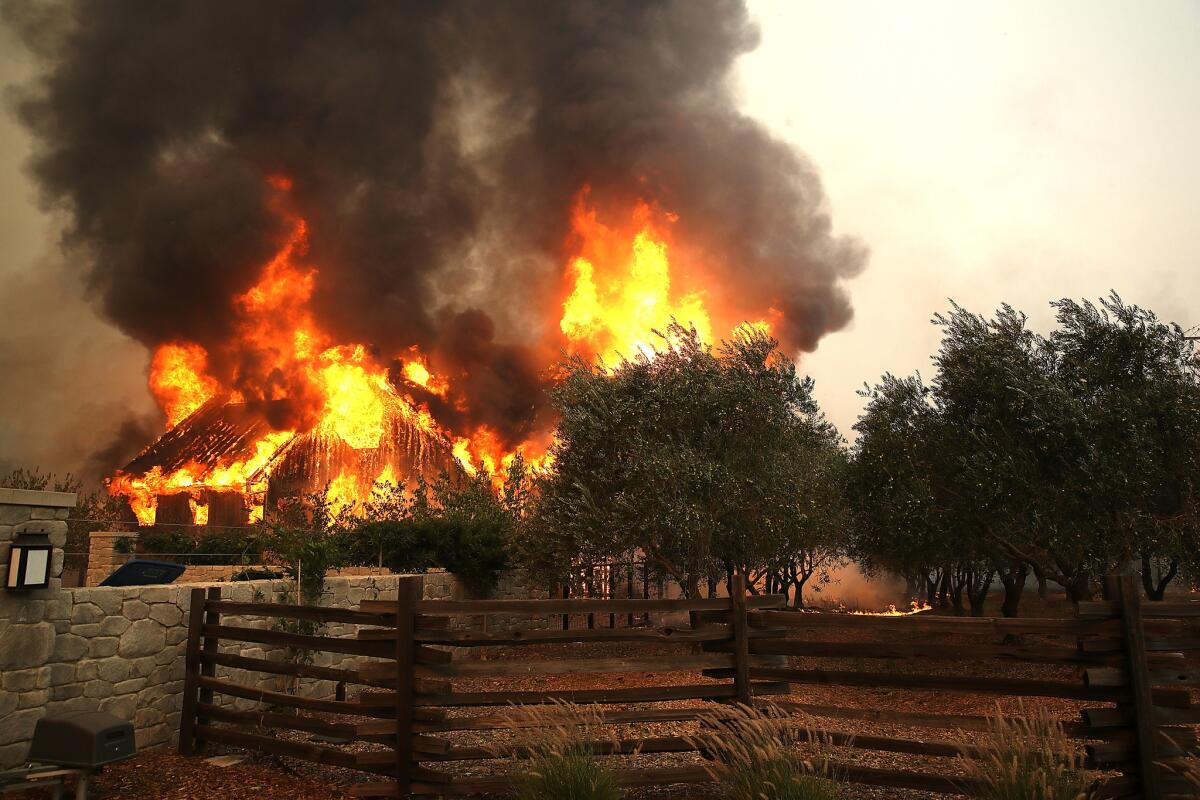
Two Santa Rosa hospitals — Sutter Santa Rosa Regional Hospital and Kaiser’s Santa Rosa Medical Center — were evacuated as the Tubbs fire spread from Calistoga into Sonoma County late Sunday and early Monday.
“Imagine there’s a wind-whipped fire ... burning department stores, burning box stores, impacting hospitals,” Cal Fire Director Ken Pimlott said during a press conference Monday.
“We have safely evacuated the Santa Rosa medical center due to fires burning in the area. Many patients were transported to Kaiser Permanente in San Rafael and other local hospitals,” Kaiser spokeswoman Jenny Mack said in an email. “All scheduled appointments and surgeries have been cancelled for the day in Santa Rosa and the Napa Medical Offices.”
Mack added later that the Santa Rosa and Napa medical offices were not damaged, and that families seeking information on Santa Rosa hospital patients could call 855-599-0033.
“All Sutter Santa Rosa Regional Hospital patients are safe and have been transferred to other area hospitals,” Sutter Health spokeswoman Liz Madison said in an email Monday morning. “Due to road closures, Sutter Santa Rosa Regional Hospital is inaccessible at this time.”
“We’ve had hospitals that have required evacuation ... all of those take significant amount of coordination and assets to ensure... that special needs populations and others that require special assistance are taken care of,” said Mark Ghilarducci, director of the governor’s Office of Emergency Services. “That will remain our priority.”
UPDATE:
1:28 p.m.: This article was updated with news about a hotline for locating Kaiser’s patients.
This article was originally published at 1:10 p.m.
More than 15,000 buildings in Santa Rosa’s evacuation zone
More than 15,000 structures are within an evacuation area released by the city of Santa Rosa on Monday morning.
Potential fire hot spots were recorded within the area and extended northeast from the city, according to data provided by the National Oceanic and Atmospheric Administration.
Fast-moving Anaheim Hills brush fire claims homes

Firefighters responded Monday morning to a brush fire that broke out in Anaheim Hills, prompting some mandatory evacations.
A fast-moving brush fire is threatening approximately 1,000 homes in the Anaheim Hills area and has scorched several structures, officials said.
The eastbound 91 Freeway in the area was closed, with small spot fires reported along the roadway.
‘The wind was blowing through the door’: one man’s experience of the fire in Napa
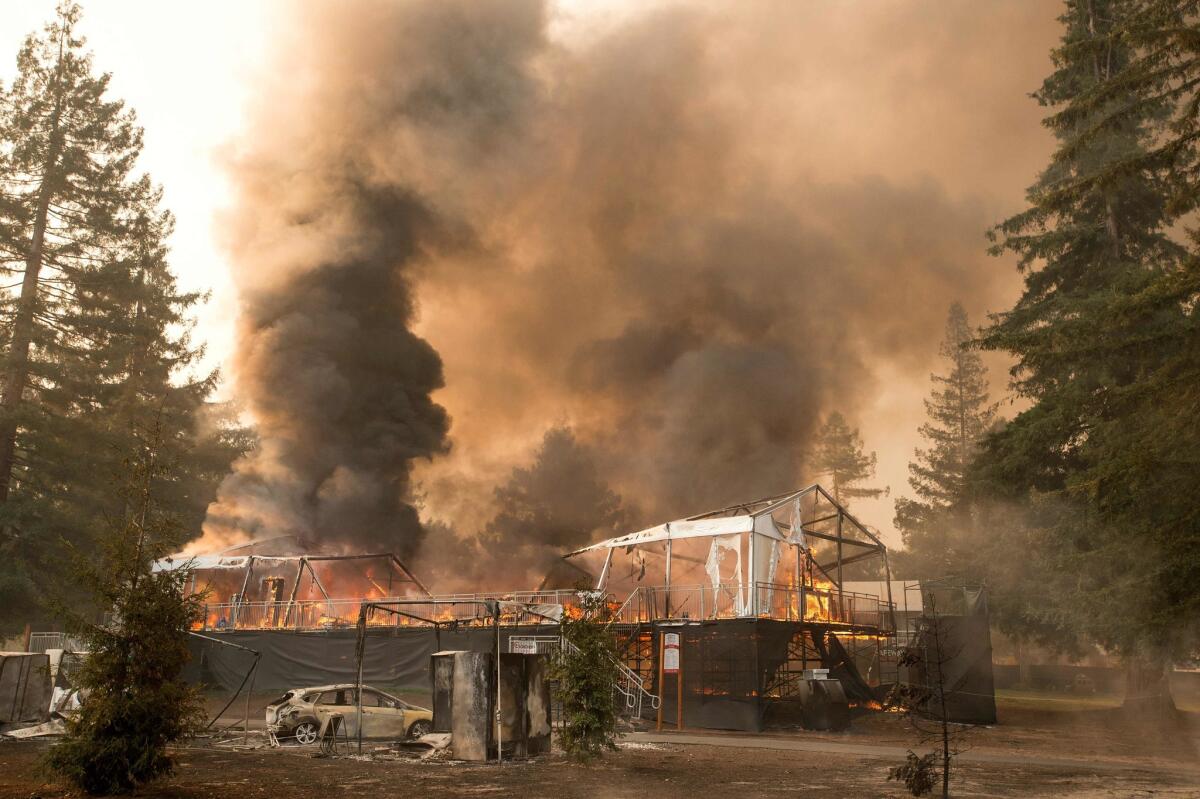
Scott Lambert, 76, paced the parking lot with dread in his mind.
He and his wife were awoken in their Creekside home at about 11 p.m. by someone driving the streets, honking a car horn and shouting to get out.
“I looked out and the sky was all orange, and the wind was blowing through the door,” Lambert said. “I just grabbed a few things and no valuables even. And my wife and I left.”
He drove to a friend’s winery and in the morning to a community church in Napa that is now serving as a Red Cross shelter.
Heavy smoke choked the air and bits of white ash lazily drifted down as Lambert worried aloud about what had become of the house his parents had bought 30 years ago and that he and his wife moved into. He trained in English literature but retired from the oil industry.
“I think the outlook is bad,” he said. He fell silent.
A moment later, he continued: “I had my library, thousands of carefully selected books. My grand piano. My music…”
Gusty winds fanned Sunday night’s flames, Cal Fire says
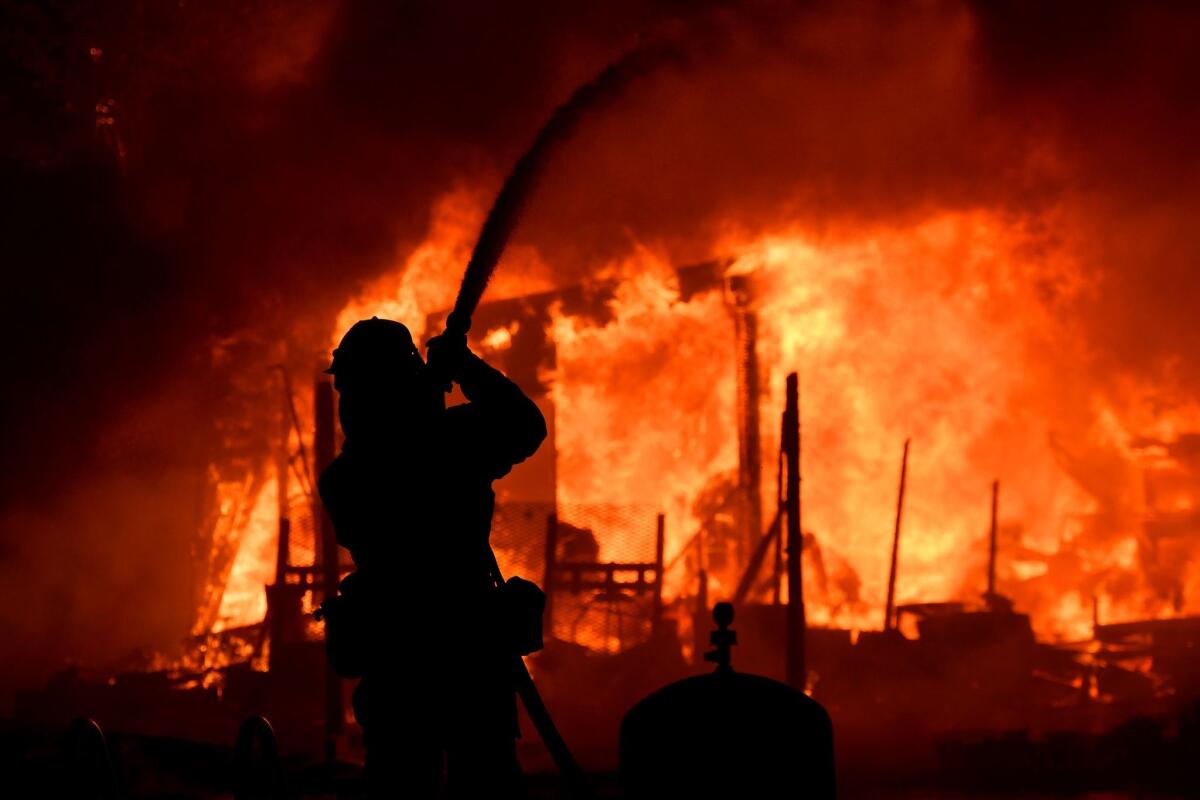
About 1,500 structures have been destroyed in more than 14 fires across eight Northern California counties, Cal Fire spokeswoman Janet Upton said Monday morning.
The fires began around 10 p.m. Sunday night, she said. “Some of the fires experienced winds in excess of 50 miles per hour.” The winds were not as fierce Monday but a red flag warning is still in place through Tuesday, she said.
“We estimate now the 14 combined fires have burned over 57,000 acres,” she said. The counties affected are Napa, Sonoma, Butte, Mendocino, Yuba, Nevada, Calaveras and Lake, she said.
No deaths have been reported, but “we do have reports of injuries and people that are unaccounted for,” she said.
The diablo winds, Northern California’s version of the Santa Ana winds that are common to Southern California, are hitting hard, Upton said.
“This time of year is when historically the state’s largest, most damaging and most deadly fires have occurred,” Upton said. “Critical fire conditions fanned by high wind” act as “a fuse for sparks,” she said.
A Santa Rosa wildlife preserve is trying to evacuate its animals
Santa Rosa wildlife preserve Safari West posted on its Facebook page Monday morning that “for the moment, it looks like our preserve and our animals are ok.”
“While the situation remains dynamic and very dangerous, we have received word that the Safari West Wildlife Preserve appears to have weathered the worst of this firestorm.”
The 400-acre property is known for its rhinos, giraffes, zebras and other animals. Guests also can stay in tents on site.
Marie Martinez, conservation and outreach manager at Safari West, said in an interview Monday morning that staff and guests fled the facility Sunday night. Staff were able to take some birds and a tortoise with them, she said.
The area around the zoo is closed off because of the fire, said Erin Harrison, director of marketing and communications at Oakland Zoo.
That zoo is trying to coordinate evacuation of the animals at Safari West, but the fire is making access difficult.
“We’re trying to find out if we can get up there,” Harrison said.
‘That is probably all gone’: A Santa Rosa rancher describes fleeing his vineyard
Late Sunday night, Ken Moholt-Siebert noticed the smell of the smoke from his Santa Rosa vineyard just off Highway 101.
It was not until midnight that he spotted the flames: a small red glow growing a couple of ridges to the east, off Fountaingrove Parkway.
He ran up the hill on his property to turn on a water pump to protect the ranch his family has raised sheep and grown grapes on for four generations.
Before the pump could get the water fully flowing, a small ember from the Tubbs fire landed nearby. With the wind picking up, the ember sparked a spot fire about 50 feet in diameter. Then it was 100 feet in diameter.
“There was no wind, then there would be a rush of wind and it would stop. Then there would be another gust from a different direction,” Moholt-Siebert, 51, said. “The flames wrapped around us.”
He ran for cover.
“I was just being pelted with all this smoke and embers,” he said. “It was just really fast.”
Moholt-Siebert retreated through a 150-year-old redwood barn on his property -- where his son’s wedding reception had been held in June. He jumped a fence back toward his house and fell to the ground to catch gulps of less smoke-contaminated air before reaching his home.
As he fled with his wife Melissa in their Ford sedans, the flames reached their vineyard full of Pinot Noir grapes and crept toward a 200-year-old oak tree on the property -- the namesake for the family winery, Ancient Oak Cellars.
As he drove through falling embers and smoke he thought about what he left behind. The sheep on his ranch, he thought, would be safe since they were on shortly cut wet grass. He left behind family mementos and furniture from his grandparents.
The property was dotted with old valley and black oaks as well as some California ash trees.
“That is probably all gone,” Moholt-Siebert said. “I have a feeling there is not going to be much left.”
Three weather conditions converged prior to wildfire outbreak, meteorologist says
Fire-friendly weather conditions converged prior to the outbreak of wildfires in Sonoma and Napa counties, according to a National Weather Service meteorologist.
One, called offshore flow, is similar to the Santa Ana winds – strong, extremely dry down-slope winds that occur mainly in the fall and originate inland in desert regions, said Matt Mehle.
“We also had really gusty winds and really warm temperatures,” Mehle said. “This time of year it does happen quite a bit. For the San Francisco Bay Area, our summer is late September to early October, that’s when we have our warmest and driest conditions.”
Gov. Brown declares a state of emergency in wine country
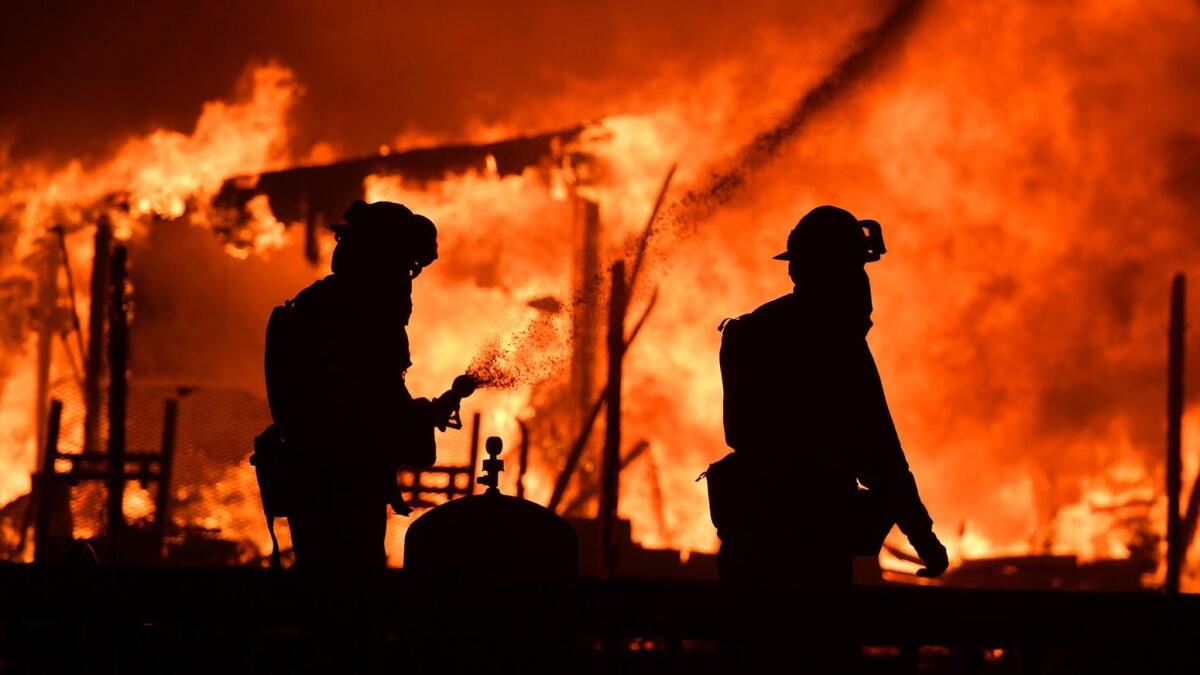
Gov. Jerry Brown declared a state of emergency as multiple fires ravaged Sonoma and Napa counties on Monday, forcing widespread evacuations across wine country and burning tens of thousands of acres.
Santa Rosa Hilton Hotel, Kmart engulfed in flames
The Tubbs fire that swept through the hills north of Santa Rosa overnight began claiming high-end resorts and businesses along Highway 101 early Monday, officials said.
San Francisco Chronicle reporter Kurtis Alexander captured video of structures on fire at the Hilton Hotel in Sonoma County, as well as flames engulfing a Kmart store on the other side of the highway, which has been shut down north of Santa Rosa.
Gov. Brown on wine country fires: ‘It’s not under control by any means’
Here are evacuation and shelter details for Santa Rosa
Evacuation orders have been issued for residents of the following Santa Rosa neighborhoods due to approaching fires:
- Cross Creek Road
- Sky Farm Drive
- Saint Andrews Drive
- All residences north of Fountaingrove Parkway
- Montecito Heights
- The Hopper Avenue Area west of Coffey Lane (Between Dennis Lane and Hopper Avenue to the north and south and Coffey Lane and Barnes Road to the east and west)
- All residences east of Fulton Road, between Piner Road and Guerneville Road
- Kaiser Permanente Hospital and Sutter Hospital are being evacuated
Shelters:
- Sonoma County Fairgrounds at 1350 Bennet Valley Road, Santa Rosa
- Finley Community Center at 2060 West College Ave., Santa Rosa (this shelter is at capacity)
- Santa Rosa Veterans Building at 1351 Maple Ave., Santa Rosa (this shelter is at capacity)
- Petaluma Community Center at 320 N. McDowell Blvd., Petaluma (this shelter is at capacity)
- Sebastopol Community Center at 390 Morris St., Sebastopol
- Cloverdale Citrus Fair at 1 Citrus Fair Drive, Cloverdale
- Sonoma Valley High School at 20000 Broadway, Sonoma
- Analy High School Gym at 6950 Analy Ave., Sebastopol
- Elsie Allen High School, 599 Bellevue Ave., Santa Rosa
- Healdsburg Community Center at 1157 Healdsburg Ave., Healdsburg
- Church of Christ at 370 Sonoma Mountain Parkway, Petaluma
- New Life Church at 1310 Clegg St., Petaluma
- Cook Middle School at 2480 Sebastopol Road, Santa Rosa
- Guerneville Veterans Hall at 16255 1st St., Guerneville
- Monte Rio School at 20700 Foothill Drive, Monte Rio
- Windsor High School at 8695 Windsor Road, Windsor
- Casa Grande High School at 3333 Casa Grande Road, Petaluma
Santa Rosa under siege as huge fire carves path of destruction
Santa Rosa is under siege from a wildfire that quickly burned 20,000 acres and has residents running for their lives.
The Tubbs fire broke out near the northern end of the city, forcing the evacuations of hundreds of homes as well as two hospitals. Witnesses said homes and businesses have burned but it was not clear how many.
Residents say the fire jumped U.S. 101 north of downtown Santa Rosa, burning a mobile home park and a hotel. Highway 101 and Highway 12 were closed.
